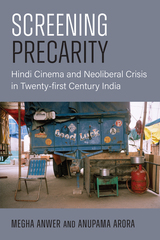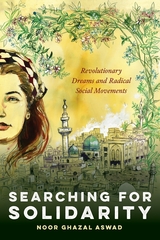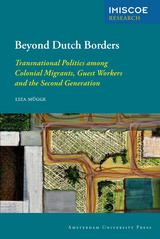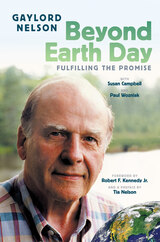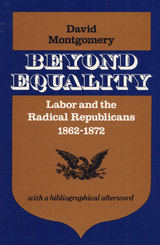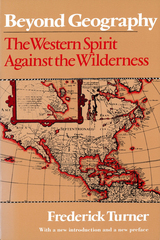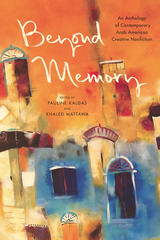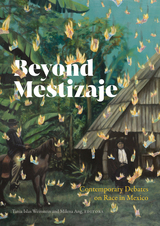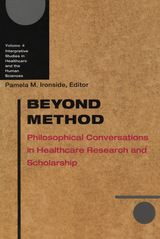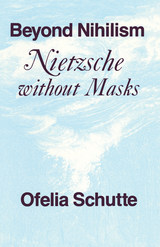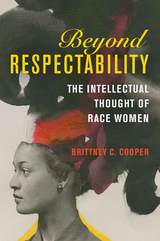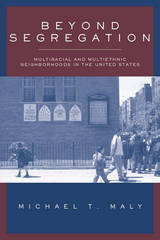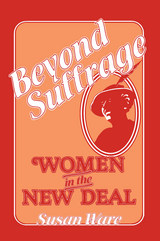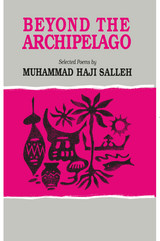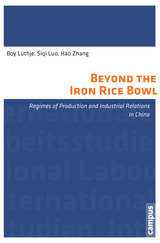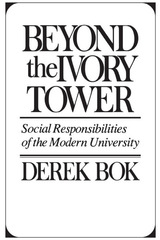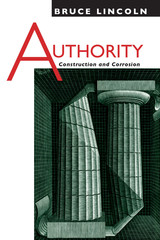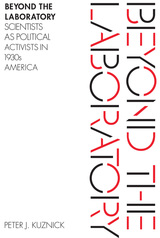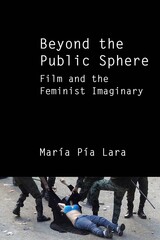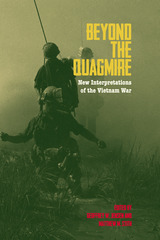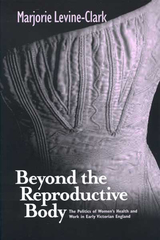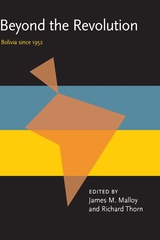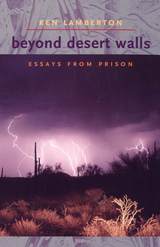 Beyond Desert Walls: Essays from Prison
Ken Lamberton
University of Arizona Press, 2005 “From the upper bunk where I write, a narrow window allows me a southern exposure of the desert beyond this prison. Saguaro cacti, residents here long before this rude concrete pueblo, fill the upper part of my frame. If I could open the window and reach out across the razed ground, sand traps, and shining perimeter fence, I might touch their fluted sides, their glaucous and waxen skins.”
For some people, even prison cannot shut out the natural world.
A teacher and family man incarcerated in Arizona State Prison—the result of a transgression that would cost him a dozen years of his life—Ken Lamberton can see beyond his desert walls. In essays that focus on the natural history of the region and on his own personal experiences with desert places, the author of the Burroughs Medal-winning book Wilderness and Razor Wire takes readers along as he revisits the Southwest he knew when he was free, and as he makes an inner journey toward self-awareness. Whether considering the seemingly eternal cacti or the desolate beauty of the Pinacate, he draws on sharp powers of observation to re-create what lies beyond his six-by-eight cell and to contemplate the thoughts that haunt his mind as tenaciously as the kissing bugs that haunt his sleep.
Ranging from prehistoric ruins on the Colorado Plateau to the shores of the Sea of Cortez, these writings were begun before Wilderness and Razor Wire and serve as a prequel to it. They seamlessly interweave natural and personal history as Lamberton explores caves, canyons, and dry ponds, evoking the mysteries and rhythms of desert life that elude even the most careful observers. He offers new ways of thinking about how we relate to the natural world, and about the links between those relationships and the ones we forge with other people. With the assurance of a gifted writer, he seeks to make sense of his own place in life, crafting words to come to terms with an insanity of his own making, to look inside himself and understand his passions and flaws.
Whether considering rattlesnakes of the hellish summer desert or the fellow inmates of his own personal hell, Lamberton finds meaningful connections—to his crime and his place, to the people who remained in his life and those who didn’t. But what he reveals in Beyond Desert Walls ultimately arises from language itself: a deep, and perhaps even frightening, understanding of a singular human nature.
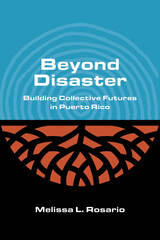 Beyond Disaster: Building Collective Futures in Puerto Rico
Melissa L. Rosario
Northwestern University Press, 2025 An alternative view of Puerto Rico’s past, present, and future How do we map the pathways to liberation where we have been taught to see only trauma, suffering, and lack? Melissa L. Rosario offers an alternative view of Puerto Rico, America’s oldest colony, removing readers from the framework of crisis to consider the deeper legacies of its current impasse. Beyond Disaster: Building Collective Futures in Puerto Rico is an intimate portrait, weaving insights from the author’s own life, research, and organizing work as a scholar in the diaspora who rematriated. Rosario bridges the genres of social history and memoir to unsettle the meaning of resistance and freedom, underscoring the deep wounds of colonialism while still uplifting the profound possibilities of embodied alternatives. Beyond Disaster critiques the framework of debt and crisis by examining the psychological, emotional, and spiritual effects of colonialism. Rosario highlights key examples of organizing efforts to defend land and education against total enclosure, protecting life amid loss. This book offers a series of microhistories, vignettes, and prose poetry to foreground the daily practices necessary to anchor the ecological and political landscapes of our collective future.
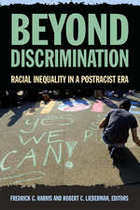 Beyond Discrimination: Racial Inequality in a Post-Racist Era
Fredrick C. Harris
Russell Sage Foundation, 2013 Nearly a half century after the civil rights movement, racial inequality remains a defining feature of American life. Along a wide range of social and economic dimensions, African Americans consistently lag behind whites. This troubling divide has persisted even as many of the obvious barriers to equality, such as state-sanctioned segregation and overt racial hostility, have markedly declined. How then can we explain the stubborn persistence of racial inequality? In Beyond Discrimination: Racial Inequality in a Post-Racist Era, a diverse group of scholars provides a more precise understanding of when and how racial inequality can occur without its most common antecedents, prejudice and discrimination. Beyond Discrimination focuses on the often hidden political, economic and historical mechanisms that now sustain the black-white divide in America. The first set of chapters examines the historical legacies that have shaped contemporary race relations. Desmond King reviews the civil rights movement to pinpoint why racial inequality became an especially salient issue in American politics. He argues that while the civil rights protests led the federal government to enforce certain political rights, such as the right to vote, addressing racial inequities in housing, education, and income never became a national priority. The volume then considers the impact of racial attitudes in American society and institutions. Phillip Goff outlines promising new collaborations between police departments and social scientists that will improve the measurement of racial bias in policing. The book finally focuses on the structural processes that perpetuate racial inequality. Devin Fergus discusses an obscure set of tax and insurance policies that, without being overtly racially drawn, penalizes residents of minority neighborhoods and imposes an economic handicap on poor blacks and Latinos. Naa Oyo Kwate shows how apparently neutral and apolitical market forces concentrate fast food and alcohol advertising in minority urban neighborhoods to the detriment of the health of the community. As it addresses the most pressing arenas of racial inequality, from education and employment to criminal justice and health, Beyond Discrimination exposes the unequal consequences of the ordinary workings of American society. It offers promising pathways for future research on the growing complexity of race relations in the United States.
Beyond Displacement: Campesinos, Refugees, and Collective Action in the Salvadoran Civil War
Molly Todd
University of Wisconsin Press, 2010 During the civil war that wracked El Salvador from the mid-1970s to the early 1990s, the Salvadoran military tried to stamp out dissidence and insurgency through an aggressive campaign of crop-burning, kidnapping, rape, killing, torture, and gruesome bodily mutilations. Even as human rights violations drew world attention, repression and war displaced more than a quarter of El Salvador’s population, both inside the country and beyond its borders. Beyond Displacement examines how the peasant campesinos of war-torn northern El Salvador responded to violence by taking to the hills. Molly Todd demonstrates that their flight was not hasty and chaotic, but was a deliberate strategy that grew out of a longer history of collective organization, mobilization, and self-defense.
Beyond Dutch Borders: Transnational Politics among Colonial Migrants, Guest Workers and the Second Generation
Liza Mügge
Amsterdam University Press, 2011 Migrants often remain loyal to their former homelands and stay active in the politics there— despite widespread criticism of these ties in their host countries. Combining extensive fieldwork with quantitative data, Beyond Dutch Borders compares how transnational political involvement among guest workers from Turkey and postcolonial migrants from Surinam living in the Netherlands has evolved during the past fifty years. The author explores the dynamics and influence of such dual affiliations and finds that migrants’ border-crossing loyalties and engagement actually heighten their political integration into their host countries.
Beyond Earth Day: Fulfilling the Promise
Gaylord Nelson; With Susan Campbell and Paul Wozniak; Foreword by Robert F. Kennedy Jr.; Preface by Tia Nelson
University of Wisconsin Press, 2002 Gaylord Nelson’s legacy is known and respected throughout the world. He was a founding father of the modern environmental movement and creator of one of the most influential public awareness campaigns ever undertaken on behalf of global environmental stewardship: Earth Day.
Nelson died in 2005, but his message in this book is still timely and urgent, delivered with the same eloquence with which he articulated the nation’s environmental ills throughout the decades. He details the planet’s most critical concerns—from species and habitat losses to global climate change and population growth. In outlining strategies for planetary health, Nelson inspires citizens to reassert environmentalism as a national priority. Included in this reprint is a new preface by Gaylord Nelson’s daughter, Tia Nelson.
 Beyond Economic Man: A New Foundation for Microeconomics
Harvey Leibenstein
Harvard University Press Harvey Leibenstein has written a major new book in microeconomic theory. It is a sophisticated reorientation of microtheory that breaks away from the conventional, highly refined neoclassical theory, which in turn is in the direct line of descent from Adam Smith's The Wealth of Nations (1776). The author accomplishes this feat by introducing modern psychological concepts to microtheory, by using individuals instead of collections of individuals as his basic units of study, and by suggesting that relating the theory to the concept of effort (an X-efficiency factor) will provide the most significant results.
His innovative central variable, effort, is an X factor, he reminds us, because of its relatively unknown character in affecting output. Basically this leads to a new mode of thinking about economic problems in which the optimizing assumption of standard theory becomes a special extreme case.
The X-efficiency factors—motivation, effort, and so on—allow for a restatement of microtheory. and for new applications and new conclusions: (1) businesses do not minimize costs or maximize profits; (2) actual productivity is very far from optimal even under conditions that approximate competition; (3) current modes of regulating monopolistic industries are apt to be inefficient at the expense of the consumer.
Lebenstein’s new theory also has practical applications for the problems faced by management of businesses in the private or public sector, and in the fiscal affairs of the nation. When the theory is applied to inflation — one salient and timely example — it leads to results implying that inflation may be a cause of unemployment rather than an influence that reduces unemployment.
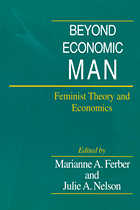 Beyond Economic Man: Feminist Theory and Economics
Edited by Marianne A. Ferber and Julie A. Nelson
University of Chicago Press, 1993 This is the first book to examine the central tenets of economics from a feminist point of view. In these original essays, the authors suggest that the discipline of economics could be improved by freeing itself from masculine biases.
Beyond Economic Man raises questions about the discipline not because economics is too objective but because it is not objective enough. The contributors—nine economists, a sociologist, and a philosopher—discuss the extent to which gender has influenced both the range of subjects economists have studied and the way in which scholars have conducted their studies. They investigate, for example, how masculine concerns underlie economists' concentration on market as opposed to household activities and their emphasis on individual choice to the exclusion of social constraints on choice. This focus on masculine interests, the contributors contend, has biased the definition and boundaries of the discipline, its central assumptions, and its preferred rhetoric and methods. However, the aim of this book is not to reject current economic practices, but to broaden them, permitting a fuller understanding of economic phenomena.
These essays examine current economic practices in the light of a feminist understanding of gender differences as socially constructed rather than based on essential male and female characteristics. The authors use this concept of gender, along with feminist readings of rhetoric and the history of science, as well as postmodernist theory and personal experience as economists, to analyze the boundaries, assumptions, and methods of neoclassical, socialist, and institutionalist economics.
The contributors are Rebecca M. Blank, Paula England, Marianne A. Ferber, Nancy Folbre, Ann L. Jennings, Helen E. Longino, Donald N. McCloskey, Julie A. Nelson, Robert M. Solow, Diana Strassmann, and Rhonda M. Williams.
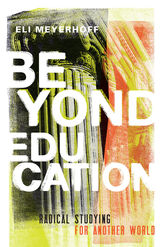 Beyond Education: Radical Studying for Another World
Eli Meyerhoff
University of Minnesota Press, 2019 A bold call to deromanticize education and reframe universities as terrains of struggle between alternative modes of studying and world-making
Higher education is at an impasse. Black Lives Matter and #MeToo show that racism and sexism remain pervasive on campus, while student and faculty movements fight to reverse increased tuition, student debt, corporatization, and adjunctification. Commentators typically frame these issues as crises for an otherwise optimal mode of intellectual and professional development. In Beyond Education, Eli Meyerhoff instead sees this impasse as inherent to universities, as sites of intersecting political struggles over resources for studying.
Meyerhoff argues that the predominant mode of study, education, is only one among many alternatives and that it must be deromanticized in order to recognize it as a colonial-capitalist institution. He traces how key elements of education—the vertical trajectory of individualized development, its role in preparing people to participate in governance through a pedagogical mode of accounting, and dichotomous figures of educational waste (the “dropout”) and value (the “graduate”)—emerged from histories of struggles in opposition to alternative modes of study bound up with different modes of world-making. Through interviews with participants in contemporary university struggles and embedded research with an anarchist free university, Beyond Education paves new avenues for achieving the aims of an “alter-university” movement to put novel modes of study into practice. Taking inspiration from Black Lives Matter, Occupy Wall Street, and Indigenous resurgence projects, it charts a new course for movements within, against, and beyond the university as we know it.
Beyond Egotism: The Fiction of James Joyce, Virginia Woolf, and D. H. Lawrence
Robert Kiely
Harvard University Press, 1980 Here is a comprehensive critique of the major work of three masters of the modern novel. It provides both concepts and examples for a coherent theory of Modernist fiction. Robert Kiely takes three writers generally thought to be very different and shows, by analysis of narrative strategies and structures, how they share a quest for a morally balanced perception of life. Joyce, Woolf, and Lawrence have often been accused (and accused one another) of authorial egotism and arrogance. Exploring their treatment of fundamental relationships—artist and nature, mother and child, marriage, friendship, and actor and audience—Kiely finds in all three writers a reaching beyond the individual toward a definition of the value of human interdependence. This very readable book will well serve everyone interested in the modern novel.
Beyond Equality: Labor and the Radical Republicans, 1862-1872
David Montgomery
University of Illinois Press, 1981 "For anyone who believes that there was no important labor movement before Roosevelt, or before Gompers, or before the Knights of Labor, this well-documented work should prove a shocker. And for those who look to the past for enlightenment to guide us through our troubled tomorrows, this book is a reservoir of historic information and insights." -- New Leader
"Beyond Equality is a masterpiece. . . . A book of bold and brilliant originality, it is now shaping the perspective of a new generation of graduate students." -- David Brion Davis, author of The Problem of Slavery in Western Culture
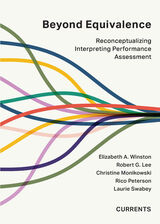 Beyond Equivalence: Reconceptualizing Interpreting Performance Assessment
Elizabeth A. Winston
Gallaudet University Press, 2023 There is a longstanding need for valid, reliable measurements of interpreting competence. Although rubrics and checklists are commonly used in both academic and employment settings, a review of available rubrics indicates that many do not focus on interpreting performance. Traditional metrics for sign language interpreting often conflate language proficiency with interpreting proficiency. Conflating fundamental aspects of language in use—vocabulary, grammar, and prosody— with fundamental aspects of interpretation—content, intent, and monitoring—compromises the valid assessment of interpreting proficiency. Beyond Equivalence: Reconceptualizing Interpreting Performance Assessment argues for a shift toward more nuanced and evidence-based conceptualizations of interpreting, communication, and meaning to improve the creation and use of rubrics for assessment in interpreter education, certification, and professional development.
This inaugural volume in the Currents series introduces a rubric and accompanying scale, which can be used to assess both simultaneous and consecutive interpreting performance in terms of both process and product, in both signed and spoken language interpreting, and in a variety of settings. Beyond Equivalence offers an appreciation of the multivarious nature of meaning in the interpreting process and presents a new paradigm for the measurement of interpreting proficiency.
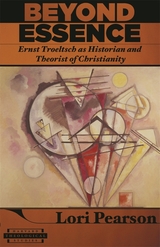 Beyond Essence: Ernst Troeltsch as Historian and Theorist of Christianity
Lori K. Pearson
Harvard University Press, 2008 Does Christianity have an essence? How should the identity of Christianity be defined in the modern world? As early as 1903, German theologian Ernst Troeltsch began to question the then-popular concept of an “essence of Christianity.” In his search for alternative categories and methods for conceptualizing Christianity and its potential roles in modern society, Troeltsch immersed himself in the study and analysis of Christian history. This book demonstrates the intimate connection between Troeltsch’s philosophical writings on the essence of Christianity and his historical investigations of Christianity’s past, focusing on Troeltsch’s conceptions of Christian origins, historical development, and the ideal types of church-sect-mysticism.
Lori Pearson argues that as a result of his historical work, Troeltsch moved beyond the category of essence and sought new ways of theorizing Christian identity in the context of modernity’s pluralistic yet fragmented society.
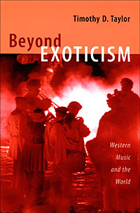 Beyond Exoticism: Western Music and the World
Timothy D. Taylor
Duke University Press, 2007 In Beyond Exoticism, Timothy D. Taylor considers how western cultures’ understandings of racial, ethnic, and cultural differences have been incorporated into music from early operas to contemporary television advertisements, arguing that the commonly used term “exoticism” glosses over such differences in many studies of western music. Beyond Exoticism encompasses a range of musical genres and musicians, including Mozart, Beethoven, Jean-Philippe Rameau, Maurice Ravel, Charles Ives, Henry Cowell, Bally Sagoo, and Bill Laswell as well as opera, symphony, country music, and “world music.” Yet, more than anything else, it is an argument for expanding the purview of musicology to take into account not only composers’ lives and the formal properties of the music they produce but also the larger historical and cultural forces shaping both music and our understanding of it. Beginning with a focus on musical manifestations of colonialism and imperialism, Taylor discusses how the “discovery” of the New World and the development of an understanding of self as distinct from the other, of “here” as different from “there,” was implicated in the development of tonality, a musical system which effectively creates centers and margins. He describes how musical practices signifying nonwestern peoples entered the western European musical vocabulary and how Darwinian thought shaped the cultural conditions of early-twentieth-century music. In the era of globalization, new communication technologies and the explosion of marketing and consumption have accelerated the production and circulation of tropes of otherness. Considering western music produced under rubrics including multiculturalism, collaboration, hybridity, and world music, Taylor scrutinizes contemporary representations of difference. He argues that musical interpretations of the nonwestern other developed hundreds of years ago have not necessarily been discarded; rather they have been recycled and retooled.
 Beyond Feminist Aesthetics: Feminist Literature and Social Change
Rita Felski
Harvard University Press, 1989 Beyond Feminist Aesthetics has a dual focus. First, Rita Felski gives a critical account of current American and European feminist literary theory, and second, she offers an analysis of contemporary fiction by women, drawing in particular on the genres of the autobiographical confession and the novel of self-discovery, in order to show that this literature raises questions for feminism that cannot be answered in terms of a purely gender based analysis.
Felski argues that the idea of a feminist aesthetic is a nonissue that feminists have needlessly pursued; she suggests, in contrast, that it is impossible to speak of “masculine” and “feminine,” “subversive” and “reactionary” literary forms in isolation from the social conditions of their production and reception. The political value of such works of literature from the standpoint of feminism can be determined only by an investigation of their social functions and effects in relation to the interests of women in a particular historical context. This leads her to argue for an interdisciplinary approach to the analysis of literature which can integrate literary and social theory, and to develop such an approach by drawing upon the model of a feminist counter-public sphere.
Rita Felski has produced a closely reasoned, stimulating book that creates a new framework for discussing the relationship between literature and feminist politics. It will interest students and teachers of women’s studies, comparative literature, cultural studies, and fiction.
 Beyond Flesh: Queer Masculinities and Nationalism in Israeli Cinema
Yosef, Raz
Rutgers University Press, 2004 Zionism was not only a political and ideological program but also a sexual one. The liberation of Jews and creation of a new nation were closely intertwined with a longing for the redemption and normalization of the Jewish male body. That body had to be rescued from anti-Semitic, scientific-medical discourse associating it with disease, madness, degeneracy, sexual perversity, and femininityeven with homosexuality. The Zionist movement was intent on transforming the very nature of European Jewish masculinity as it had existed in the diaspora. Zionist/Israeli films expressed this desire through visual and narrative tropes, enforcing the image of the hypermasculine, colonialist-explorer and militaristic nation-builder, an image dependent on the homophobic repudiation of the "feminine" within men. The creation of a new heterosexual Jewish man was further intertwined with attitudes on the breeding of children, bodily hygiene, racial improvement, and Orientalist perspectiveswhich associated the East, and especially Eastern bodies, with unsanitary practices, plagues, disease, and sexual perversity. By stigmatizing Israels Eastern populations as agents of death and degeneration, Zionism created internal biologized enemies, against whom the Zionist society had to defend itself. In the name of securing the life and reproduction of the new Ashkenazi Jewry, Israeli society discriminated against both its internal enemies, the Palestinians, and its own citizens, the Mizrahim (Oriental Jews). Yosefs critique of the construction of masculinities and queerness in Israeli cinema and culture also serves as a model for the investigation of the role of male sexuality within national culture in general.
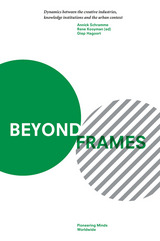 Beyond Frames: Dynamics Between the Creative Industries, Knowledge Institutions and the Urban Context
Edited by Annick Schramme, René Kooyman, and Giep Hagoort
Eburon Academic Publishers, 2014 Initially a provocative concept that incited lively debate and skepticism both in academic circles and among artists and cultural sector professionals, the creative economy is now an accepted force in global development. Complex interactions between both formal and informal, commercial and noncommercial, instrumental and intrinsic notions of knowledge and creativity demonstrate how cultural, technological, social, and economic development can all be valued and understood.
In this book, contributors explore this complexity through three interdependent concepts, the “triple helix” of creative economy: the entrepreneurial spirit, the urban environment, and knowledge institutions. Featuring empirical data and country-specific case studies, Beyond Frames also takes a broader view, considering the dynamics between the three elements and exploring both the societal value and the spillover effects of cultural and creative industries.
 Beyond Freedom’s Reach: A Kidnapping in the Twilight of Slavery
Adam Rothman
Harvard University Press, 2015 Born into slavery in rural Louisiana, Rose Herera was bought and sold several times before being purchased by the De Hart family of New Orleans. Still a slave, she married and had children, who also became the property of the De Harts. But after Union forces captured New Orleans in 1862 during the American Civil War, Herera’s owners fled to Havana, taking three of her small children with them. Beyond Freedom’s Reach is the true story of one woman’s quest to rescue her children from bondage.
In a gripping, meticulously researched account, Adam Rothman lays bare the mayhem of emancipation during and after the Civil War. Just how far the rights of freed slaves extended was unclear to black and white people alike, and so when Mary De Hart returned to New Orleans in 1865 to visit friends, she was surprised to find herself taken into custody as a kidnapper. The case of Rose Herera’s abducted children made its way through New Orleans’ courts, igniting a custody battle that revealed the prospects and limits of justice during Reconstruction.
Rose Herera’s perseverance brought her children’s plight to the attention of members of the U.S. Senate and State Department, who turned a domestic conflict into an international scandal. Beyond Freedom’s Reach is an unforgettable human drama and a poignant reflection on the tangled politics of slavery and the hazards faced by so many Americans on the hard road to freedom.
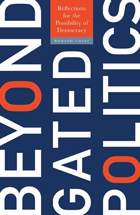 Beyond Gated Politics: Reflections for the Possibility of Democracy
Romand Coles
University of Minnesota Press, 2005 In the early years of the new millennium, the practice of democracy in America and around the world faces tremendous dangers: the proliferation of transnational corporations, the spread of oppressive fundamentalism, and environmental collapse. Within the United States, opposition to increasingly antidemocratic political and economic policies has been either nonexistent or unsuccessful. This trend includes, but far exceeds, the Bush administration’s policies from the Patriot Act and the war on Iraq to the “Clear Channelization” of the media and the private development of public lands.
In Beyond Gated Politics, political theorist and grassroots activist Romand Coles argues that the survival of democracy depends on recognizing the failings of disengaged liberal democracy—the exclusions and subjugations that accompany every democratic “we,” for example—and experimenting with more radical modes of democratic theory and action. Among those brought into the conversation are John Howard Yoder, John Rawls, Alisdair MacIntyre, Jacques Derrida, Jean-Luc Nancy, Gloria Anzaldúa, and Audre Lorde.
Coles, whose work is deeply informed by his own experiences as an activist, pays close attention to the actual practice of democracy with particular interest in emerging social movements. In doing so, he not only moves beyond the paradigms of political liberalism, deliberative democracy, and communitarian republicanism, but also cultivates multidimensional modes of public discourse that reflect and sustain the creative tension at the heart of democratic life and responsibility.
Romand Coles is professor of political theory at Duke University. His previous books include Rethinking Generosity: Critical Theory and the Politics of Caritas and Self/Power/Other: Political Theory and Dialogical Ethics.
Beyond Geography: The Western Spirit Against the Wilderness
Frederick Turner
Rutgers University Press, 1992 First published in 1980, Beyond Geography continues to influence and impress its readers. This new edition, prepared for the Columbus quincentennial, includes a new introduction by T. H. Watkins and a new preface by the author. As the public debates Columbus's legacy, it is important for us to learn of the spiritual background of European domination of the Americas, for the Europeans who conquered the Americas substituted history for myth as a way of understanding life.
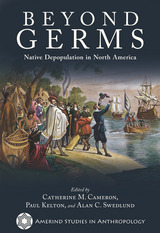 Beyond Germs: Native Depopulation in North America
Edited by Catherine M. Cameron, Paul Kelton, and Alan C. Swedlund
University of Arizona Press, 2015 There is no question that European colonization introduced smallpox, measles, and other infectious diseases to the Americas, causing considerable harm and death to indigenous peoples. But though these diseases were devastating, their impact has been widely exaggerated. Warfare, enslavement, land expropriation, removals, erasure of identity, and other factors undermined Native populations. These factors worked in a deadly cabal with germs to cause epidemics, exacerbate mortality, and curtail population recovery.
Beyond Germs: Native Depopulation in North America challenges the “virgin soil” hypothesis that was used for decades to explain the decimation of the indigenous people of North America. This hypothesis argues that the massive depopulation of the New World was caused primarily by diseases brought by European colonists that infected Native populations lacking immunity to foreign pathogens. In Beyond Germs, contributors expertly argue that blaming germs lets Europeans off the hook for the enormous number of Native American deaths that occurred after 1492.
Archaeologists, anthropologists, and historians come together in this cutting-edge volume to report a wide variety of other factors in the decline in the indigenous population, including genocide, forced labor, and population dislocation. These factors led to what the editors describe in their introduction as “systemic structural violence” on the Native populations of North America.
While we may never know the full extent of Native depopulation during the colonial period because the evidence available for indigenous communities is notoriously slim and problematic, what is certain is that a generation of scholars has significantly overemphasized disease as the cause of depopulation and has downplayed the active role of Europeans in inciting wars, destroying livelihoods, and erasing identities.
Beyond Glasnost: The Post-Totalitarian Mind
Jeffrey C. Goldfarb
University of Chicago Press, 1992 "Beyond Glasnost is a thoughtful exploration of the past decade's cultural and political ferment in Eastern Europe. It is also something else: an argument—in a deceptively unassuming, anti-ideological voice—about how to conceive of and move toward freedom; an argument that could hardly be more relevant to the roiling debates on the Western left."—Ellen Willis, Village Voice
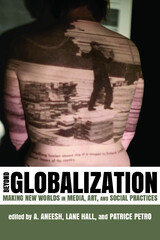 Beyond Globalization: Making New Worlds in Media, Art, and Social Practices
Aneesh, A.
Rutgers University Press, 2011 Does living in a globally networked society mean that we are moving toward a single, homogenous world culture? Or, are we headed for clashes between center and periphery, imperial and subaltern, Western and non-Western, First and Third World? The interdisciplinary essays in Beyond Globalization present us with another possibility—that new media will lead to new kinds of “worldmaking.” This provocative volume brings together the best new work of scholars within such diverse fields as history, sociology, anthropology, film, media studies, and art. Whether examining the inauguration of a virtual community on the website Second Life or investigating the appropriation of biotechnology for transgenic art, this collection highlights how mediated practices have become integral to global culture; how social practices have emerged out of computer-related industries; how contemporary apocalyptic narratives reflect the anxieties of a U.S. culture facing global challenges; and how design, play, and technology help us understand the histories and ideals
behind the digital architectures that mediate our everyday actions.
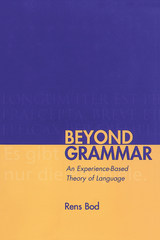 Beyond Grammar: An Experience-Based Theory of Language
Rens Bod
CSLI, 1998 During the last few years, a new approach to language processing has started to emerge, which has become known under the name of "Data Oriented Parsing" or "DOP". This approach embodies the assumption that human language comprehension and production works with representations of concrete past language experiences, rather than with abstract grammatical rules. The models that instantiate this approach therefore maintain corpora of linguistic representations of previously occurring utterances. New utterance-representations are constructed by freely combining partial structures from the corpus. A probability model is used to choose from the collection of different structures of different sizes those that make up the most appropriate representation of an utterance.
In this book, DOP models for several kinds of linguistic representations are developed, ranging from tree representations, compositional semantic representations, attribute-value representations, and dialogue representations. These models are studied from a formal, linguistic and computational perspective and are tested with available language corpora. The main outcome of these tests suggests that the productive units of natural language cannot be defined in terms of a minimal set of rules (or constraints or principles), as is usually attempted in linguistic theory, but need to be defined in terms of a large, redundant set of previously experienced structures with virtually no restriction on their size and complexity. I will argue that this outcome has important consequences for linguistic theory, leading to a new notion of language competence. In particular, it means that the knowledge of a speaker/hearer cannot be understood as a grammar, but as a statistical ensemble of language experiences that changes slightly every time a new utterance is processed.
 Beyond Greek: The Beginnings of Latin Literature
Denis Feeney
Harvard University Press, 2016 A History Today Best Book of the Year
A Choice Outstanding Academic Title of the Year
Virgil, Ovid, Cicero, Horace, and other authors of ancient Rome are so firmly established in the Western canon today that the birth of Latin literature seems inevitable. Yet, Denis Feeney boldly argues, the beginnings of Latin literature were anything but inevitable. The cultural flourishing that in time produced the Aeneid, the Metamorphoses, and other Latin classics was one of the strangest events in history.
“Feeney is to be congratulated on his willingness to put Roman literary history in a big comparative context…It is a powerful testimony to the importance of Denis Feeney’s work that the old chestnuts of classical literary history—how the Romans got themselves Hellenized, and whether those jack-booted thugs felt anxiously belated or smugly domineering in their appropriation of Greek culture for their own purposes—feel fresh and urgent again.”
—Emily Wilson, Times Literary Supplement
“[Feeney’s] bold theme and vigorous writing render Beyond Greek of interest to anyone intrigued by the history and literature of the classical world.”
—The Economist
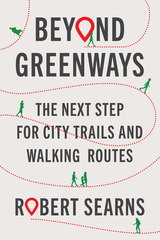 Beyond Greenways: The Next Step for City Trails and Walking Routes
Robert M. Searns
Island Press, 2023 If your doorstep were a trailhead, how would you experience your city? With this newfound freedom, you might head in a new direction—walk to a restaurant in an area you’ve never explored, begin to savor your daily walk to work, or set out with a daypack to the city edges for fresh air and nature. Despite the known health benefits of routine walking, many people don’t have pleasant, safe places to walk. Too often, street networks have barriers—cul-de-sacs, freeways, or busy, dangerous-to-cross, arterials. Many lack sidewalks at all. There is a clear need for high-quality, readily accessible pedestrian infrastructure in and around urban areas.
In Beyond Greenways: The Next Step for City Trails and Walking Routes, greenways expert Robert Searns makes a case for walking infrastructure that serves a more diverse array of people. He builds on the legacy of boulevards, parkways, and greenways to introduce a next generation of more accessible pathways, wide enough for two people to stroll together, that stitch together urban and suburban areas. With more trails built near neighborhoods that haven’t had access to them, more people can get around on foot, in town or further out. Searns lays out practical advice on how to plan and design them, garner community support, and get them built. Drawing inspiration from the US and abroad, he introduces two models—grand loop trails and town walks. Grand loop trails are regional-scale, 20 to 350-mile systems that encircle metro areas, running along the edges where city meets countryside. Town walks are shorter—2 to 6-mile routes in cities. Throughout, Searns presents examples that embody these ideals, from Tucson’s Turquoise Trail, created by just two people with an idea and some left-over blue paint the city had, to a more deluxe 5-mile loop in Denver, to the Maricopa trail in Phoenix, a completed 315 mile grand loop. He also envisions these trails in new places across North America.
Planners, trail advocates, community leaders and those who just want closer-in places to hike or walk will find the tools they need to develop successful and affordable plans, including how to envision them to fit various settings and strategies for implementation. Now is the time to think beyond greenways, to pursue a legacy of accessible pedestrian routes for this, and future, generations.
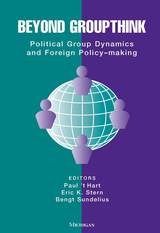 Beyond Groupthink: Political Group Dynamics and Foreign Policy-making
Paul 't Hart, Eric K. Stern, and Bengt Sundelius, Editors
University of Michigan Press, 1997 Strategic issues and crises in foreign policy are usually managed by relatively small groups of elite policymakers and their closest advisors. Since the pioneering work of Irving Janis in the early 1970s, we have known that the interplay between the members of these groups can have a profound and, indeed, at times a pernicious influence on the content and quality of foreign policy decisions. Janis argued that "groupthink," a term he used to describe a tendency for extreme concurrence-seeking in decision-making groups, was a major cause of a number of U.S. foreign policy fiascoes. And yet not all small groups suffer from groupthink; in fact many high-level bodies are handicapped by an inability to achieve consensus at all.
Beyond Groupthink builds upon and extends Janis's legacy. The contributors develop a richer understanding of group dynamics by drawing on alternate views of small-group dynamics. The relevant literature is reviewed and the different perspectives are explored in detailed case studies. The contributors link the group process to the broader organizational and political context of the policy process and stress the need to develop a multi-level understanding of the collegial policy-making process, combining the insights drawn from micro-level theories with those derived from study of broader political phenomena. The contributors include Alexander George, Sally Riggs Fuller, Paul D. Hoyt, Ramon J. Aldag, Max V. Metselaar, Bertjan Verbeek, J. Thomas Preston, Jean A. Garrison, and Yaacov Y. I. Vertzberger.
This book should appeal to political scienctists and international relations specialists, as well as researchers in social psychology, public administration, and management interested in group decision-making processes.
Paul 't Hart is Associate Professor, Department of Public Administration, Leiden University and Scientific Director of of the Leiden-Rotterdam Crisis Research Center. Eric Stern is Professor of Political Science at Stockholm University. Bengt Sundelius is Professor of Political Science at Stockholm University.
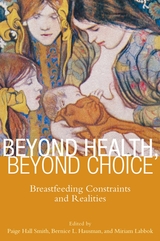 Beyond Health, Beyond Choice: Breastfeeding Constraints and Realities
Edited by Paige Hall Smith, Bernice L Hausman, and Miriam Labbok
Rutgers University Press, 2012 Current public health promotion of breastfeeding relies heavily on health messaging and individual behavior change. Women are told that “breast is best” but too little serious attention is given to addressing the many social, economic, and political factors that combine to limit women’s real choice to breastfeed beyond a few days or weeks. The result: women’s, infants’, and public health interests are undermined. Beyond Health, Beyond Choice examines how feminist perspectives can inform public health support for breastfeeding. Written by authors from diverse disciplines, perspectives, and countries, this collection of essays is arranged thematically and considers breastfeeding in relation to public health and health care; work and family; embodiment (specifically breastfeeding in public); economic and ethnic factors; guilt; violence; and commercialization. By examining women’s experiences and bringing feminist insights to bear on a public issue, the editors attempt to reframe the discussion to better inform public health approaches and political action. Doing so can help us recognize the value of breastfeeding for the public’s health and the important productive and reproductive contributions women make to the world.
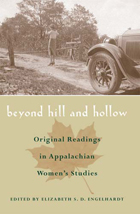 Beyond Hill and Hollow: Original Readings in Appalachian Women’s Studies
Elizabeth S. D. Engelhardt
Ohio University Press, 2004 Women’s studies unites with Appalachian studies in Beyond Hill and Hollow, the first book to focus exclusively on studies of Appalachia’s women. Featuring the work of historians, linguists, sociologists, performance artists, literary critics, theater scholars, and others, the collection portrays the diverse cultures of Appalachian women.
The chapters in Beyond Hill and Hollow examine the hidden lives of Appalachian prostitutes, urban Appalachian women in the 1800s, rural women in company towns, and an African American Appalachian poet from the 1900s. Contributors look at Appalachian opera houses, Jewish women in the coalfields, the writings of Wilma Dykeman and Sharyn McCrumb, and activists in out-migrant communities like Cincinnati. With an introduction by editor Elizabeth S. D. Engelhardt, Beyond Hill and Hollow firmly establishes the field of Appalachian Women’s Studies.
Appropriate both as a reference and as a classroom text, Beyond Hill and Hollow expands our understanding of Appalachian women’s lives. Readers, whether from the region or beyond, may recognize themselves or women they know in its pages.
Beyond Homelessness: Frames Of Reference
Benedict Giamo
University of Iowa Press, 1992
Homelessness is a haunting social problem that has, by all definitions, outgrown society's conventional solutions. Through their interviews with nine knowledgeable observers who range across the humanities, social and medical sciences, and human services, Giamo and Grunberg examines the nature and conditions of this ongoing crisis. No longer contained by traditional urban skid rows or state mental hospitals, homeless individuals now confront "normal" society face to face—and this "normal" society is at a loss for how to respond. The enormity of the problem has resulted in a stagnation of viable ideas, creating an industry with an endless litany of root cause and quick fix. But as these dialogues point out, there is no one root cause for the fact of homelessness. These timely, penetrating exhanges challenge established misconceptions of this problem.
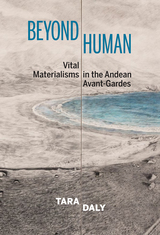 Beyond Human: Vital Materialisms in the Andean Avant-Gardes
Daly, Tara
Bucknell University Press, 2019 In the Andes, indigenous knowledge systems based on the relationships between different beings, both earthly and heavenly, animal and plant, have been central to the organization of knowledge since precolonial times. The legacies of colonialism and the continuance of indigenous cultures make the Andes a unique place from which to think about art and social change as ongoing, and as encompassing more than an exclusively human perspective. Beyond Human revises established readings of the avant-gardes in Peru and Bolivia as humanizing and historical. By presenting fresh readings of canonical authors like César Vallejo, José María Arguedas, and Magda Portal, and through analysis of newer artist-activists like Julieta Paredes, Mujeres Creando Comunidad, and Alejandra Dorado, Daly argues instead that avant-gardes complicate questions of agency and contribute to theoretical discussions on vital materialisms: the idea that life happens between animate and inanimate beings—human and non-human—and is made sensible through art.
Published by Bucknell University Press. Distributed worldwide by Rutgers University Press.
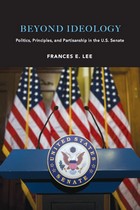 Beyond Ideology: Politics, Principles, and Partisanship in the U. S. Senate
Frances E. Lee
University of Chicago Press, 2009 The congressional agenda, Frances Lee contends, includes many issues about which liberals and conservatives generally agree. Even over these matters, though, Democratic and Republican senators tend to fight with each other. What explains this discord? Beyond Ideology argues that many partisan battles are rooted in competition for power rather than disagreement over the rightful role of government. The first book to systematically distinguish Senate disputes centering on ideological questions from the large proportion of them that do not, this volume foregrounds the role of power struggle in partisan conflict. Presidential leadership, for example, inherently polarizes legislators who can influence public opinion of the president and his party by how they handle his agenda. Senators also exploit good government measures and floor debate to embarrass opponents and burnish their own party’s image—even when the issues involved are broadly supported or low-stakes. Moreover, Lee contends, the congressional agenda itself amplifies conflict by increasingly focusing on issues that reliably differentiate the parties. With the new president pledging to stem the tide of partisan polarization, Beyond Ideology provides a timely taxonomy of exactly what stands in his way.
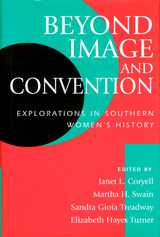 Beyond Image and Convention: Explorations in Southern Women's History
Edited by Janet L. Coryell, Martha H. Swain, Sandra Goioa Treadway, & ElizabethHayes Turner
University of Missouri Press, 1998
Despite their prevailing image and stereotype, southern women have often gone "beyond convention," living on their own terms within a society that revered tradition and compliance. Spanning the colonial era to the mid-twentieth century, Beyond Image and Convention documents women from widely varied social, economic, religious, and ethnic backgrounds who acted outside the accepted gender boundaries of their day.
Reflecting the quality and breadth of current scholarship in the field of southern women's history, this collection of essays relies upon previously untapped documentary evidence and, in the process, crafts provocative new interpretations of our collective past. The essays explore the historical experience of black and white southern women across nearly three centuries, including a white woman's sexual misconduct in colonial North Carolina, one slave woman's successful attempt to carve out an autonomous existence in southwestern Virginia, an ex-slave's fight for freedom in postbellum Missouri, and the civil rights activism of two white southern women—Sarah Patton Boyle of Virginia and Alice Norwood Spearman of South Carolina.
Breaking new ground in the study of women's history, Beyond Image and Convention provides valuable insights for both specialists and general readers.
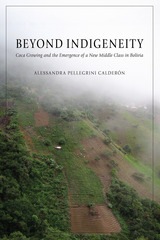 Beyond Indigeneity: Coca Growing and the Emergence of a New Middle Class in Bolivia
Alessandra Pellegrini Calderón
University of Arizona Press, 2016 In Bolivia, the discourse on indigenous peoples intensified in the last few decades, culminating in the election of Evo Morales as president in 2005. Indigenous people are portrayed by the Morales government as modest, communitarian, humble, poor, anticapitalist, and economically marginalized. In his 2006 inaugural speech, Morales famously described indigenous people as “the moral reserve of humanity.” His rhetoric has reached all levels of society—most notably the new political constitution of 2009. This constitution initiated a new regime of considerable ethnic character by defining thirty-six indigenous nations and languages.
Beyond Indigeneity offers new analysis into indigenous identity and social mobility that changes the discourse in Latin American social anthropology. Author Alessandra Pellegrini Calderón points out that Morales’s presidency has led to heightened publicity of coca issues and an intensification of indigeneity discourse, echoing a global trend of increased recognition of indigenous peoples’ claims. The “living well” attitude (vivir bien) enshrined in the new political constitution is generally represented as an indigenous way of life, one based on harmony and reciprocity, in sharp contrast to the capitalist logic of “living better” that is based on accumulation and expansion.
In this ethnography, Pellegrini explores the positioning of coca growers in Bolivia and their reluctance to embrace the politics of indigeneity by rejecting the “indigenous peoples’ slot,” even while they emerge as a new middle class. By staying in a space between ethnic categories and also between social classes, the coca growers break with the traditional model of social mobility in Latin America and create new forms of political positioning that challenge the dominant culturalist framework about indigeneity and peasants.
 Beyond Individualism
Michael J. Piore
Harvard University Press, 1995 The Reagan and Bush years have left us with a troublesome dilemma: how to balance our budget deficit against our social deficit. This book takes up the urgent question of how, in a time of economic crisis and constraint, we can meet the pent-up demand for spending on our nation’s neglected poor, infirm, and disadvantaged, old and young. Michael Piore’s ambitious response is to develop a new social theory that balances individual preferences against the claims and responsibilities of the community. By explaining the role of groups in economic and social life, this theory makes sense of a host of perplexing social phenomena and policy issues, from equal employment opportunity to international competitiveness to the decline of organized labor, from multicultural education to health insurance to the underclass.
Piore traces our difficulties in addressing these issues to the limits of liberal social theory, particularly its sharp distinctions between individuality and community. He offers an alternative view of individuality as emerging through the discussions and debates conducted among a community’s members. These discussions, Piore suggests, have turned inward, away from the borderlands where social groups and economic organizations meet—and therein lies the crux of some of the country’s deepest political and economic problems. His book points beyond the liberal conception of politics as a negotiation among competing interests and of policymaking as technical decisionmaking. Instead, it prescribes a politics focused on the process of discussion and debate itself, a politics that enlarges the borderlands by broadening the range of people who talk to one another and the range of topics they address.
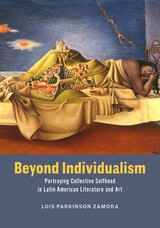 Beyond Individualism: Portraying Collective Selfhood in Latin American Literature and Art
Lois Parkinson Zamora
University of Chicago Press, 2025 A sweeping analysis of “archetypal realism” in Latin American literature and art.
Beyond Individualism examines the portrayal of collective identities over two centuries in Latin American literature and visual art. Lois Parkinson Zamora shows that many authors and artists are less concerned with singular selves than with selves-in-relation: less with individual autonomy than with communal affiliation. Their works—sometimes situated under the labels Neobaroque, magical realism, Surrealism, Expressionism, and idealism—resist the kind of psychological realism typical of European and North American novels, moving instead toward a wholly new kind of fiction.
Zamora calls this new Latin American form “archetypal realism” because its characters represent entities larger than themselves. They may embody entire communities, cultures, families, religious orders, or ideal planets. Through deft readings of collective characters in fiction by Gabriel García Márquez, Isabel Allende, Jorge Luis Borges, and more alongside the art of Diego Rivera, Remedios Varo, and Xul Solar, Zamora reveals a modernity based not on Enlightenment conceptions of selfhood but on community, collectivity, and kinship.
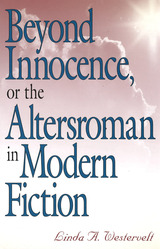 Beyond Innocence, or the Altersroman in Modern Fiction
Linda A. Westervelt
University of Missouri Press, 1997
In this groundbreaking work, Linda A. Westervelt defines an important yet previously unidentified and therefore unnamed type of novel, the altersroman, or age novel. Fictions focusing on a protagonist's confrontation with mortality toward the end of middle age are likely to become ever more prominent in a Western world in which the average age of the population increases and more people reach late middle age and old age.
Working from a diverse sample of modern literature, Westervelt analyzes the variety of responses to the life evaluation. Some characters achieve a level of affirmation that allows renewal, redirection, or simply peace, while others confront feelings of disgust or despair that so little time is left them. Her altersromane are books about seeking wisdom, though not everyone of this age becomes wise. The use of the term altersroman highlights the fact that the altersroman is a classification comparable to but also clearly distinguishable from the bildungsroman, wherein characters make the transition from youth to adulthood. Westervelt contrasts her older protagonists' characteristics with the equivalent characteristics in the bildungsroman through an examination of Don Quixote, part 2, as well as six American novels: The Ambassadors, by Henry James; The Professor's House, by Willa Cather; The Mansion, by William Faulkner; The Angle of Repose, by Wallace Stegner; A Book of Common Prayer, by Joan Didion; and Jazz, by Toni Morrison. These seven works, though remarkably different, share the common features of the altersroman. Westervelt articulates the traits clearly, rests them on the psychological literature, and then shows in depth how the characteristics of the altersroman can enrich and more deeply inform our reading of a significant subset of modern literature that previously went unheralded. Readers can use Westervelt's analysis to identify altersromane in literature other than their own, and she begins this process by identifying exemplars written in other languages.
Beyond Innocence, or the Altersroman in Modern Fiction introduces readers to the altersroman as a tool for classification and analysis and demonstrates the power and utility of that tool. It offers a meaningful and enriching complement to the more established category of the bildungsroman.
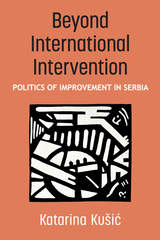 Beyond International Intervention: Politics of Improvement in Serbia
Katarina Kušic
University of Michigan Press, 2025 Studies of statebuilding and peacebuilding have been criticized for their disregard of people living the consequences of intervention projects. Beyond International Intervention takes on the task of engaging with spaces and peoples not usually present in IR scholarship to rethink the very concept of “intervention” by paying close attention to how people actually experience and make sense of those efforts. In particular, the book offers a detailed engagement with ethnographic fieldwork in two policy areas in Serbia—agricultural policy and non-formal youth education.
By engaging with subjects, the book not only enhances our understanding of intervention, but also uncovers the limitations of the concept. Katarina Kušić argues that the concept limits what we can observe and theorize, and it prevents researchers from engaging with the people living in spaces of intervention as coeval political subjects. As an alternative, she proposes to foreground improvement over “intervention.” This reorientation enables researchers to trace hierarchies beyond the local/international dichotomy, expands fields of visibility beyond those prescribed by interventions themselves, and seriously considers the contradictions at the heart of liberalism.
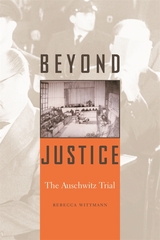 Beyond Justice: The Auschwitz Trial
Rebecca Wittmann
Harvard University Press, 2012 In 1963, West Germany was gripped by a dramatic trial of former guards who had worked at the Nazi death camp Auschwitz. It was the largest and most public trial to take place in the country and attracted international attention. Using the pretrial files and extensive trial audiotapes, Rebecca Wittmann offers a fascinating reinterpretation of Germany’s first major attempt to confront its past.
Evoking the courtroom atmosphere, Wittmann vividly recounts the testimony of survivors, former SS officers, and defendants—a cross-section of the camp population. Attorney General Fritz Bauer made an extraordinary effort to put the entire Auschwitz complex on trial, but constrained by West German murder laws, the prosecution had to resort to standards for illegal behavior that echoed the laws of the Third Reich. This provided a legitimacy to the Nazi state. Only those who exceeded direct orders were convicted of murder. This shocking ruling was reflected in the press coverage, which focused on only the most sadistic and brutal crimes, allowing the real atrocity at Auschwitz—mass murder in the gas chambers—to be relegated to the background.
The Auschwitz trial had a paradoxical result. Although the prosecution succeeded in exposing SS crimes at the camp for the first time, the public absorbed a distorted representation of the criminality of the camp system. The Auschwitz trial ensured that rather than coming to terms with their Nazi past, Germans managed to delay a true reckoning with the horror of the Holocaust.
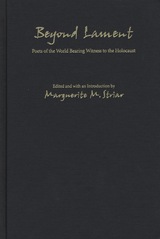 Beyond Lament: Poets of the World Bearing Witness to the Holocaust
Marguerite Striar
Northwestern University Press, 1998 Challenging Theodor Adorno's famous statement that "writing poetry after Auschwitz is barbaric," Beyond Lament is a rich and varied anthology consisting of new and previously published poems about the atrocity of the Holocaust. While writing poetry about the Holocaust may be considered by some to be a futile attempt to express the inexpressible, for many the need to give voice to the anger and despair of the Holocaust is as essential as the need to come to grips with its unspeakable horror.
Editor Marguerite M. Striar has arranged the nearly 300 poems in this volume to tell the story beginmning with the early premonitions of Nazi evil in 1933, through the course of the unthinkable violence that ended in 1945 with Hitler's demise, to the flourishing of concern for human rights in the aftermath of the Holocaust. These works by well-known poets such as Paul Celan, Nelly Sachs, Czeslaw Milosz, Dannie Abse, and Robert Pinsky, as well as many lesser-known or unknown poets, show how poetry makes history memorable, confirm the resiliance of the human spirit, and prove that even in the fact of great suffering, the flame of creation will not be extinguished.
Beyond Left and Right: Insurgency and the Establishment
David A. Horowitz
University of Illinois Press, 1997 Beyond Left and Right is a sweeping overview of political insurgency in the United States from the 1880s to the present. It is at once a stunning synthesis, drawing on a large number of scholarly works, and an ambitious and original piece of research. The book ranges over diverse individuals and groups that have attacked the established order, from the left and the right, from the Populists of the 1890s to Ross Perot and the religious right of our times, dealing along the way with non-interventionists, Klans, monetary radicals, McCarthyites, Birchers, and Reaganites, among many others.
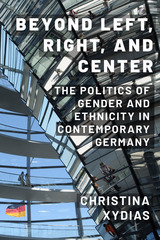 Beyond Left, Right, and Center: The Politics of Gender and Ethnicity in Contemporary Germany
Christina Xydias
Temple University Press, 2024 Women’s political representation is often expected to be better on “the left.” However, the reality is more complicated. Using Germany’s multi-party system as its central case study, Beyond Left, Right, and Center challenges this conventional wisdom on political ideology.
Christina Xydias shows that some right-leaning parties advocate for women’s rights and interests, while left- and right-leaning parties can be equally indifferent to lack of representation for women from marginalized groups. These findings follow from analyses of election results, transcripts from debates and speeches, and personal interviews, as well as from a close reading of intertwined military and citizenship policies that illustrate how women’s and ethnic minority groups’ rights are constructed.
Beyond Left, Right, and Center concludes with an analysis of women’s representation across OECD countries, showing that right-leaning parties are more likely to support women’s rights and interests in societies that are more egalitarian.
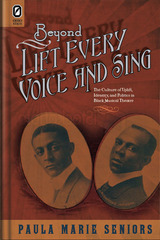 Beyond Lift Every Voice and Sing: The Culture of Uplift, Identity, and Politics in Black Musical Theater
Paula Marie Seniors
Ohio State University Press, 2009 Paula Marie Seniors’s Beyond Lift Every Voice and Sing is an engaging and well-researched book that explores the realities of African American life and history as refracted through the musical theater productions of one of the most prolific black song-writing teams of the early twentieth century. James Weldon Johnson, J. Rosamond Johnson, and Bob Cole combined conservative and progressive ideas in a complex and historically specific strategy for overcoming racism and its effects. In Shoo Fly Regiment (1906–1908) and The Red Moon (1908–1910), theater, uplift, and politics collided as the team tried to communicate a politics of uplift, racial pride, gender equality, and interethnic coalitions. The overarching question of this study is how roles and representations in black musical theater both reflected and challenged the dominant social order. While some scholars dismiss the team as conformists, Seniors’s contention is that they used the very tools of hegemony to make progressive political statements and to create a distinctly black theater informed by black politics, history, and culture. These men were writers, musicians, actors, and vaudevillians who strove to change the perception of African Americans on stage from one of minstrelsy buffoonery to one of dignity and professionalism.
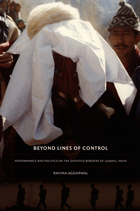 Beyond Lines of Control: Performance and Politics on the Disputed Borders of Ladakh, India
Ravina Aggarwal
Duke University Press, 2004 The Kashmir conflict, the ongoing border dispute between India and Pakistan, has sparked four wars and cost thousands of lives. In this innovative ethnography, Ravina Aggarwal moves beyond conventional understandings of the conflict—which tend to emphasize geopolitical security concerns and religious essentialisms—to consider how it is experienced by those living in the border zones along the Line of Control, the 435-mile boundary separating India from Pakistan. She focuses on Ladakh, the largest region in northern India’s State of Jammu and Kashmir. Located high in the Himalayan and Korakoram ranges, Ladakh borders Pakistan to the west and Tibet to the east. Revealing how the shadow of war affects the lives of Buddhist and Muslim communities in Ladakh, Beyond Lines of Control is an impassioned call for the inclusion of the region’s cultural history and politics in discussions about the status of Kashmir. Aggarwal brings the insights of performance studies and the growing field of the anthropology of international borders to bear on her extensive fieldwork in Ladakh. She examines how social and religious boundaries are created on the Ladakhi frontier, how they are influenced by directives of the nation-state, and how they are shaped into political struggles for regional control that are legitimized through discourses of religious purity, patriotism, and development. She demonstrates in lively detail the ways that these struggles are enacted in particular cultural performances such as national holidays, festivals, rites of passage ceremonies, films, and archery games. By placing cultural performances and political movements in Ladakh center stage, Aggarwal rewrites the standard plot of nation and border along the Line of Control.
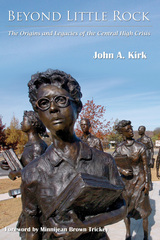 Beyond Little Rock: The Origins and Legacies of the Central High Crisis
John A. Kirk
University of Arkansas Press, 2007 Based on extensive archival work, private paper collections, and oral history, this book includes eight of John Kirk’s essays, two of which have never been published before. Together, these essays locate the dramatic events of the crisis within the larger story of the African American struggle for freedom and equality in Arkansas. Examining key episodes in state history from before the New Deal to the present, Kirk covers a wide range of topics that include the historiography of the school crisis; the impact of the New Deal; early African American politics and mass mobilization; race, gender, and the civil rights movement; the role of white liberals in the struggle; and the intersections of race and city planning policy. Kirk unearths many previously neglected individuals, organizations, and episodes, and provides a thought-provoking analytical framework for understanding them.
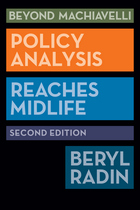 Beyond Machiavelli: Policy Analysis Reaches Midlife, Second Edition
Beryl A. Radin
Georgetown University Press, 2013 In this new edition of Beyond Machiavelli, Beryl Radin updates her popular overview of the field of policy analysis. Radin, winner of the John Gaus Award from the American Political Science Association, considers the critical issues that confront the policy analysis practitioner, changes in the field, including the globalization of policy analysis, and the dramatic changes in the policy environment. She examines schools and careers; the conflict between the imperatives of analysis and the world of politics; the analytic tools that have been used, created, or discarded over the past fifty years; the relationship between decision makers and analysts as the field has multiplied and spread; and the assumptions about the availability and appropriateness of information that can be used in the analytic task. Once found largely in the United States, policy analysis has become global, and Radin discusses the field’s new paradigms, methodologies and concepts of success. This new edition considers changes in expertise, controversies in the field, today’s career prospects, and the impact of 9/11 on the field. She profiles three additional policy analysis organizations and updates the profiles of the organizations in the first edition. Continuing the trajectory of the fictional characters from the first edition, Radin adds a character representing the new generation just entering the field. The book discusses the shifts in society’s attitudes toward public action, the availability of resources to meet public needs, and the dimensions of policymaking. Written for students, faculty, and practitioners, the book concludes with a look at the possible dimensions of the policy analysis field and profession as it moves into the future.
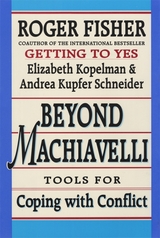 Beyond Machiavelli: Tools for Coping with Conflict
Roger Fisher, Elizabeth Kopelman, and Andrea Kupfer Schneider
Harvard University Press, 1994 Conflict is a growth industry, as a glance at the daily paper or the nightly news tells us. Trade wars, global warming, ethnic strife, refugee crises--as the world draws closer together on a thousand fronts, trouble erupts, clashes occur, and new problems arise. What's wrong, and what can be done about it? This cogent book offers a clear approach for dealing with conflicting interests of any kind.
Roger Fisher, the world-renowned master of negotiation, with two of his leading colleagues--Elizabeth Kopelman and Andrea Kupfer Schneider--provides a step-by-step process for dealing with the persistent and complex disputes that mark our changing, often dangerous world. Instead of simply asking why things work--or don't--the authors ask: how can we affect the way things work? They break conflicts into manageable components and advance a process for problemsolving. Arguing that we need to move beyond oneshot "solutions" toward a constructive way of dealing with differences, they lay out tools for conflict analysis and practical applications for those tools in the international arena.
The authors also show that tactics which successfully influence an adversary are equally applicable to the task of persuading an employer, a community official, or a business associate. Originally drafted as a handbook for the diplomats and senior officials advised by Fisher and his colleagues, this succinct, lucid, and effective book is the primer about the new paradigm in conflict management.
 Beyond Machismo: Intersectional Latino Masculinities
By Aída Hurtado and Mrinal Sinha
University of Texas Press, 2016 Long considered a pervasive value of Latino cultures both south and north of the US border, machismo—a hypermasculinity that obliterates any other possible influences on men’s attitudes and behavior—is still used to define Latino men and boys in the larger social narrative. Yet a closer look reveals young, educated Latino men who are going beyond machismo to a deeper understanding of women’s experiences and a commitment to ending gender oppression. This new Latino manhood is the subject of Beyond Machismo. Applying and expanding the concept of intersectionality developed by Chicana feminists, Aída Hurtado and Mrinal Sinha explain how the influences of race, class, ethnicity, sexuality, and gender shape Latinos’ views of manhood, masculinity, and gender issues in Latino communities and their acceptance or rejection of feminism. In particular, the authors show how encountering Chicana feminist writings in college, as well as witnessing the horrors of sexist oppression in the United States and Latin America, propels young Latino men to a feminist consciousness. By focusing on young, high-achieving Latinos, Beyond Machismo elucidates this social group’s internal diversity, thereby providing a more nuanced understanding of the processes by which Latino men can overcome structural obstacles, form coalitions across lines of difference, and contribute to movements for social justice.
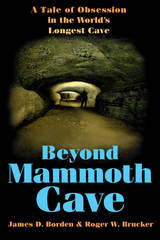 Beyond Mammoth Cave: A Tale of Obsession in the World's Longest Cave
James D. Borden and Roger W. Brucker
Southern Illinois University Press, 2000 In Beyond Mammoth Cave: A Tale of Obsession in the World’s Longest Cave, James D. Borden and Roger W. Brucker provide gripping first-person accounts of the discoveries, including Roppel Cave, that made Kentucky’s Mammoth Cave three times longer than any other cave in the world. Borden, a relative newcomer, and Brucker, a veteran explorer, bring a personal and sometimes conflicting view of their roles as adversaries in a race that lasted from 1972 through 1983 to find “big cave.” They describe hazardous adventures, precarious climbs, and close calls from falling rocks. The perils are many and the trek arduous as they squirm through muddy tubes, wade in neck-deep cold water, and crawl over sharp rocks and gritty sand. Theirs is a tale of agonizing endurance spiced by spectacular discoveries. But the cave was not the sole obstacle. The explorations were complicated by political intrigue and the rivalry between the Kentucky-based Cave Research Foundation and the Central Kentucky Karst Coalition, each seeking to make discoveries and hide secrets. Extreme stress, of course, evoked extreme behavior, ranging from selfishness to sacrifice, from outrageous humor to the deadly serious response. Beyond Mammoth Cave includes maps by Patricia Kambesis that show the progression of cave discoveries in relation to the topography. Original line drawings by well-known illustrator Linda Heslop capture the dark mystery of the exploration. The book features five black and white photographs as a color gallery of photographs. A sequel to The Longest Cave by Brucker and Richard A. Watson, this book is a comprehensive update of the speleological investigations in the Mammoth Cave region. Brucker’s involvement provides continuity to the investigation.
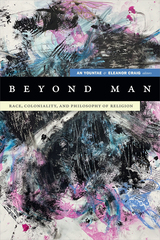 Beyond Man: Race, Coloniality, and Philosophy of Religion
Yountae An and Eleanor Craig, editors
Duke University Press, 2021 Beyond Man reimagines the meaning and potential of a philosophy of religion that better attends to the inextricable links among religion, racism, and colonialism. An Yountae, Eleanor Craig, and the contributors reckon with the colonial and racial implications of the field's history by staging a conversation with Black, Indigenous, and decolonial studies. In their introduction, An and Craig point out that European-descended Christianity has historically defined itself by its relation to the other while paradoxically claiming to represent and speak to humanity in its totality. The topics include secularism, the Eucharist's relation to Blackness, and sixteenth-century Brazilian cannibalism rituals as well as an analysis of how Mircea Eliade's conception of the sacred underwrites settler colonial projects and imaginaries. Throughout, the contributors also highlight the theorizing of Afro-Caribbean thinkers such as Sylvia Wynter, C. L. R. James, Frantz Fanon, and Aimé Césaire whose work disrupts the normative Western categories of religion and philosophy.
Contributors. An Yountae, Ellen Armour, J. Kameron Carter, Eleanor Craig, Amy Hollywood, Vincent Lloyd, Filipe Maia, Mayra Rivera, Devin Singh, Joseph R. Winters
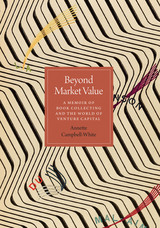 Beyond Market Value: A Memoir of Book Collecting and the World of Venture Capital
By Annette Campbell-White
University of Texas Press, 2019 Beyond Market Value chronicles Annette Campbell-White’s remarkable life, from a childhood spent in remote mining camps throughout the British Commonwealth, where books created an imaginary home; to her early adulthood in London, where she first discovered a vocation as a book collector; to Silicon Valley, where she built a pioneering career as a formidable venture capitalist. She recalls the impulsive purchase of the first book in her collection, T. S. Eliot’s A Song for Simeon, and her pursuit of rare editions of all one hundred titles listed in Cyril Connolly’s The Modern Movement. Campbell-White’s collecting and career peaked in 2005, when she acquired the last of the Connolly titles and was first named to Forbes’ Midas List, the annual ranking of the most successful dealmakers in venture capital. In 2007, out of concern for their preservation, Campbell-White rashly sold the Connolly titles she had spent more than twenty years assembling, leading to a new appreciation of what remained of her collection and, going forward, a broader focus on collecting modernist letters, manuscripts, and ephemera. Beyond Market Value is both a loving tribute to literary collecting and a telling account of the challenges of being a woman in the male-dominated world of finance.
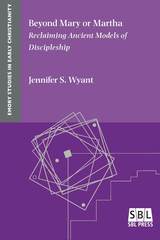 Beyond Mary or Martha: Reclaiming Ancient Models of Discipleship
Jennifer S. Wyant
SBL Press, 2019 Explore a tale of two sisters
Beyond Mary or Martha: Reclaiming Ancient Models of Discipleship dives into the complicated reception history of Mary and Martha of Bethany, who have been at the center of many debates for almost two thousand years. Jennifer S. Wyant begins her study with a close reading of the sisters’ first encounter with Jesus in Luke 10:38-42, then moves on to patristic, medieval, and modern interpretations of that narrative. Wyant tracks how Mary and Martha both became paradigms of discipleship, revealing the inherent tension within Christianity between contemplative practices and acts of service. By placing ancient debates alongside more modern ones, she argues that, contrary to discussions today within academic and religious circles, gender is not the most important aspect of their story.
Features:
- A thorough examination of the textual variants in the passage to show how variants affected interpretation throughout history
- Interpretations from medieval women and their contributions to interpretation of Mary and Martha
- A visual exegesis of the art representing the passage throughout history
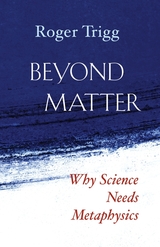 Beyond Matter: Why Science Needs Metaphysics
Roger Trigg
Templeton Press, 2016 Does science have all the answers? Can it even deal with abstract reasoning beyond the world we experience? How can we ensure that the physical world is sufficiently ordered to be intelligible to humans? How can mathematics, a product of human minds, unlock the secrets of the physical universe? Should all such questions be considered inadmissible if science cannot settle them? Metaphysics has traditionally been understood as reasoning beyond the reach of science, sometimes even claiming realities beyond its grasp. Because of this, metaphysics is often contemptuously dismissed by scientists and philosophers who wish to remain within the bounds of what can be scientifically proven. Yet scientists at the frontiers of physics unwittingly engage in metaphysics, as they are now happy to contemplate whole universes that are, in principle, beyond human reach. Roger Trigg challenges those who deny that science needs philosophical assumptions. Trigg claims that the foundations of science themselves have to lie beyond science. It takes reasoning apart from experience to discover what is not yet known and this metaphysical reasoning to imagine realities beyond what can be accessed. “In Beyond Matter, Roger Trigg advances a powerful, persuasive, fair-minded argument that the sciences require a philosophical, metaphysical foundation. This is a brilliant book for newcomers to the philosophy of science and experts alike.” —Charles Taliaferro, professor of philosophy, St. Olaf College
Beyond Memory: An Anthology of Contemporary Arab American Creative Nonfiction
Pauline Kaldas
University of Arkansas Press, 2020 This anthology brings together the voices of both new and established Arab American writers in a compilation of creative nonfiction that reveals the stories of the Arab diaspora in styles that range from the traditional to the experimental. Writers from Egypt, Lebanon, Libya, Palestine, and Syria explore issues related to politics, family, culture, and racism. Coming from different belief systems and cultures and including first- and second-generation immigrants as well as those whose identities encompass more than a single culture, these writers tell stories that speak to the complexity of the Arab American experience.
 Beyond Memory: Soviet Nonconformist Photography and Photo-Related Works of Art
Edited by Diane Neumaier
Rutgers University Press, 2004 Photography possesses a powerful ability to bear witness, aid remembrance, shape, and even alter recollection. In Beyond Memory: Soviet Nonconformist Photography and Photo-Related Works of Art, the general editor, Diane Neumaier, and twenty-three contributors offer a rigorous examination of the medium's role in late Soviet unofficial art. Focusing on the period between the mid-1950s and the late 1980s, they explore artists' unusually inventive and resourceful uses of photography within a highly developed Soviet dissident culture. During this time, lack of high-quality photographic materials, complimented by tremendous creative impulses, prompted artists to explore experimental photo-processes such as camera and darkroom manipulations, photomontage, and hand-coloring. Photography also took on a provocative array of forms including photo installation, artist-made samizdat (self-published) books, photo-realist painting, and many other surprising applications of the flexible medium. Beyond Memory shows how innovative conceptual moves and approaches to form and content-echoes of Soviet society's coded communication and a Russian sense of absurdity-were common in the Soviet cultural underground. Collectively, the works in this anthology demonstrate how late-Soviet artists employed irony and invention to make positive use of difficult circumstances. In the process, the volume illuminates the multiple characters of photography itself and highlights the leading role that the medium has come to play in the international art world today. Beyond Memory stands on its own as a rigorous examination of photography's place in late Soviet unofficial art, while also serving as a supplement to the traveling exhibition of the same title.
Beyond Mestizaje: Contemporary Debates on Race in Mexico
Tania Islas Weinstein and Milena Ang, editors
Amherst College Press, 2024 Racism has historically been a taboo topic in Mexico. This is largely due to the nationalist project of mestizaje which contends that because all Mexicans are racially mixed, race is not a salient political issue. In recent years, however, race and racism have become important topics of debate in the country’s public sphere and academia. This book introduces readers to a sample of these diverse and sometimes conflicting views that also intersect with discussions of class. The activists and scholars included in the volume come from fields such as anthropology, linguistics, history, sociology, and political science. Through these diverse epistemological frameworks, the authors show how people in contemporary Mexico interpret the world in racial terms and denounce racism.
Beyond Method: Philosophical Conversations in Healthcare Research and Scholarship
Edited by Pamela M. Ironside
University of Wisconsin Press, 2005 Beyond Method provides a forum for scholars across health and human sciences disciplines to explore issues surrounding philosophy, methodology, and epistemology in the context of interpretive scholarship. The essays comprising this volume move beyond the practical descriptions or the "how to" of interpretive methods commonly found in textbooks to explore the contributions, underlying assumptions, limitations, and possibilities embedded within and across particular philosophical, methodological, and epistemological perspectives. They reveal the complexity and richness of understanding that emerges when philosophical issues are explicated within contemporary contexts, illuminating new possibilities for healthcare and human science scholarship.
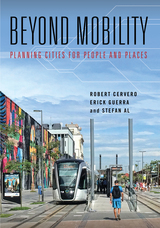 Beyond Mobility: Planning Cities for People and Places
Robert Cervero, Erick Guerra, and Stefan Al
Island Press, 2017 Cities across the globe have been designed with a primary goal of moving people around quickly—and the costs are becoming ever more apparent. The consequences are measured in smoggy air basins, sprawling suburbs, unsafe pedestrian environments, and despite hundreds of billions of dollars in investments, a failure to stem traffic congestion. Every year our current transportation paradigm generates more than 1.25 million fatalities directly through traffic collisions. Worldwide, 3.2 million people died prematurely in 2010 because of air pollution, four times as many as a decade earlier. Instead of planning primarily for mobility, our cities should focus on the safety, health, and access of the people in them.
Beyond Mobility is about prioritizing the needs and aspirations of people and the creation of great places. This is as important, if not more important, than expediting movement. A stronger focus on accessibility and place creates better communities, environments, and economies. Rethinking how projects are planned and designed in cities and suburbs needs to occur at multiple geographic scales, from micro-designs (such as parklets), corridors (such as road-diets), and city-regions (such as an urban growth boundary). It can involve both software (a shift in policy) and hardware (a physical transformation). Moving beyond mobility must also be socially inclusive, a significant challenge in light of the price increases that typically result from creating higher quality urban spaces.
There are many examples of communities across the globe working to create a seamless fit between transit and surrounding land uses, retrofit car-oriented suburbs, reclaim surplus or dangerous roadways for other activities, and revitalize neglected urban spaces like abandoned railways in urban centers.
The authors draw on experiences and data from a range of cities and countries around the globe in making the case for moving beyond mobility. Throughout the book, they provide an optimistic outlook about the potential to transform places for the better. Beyond Mobility celebrates the growing demand for a shift in global thinking around place and mobility in creating better communities, environments, and economies.
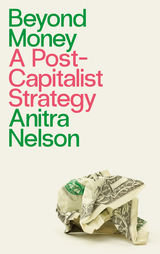 Beyond Money: A Postcapitalist Strategy
Anitra Nelson
Pluto Press, 2022 'A fascinating portal into arguments about why we need to get beyond money' - Harry Cleaver
What would a world without money look like? This book is a lively thought experiment that deepens our understanding of how money is the driver of political power, environmental destruction and social inequality today, arguing that it has to be abolished rather than repurposed to achieve a postcapitalist future.
Grounded in historical debates about money, Anitra Nelson draws on a spectrum of political and economic thought and activism, including feminism, ecoanarchism, degrowth, permaculture, autonomism, Marxism and ecosocialism. Looking to Indigenous rights activism and the defense of commons, an international network of activists engaged in a fight for a money-free society emerges.
Beyond Money shows that, by organizing around post-money versions of the future, activists have a hope of creating a world that embodies their radical values and visions.
 Beyond Money: A Postcapitalist Strategy
Anitra Nelson
Pluto Press, 2022 'A fascinating portal into arguments about why we need to get beyond money' - Harry Cleaver
What would a world without money look like? This book is a lively thought experiment that deepens our understanding of how money is the driver of political power, environmental destruction and social inequality today, arguing that it has to be abolished rather than repurposed to achieve a postcapitalist future.
Grounded in historical debates about money, Anitra Nelson draws on a spectrum of political and economic thought and activism, including feminism, ecoanarchism, degrowth, permaculture, autonomism, Marxism and ecosocialism. Looking to Indigenous rights activism and the defense of commons, an international network of activists engaged in a fight for a money-free society emerges.
Beyond Money shows that, by organizing around post-money versions of the future, activists have a hope of creating a world that embodies their radical values and visions.
 Beyond Monopoly: Lawyers, State Crises, and Professional Empowerment
Terence C. Halliday
University of Chicago Press, 1987 How do professional associations build their resources and establish authroity? What are the conditions under which professional expertise can be mobilized for political action? If professional organizations are endowed with a wealth of resources, do they use them responsibly or only for economic monopoly? What is the potential scope of professional action today?
In this pathbreaking study of the legal profession, Terence Halliday raises and addresses these questions combining extensive data from the rich archives o the Chicago Bar Association, one of the nation's largest and wealthiest bar organizations, with data from a national survey of bar legislative and judicial action. Beyond Monopoly demonstrates that the primary commitment of lawyers to economic monopoly has long been complemented by "civic professionalism" as the legal profession takes on more responsibility in the American democratic system when state capabilities diminish.
Through his examination of three types of state crises in the 1950s and 1960s—the challenges to legitimacy in the legal system, the crisis of individual rights during McCarthyism and the civil rights eras, and the fiscal crises of various state governments—Halliday shows that large bar associations can have extensive influence on any institution that is regulated by law. He argues that lawyers have the capability of turning social and political issues into technical legal matters in what he calls an "idiom of legalism." Under technical guise, lawyers come to exercise moral authority.
Halliday maintains that the American legal profession over the past century has gone from a formative stage, when controlling its market in the delivery of legal services was paramount, to an established phase in the past two decades, when it has committed extensive resources to the complex needs of the modern state. A de facto bargain has been struck: if the state leaves the profession's monopoly fairly intact, the profession can use its expert resources to help the state adapt to strain and crisis. It can do so not only in the legal system, where it has been championing "autonomous" law, but in other spheres as well—from the economy to the private sphere of individual rights.
Halliday confirms that the legal profession deploys its expertise not merely to attain professional dominance, to control a market, or to purvey an ideology, but to increase the viability of democratic institutions. Beyond Monopoly introduces a pioneering approach to a historical and comparative sociology of the professions that will be of vital interest not only to sociologists, but to political scientists and lawyers as well.
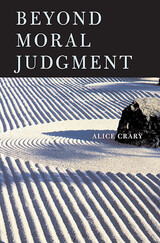 Beyond Moral Judgment
Alice Crary
Harvard University Press, 2009 What is moral thought and what kinds of demands does it impose? Alice Crary’s Beyond Moral Judgment claims that even the most perceptive contemporary answers to these questions offer no more than partial illumination, owing to an overly narrow focus on judgments that apply moral concepts (for example, “good,” “wrong,” “selfish,” “courageous”) and a corresponding failure to register that moral thinking includes more than such judgments.
Drawing on what she describes as widely misinterpreted lines of thought in the writings of Wittgenstein and J. L. Austin, Crary argues that language is an inherently moral acquisition and that any stretch of thought, without regard to whether it uses moral concepts, may express the moral outlook encoded in a person’s modes of speech. She challenges us to overcome our fixation on moral judgments and direct attention to responses that animate all our individual linguistic habits. Her argument incorporates insights from McDowell, Wiggins, Diamond, Cavell, and Murdoch and integrates a rich set of examples from feminist theory as well as from literature, including works by Jane Austen, E. M. Forster, Tolstoy, Henry James, and Theodor Fontane. The result is a powerful case for transforming our understanding of the difficulty of moral reflection and of the scope of our ethical concerns.
 Beyond Mosque, Church, and State: Alternative Narratives of the Nation in the Balkans
Yana Hashamova
Central European University Press, 2016 Journalists and policy-makers in the West have often assumed that the religious and ethno-national heterogeneity of the Balkans is the underlying reason for the numerous problems the area has faced throughout the twentieth century. The multiple and turbulent political transitions in the area, the dynamics of the interaction between Christianity and Islam, the contradictory and constantly shifting nationality policies, and the fluctuating identities of the diverse populations continue to be seen as major challenges to the stability of the region. By exploring the development of intricate religious, linguistic, and national dynamics in a variety of case studies throughout the Balkans, this volume demonstrates the existence of alternatives and challenges to nationalism in the area. The authors analyze a variety of national, non-national, and anti-national(ist) encounters in four areas—Bosnia, Bulgaria, Macedonia, and Albania—traditionally seen as “hot-beds” of nationalist agitation and tension resulting from their populations' religious or ethno-national diversity. In their entirety, the contributions in this volume chart a more complex picture of the national dynamics. The authors recognize the existence of national tensions both in historical perspective and in contemporary times, but also suggest the possibility of different paths to the nation that did not involve violence but allowed for national accommodation and reconciliation.
 Beyond Nationalization: The Labor Problems of British Coal
George B. Baldwin
Harvard University Press This book is an interim report on how the human problems of the British coal industry are handled under nationalization—one of the classic experiments in governmental control of a great industry. The book makes clear why the future progress of the industry will depend on the solution of specific labor problems regardless of the system of ownership or which political party may control the government or the Coal Board.
The main body of the book consists of case studies of nine key problems: union structure, collective bargaining, joint consultation, absenteeism, labor supply, wage structure, methods of wage payment, labor’s attitudes toward technological change, and the relocation of labor in the Scottish coalfield. The exploration of these problems is based on many pit visits, attendance at union meetings and conventions, innumerable discussions with union and Coal Board officials at all levels, and wide familiarity with the extensive literature on the industry. As a result of the extensive amount of field work done by the author, the book contains much new material not published elsewhere.
Of particular interest are the detailed, realistic accounts of mining operations in a typical British pit, and the description and analysis of incentive wage systems and the effect on these of technological change. The analysis of handling union recognition, the problem of break-away groups, and provisions for union security are treated with detail not otherwise available. The book shows the impact of nationalization upon the structure and operation of the National Union of Mineworkers and the adjustments in management of the coal pits. Explicit comparisons between British and American labor relations practices should interest students in both countries.
For students of British labor relations or coal industry specialists, this book will be a valuable reference, and it will be of special interest to anyone investigating the claim of the socialists that they could make a unique contribution to the solution of labor problems.
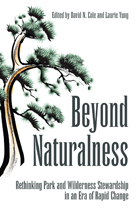 Beyond Naturalness: Rethinking Park and Wilderness Stewardship in an Era of Rapid Change
Edited by David N. Cole and Laurie Yung
Island Press, 2010 The central concept guiding the management of parks and wilderness over the past century has been “naturalness”—to a large extent the explicit purpose in establishing these special areas was to keep them in their “natural” state. But what does that mean, particularly as the effects of stressors such as habitat fragmentation, altered disturbance regimes, pollution, invasive species, and climate change become both more pronounced and more pervasive?
Beyond Naturalness brings together leading scientists and policymakers to explore the concept of naturalness, its varied meanings, and the extent to which it provides adequate guidance regarding where, when, and how managers should intervene in ecosystem processes to protect park and wilderness values. The main conclusion is the idea that naturalness will continue to provide an important touchstone for protected area conservation, but that more specific goals and objectives are needed to guide stewardship.
The issues considered in Beyond Naturalness are central not just to conservation of parks, but to many areas of ecological thinking—including the fields of conservation biology and ecological restoration—and represent the cutting edge of discussions of both values and practice in the twenty-first century. This bookoffers excellent writing and focus, along with remarkable clarity of thought on some of the difficult questions being raised in light of new and changing stressors such as global environmental climate change.
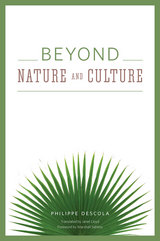 Beyond Nature and Culture
Philippe Descola
University of Chicago Press, 2013 Philippe Descola has become one of the most important anthropologists working today, and Beyond Nature and Culture has been a major influence in European intellectual life since its French publication in 2005. Here, finally, it is brought to English-language readers. At its heart is a question central to both anthropology and philosophy: what is the relationship between nature and culture?
Culture—as a collective human making, of art, language, and so forth—is often seen as essentially different from nature, which is portrayed as a collective of the nonhuman world, of plants, animals, geology, and natural forces. Descola shows this essential difference to be, however, not only a specifically Western notion, but also a very recent one. Drawing on ethnographic examples from around the world and theoretical understandings from cognitive science, structural analysis, and phenomenology, he formulates a sophisticated new framework, the “four ontologies”— animism, totemism, naturalism, and analogism—to account for all the ways we relate ourselves to nature. By thinking beyond nature and culture as a simple dichotomy, Descola offers nothing short of a fundamental reformulation by which anthropologists and philosophers can see the world afresh.
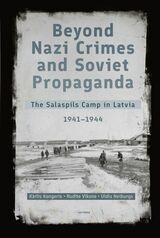 Beyond Nazi Crimes and Soviet Propaganda: The Salaspils Camp in Latvia, 1941-1944
Karlis Kangeris
Central European University Press, 2025 The Salaspils camp near Riga, which was operated during the Nazi occupation of Latvia, has long been the subject ofcontrovery. Around 23,000 people were imprisoned there: half were political prisoners, labor resisters and convicted soldiers, the rest prisoners from special operations against civilians in Belarus, Russia and the Latgale region of Latvia. The death toll in the camp, including the number of Jews who died during construction, is well over 3,000 people. Despite the relatively small size of this camp, it became a model for Russian remembrance policy. Soviet propaganda claimed that up to 100,000 prisoners were killed there, charged that children were used to extract blood, and greatly exaggerated the extent of the persecution of imprisoned lawbreakers and political dissidents . Salaspils became a myth in Russian-speaking society in Latvia that served to reinforce Soviet narratives of the “Great Patriotic War.” The three authors drew on sources from the archives of Latvia, Germany and Russia and critically analyzed oral testimonies and earlier research to create a comprehensive account of the Salaspils camp in Nazi-occupied Latvia. Their book furthers the understanding of processes of deformation of collective memory and the techniques of memory politics from the Cold War to the present.
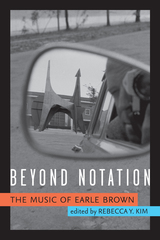 Beyond Notation: The Music of Earle Brown
Rebecca Y. Kim, Editor
University of Michigan Press, 2017 Earle Brown (1926–2002) was a crucial part of a group of experimental composers known as the New York School, and his music intersects in fascinating ways with that of his colleagues John Cage, Morton Feldman, and Christian Wolff. This book seeks to expand our view of Brown’s work by exploring his practices as a composer and draughtsman through a selection of works composed in the United States and Europe, which included a seminal collaboration with sculptor Alexander Calder. These essays detail Brown’s compositional methods in historical context: not only his influential experiments with open form composition and graphic notation, but his interest in performance, mixed media, jazz, the Schillinger system, and his engagement with the European avant-garde. The volume also includes never before published essays by Brown that shed new light on his relationships with colleagues and the ideas that shaped his work, in addition to several color photographs of Brown’s paintings.
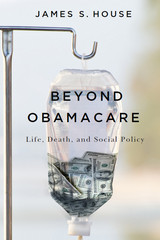 Beyond Obamacare: Life, Death, and Social Policy
James S. House is Angus Campbell Distinguished University Professor Emeritus of Survey Research, Public Policy, and Sociology at the University of Michigan, Ann Arbor.
Russell Sage Foundation, 2015 Health care spending in the United States today is approaching 20 percent of GDP, yet levels of U.S. population health have been declining for decades relative to other wealthy and even some developing nations. How is it possible that the United States, which spends more than any other nation on health care and insurance, now has a population markedly less healthy than those of many other nations? Sociologist and public health expert James S. House analyzes this paradoxical crisis, offering surprising new explanations for how and why the United States has fallen into this trap. In Beyond Obamacare, House shows that health care reforms, including the Affordable Care Act, cannot resolve this crisis because they do not focus on the underlying causes for the nation’s poor health outcomes, which are largely social, economic, environmental, psychological, and behavioral. House demonstrates that the problems of our broken health care and insurance system are interconnected with our large and growing social disparities in education, income, and other conditions of life and work, and calls for a complete reorientation of how we think about health. He concludes that we need to move away from our misguided and almost exclusive focus on biomedical determinants of health, and to place more emphasis on addressing social, economic, and other inequalities. House’s review of the evidence suggests that the landmark Affordable Care Act of 2010, and even universal access to health care, are likely to yield only marginal improvements in population health or in reducing health care expenditures. In order to rein in spending and improve population health, we need to refocus health policy from the supply side—which makes more and presumably better health care available to more citizens—to the demand side—which would improve population health though means other than health care and insurance, thereby reducing need and spending for health care. House shows how policies that provide expanded educational opportunities, more and better jobs and income, reduced racial-ethnic discrimination and segregation, and improved neighborhood quality enhance population health and quality of life as well as help curb health spending. He recommends redirecting funds from inefficient supply-side health care measures toward broader social initiatives focused on education, income support, civil rights, housing and neighborhoods, and other reforms, which can be paid for from savings in expenditures for health care and insurance. A provocative reconceptualization of health in America, Beyond Obamacare looks past partisan debates to show how cost-efficient and effective health policies begin with more comprehensive social policy reforms.
 Beyond Occupation: Apartheid, Colonialism and International Law in the Occupied Palestinian Territories
Edited by Virginia Tilley
Pluto Press, 2012 Beyond Occupation looks at three contentious terms that regularly arise in contemporary arguments about Israel's practices towards Palestinians in the occupied territories – occupation, colonialism and apartheid – and considers whether their meanings in international law truly apply to Israel's policies. This analysis is timely and urgent – colonialism and apartheid are serious breaches of human rights law and apartheid is a crime against humanity under the Rome Statute of the International Criminal Court.
The contributors present conclusive evidence that Israel’s administration of the Palestinian territories is consistent with colonialism and apartheid, as these regimes are defined in human rights law. Their analysis further shows that these practices are deliberate Israeli state policies, imposed on the Palestinian civilian population under military occupation.
These findings raise serious implications for the legality and legitimacy of Israel's continuing occupation of the Palestinian territories and the responsibility of the entire international community to challenge practices considered contrary to fundamental values of the international legal order.
 Beyond Optimizing: A Study of Rational Choice
Michael Slote
Harvard University Press, 1989 Philosophy, economics, and decision theory have long been dominated by the idea that rational choice consists of seeking or achieving one’s own greatest good. Beyond Optimizing argues that our ordinary understanding of practical reason is more complex than this, and also that optimizing/maximizing views are inadequately supported by the considerations typically offered in their favor.
Michael Slote challenges the long-dominant conception of individual rationality, which has to a large extent shaped the very way we think about the essential problems and nature of rationality, morality, and the relations between them. He contests the accepted view by appealing to a set of real-life examples, claiming that our intuitive reaction to these examples illustrates a significant and prevalent, if not always dominant, way of thinking. Slote argues that common sense recognizes that one can reach a point where “enough is enough,” be satisfied with what one has, and, hence, rationally decline an optimizing alternative. He suggests that, in the light of common sense, optimizing behavior is often irrational. Thus, Slote is not merely describing an alternative mode of rationality; he is offering a rival theory. And the numerous parallels he points out between this common-sense theory of rationality and common-sense morality are then shown to have important implications for the long-standing disagreement between commonsense morality and utilitarian consequentialism.
Beyond Optimizing is notable for its use of a much richer vocabulary of criticism than optimizing/maximizing models ever call upon. And it further argues that recent empirical investigations of the development of altruism and moral motivation need to be followed up by psychological studies of how moderation, and individual rationality more generally, take shape within developing individuals.
Beyond Ourselves: Contemporary Poets on Muriel Rukeyser
Catherine Gander
West Virginia University Press, 2026 This groundbreaking collection gathers essays, poems, and hybrid works from contemporary poets who engage in the legacy of Muriel Rukeyser (1913-1980) and her enduring influence as a poet, activist, and innovator who bridged art and social life, emphasizing that poetry was at the heart of her life and politics.
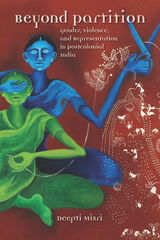 Beyond Partition: Gender, Violence and Representation in Postcolonial India
Deepti Misri
University of Illinois Press, 2014 Communal violence, ethnonationalist insurgencies, terrorism, and state violence have marred the Indian natio- state since its inception. These phenomena frequently intersect with prevailing forms of gendered violence complicated by caste, religion, regional identity, and class within communities. Deepti Misri shows how Partition began a history of politicized animosity associated with the differing ideas of ""India"" held by communities and in regions on one hand, and by the political-military Indian state on the other. She moves beyond that formative national event, however, in order to examine other forms of gendered violence in the postcolonial life of the nation, including custodial rape, public stripping, deturbanning, and enforced disappearances. Assembling literary, historiographic, performative, and visual representations of gendered violence against women and men, Misri establishes that cultural expressions do not just follow violence but determine its very contours, and interrogates the gendered scripts underwriting the violence originating in the contested visions of what ""India"" means. Ambitious and ranging across disciplines, Beyond Partition offers both an overview of and nuanced new perspectives on the ways caste, identity, and class complicate representations of violence, and how such representations shape our understandings of both violence and India.
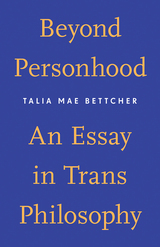 Beyond Personhood: An Essay in Trans Philosophy
Talia Mae Bettcher
University of Minnesota Press, 2025 A bold intervention in the philosophical concepts of gender, sex, and self
Beyond Personhood provides an entirely new philosophical approach to trans experience, trans oppression, gender dysphoria, and the relationship between gender and identity. Until now, trans experience has overwhelmingly been understood in terms of two reductive frameworks: trans people are either “trapped in the wrong body” or they are oppressed by the gender binary. Both accounts misgender large trans constituencies while distorting their experience, and neither can explain the presentation of trans people as make-believers and deceivers or the serious consequences thereof. In Beyond Personhood, Talia Mae Bettcher demonstrates how taking this phenomenon seriously affords a new perspective on trans oppression and trans dysphoria—one involving liminal states of “make-believe” that bear positive possibilities for self-recognition and resistance. Undergirding this account is Bettcher’s groundbreaking theory of interpersonal spatiality—a theory of intimacy and distance that requires rejection of the philosophical concepts of person, self, and subject. She argues that only interpersonal spatiality theory can successfully explain trans oppression and gender dysphoria, thus creating new possibilities for thinking about connection and relatedness. An essential contribution to the burgeoning field of trans philosophy, Beyond Personhood offers an intersectional trans feminism that illuminates transphobic, sexist, heterosexist, and racist oppressions, situating trans oppression and resistance within a much larger decolonial struggle. By refusing to separate theory from its application, Bettcher shows how a philosophy of depth can emerge from the everyday experiences of trans people, pointing the way to a reinvigoration of philosophy.
 Beyond Plagiarism: Transforming Pedagogy to Help Students Write with Sources
Kenny Harsch and Betsy Gilliland
University of Michigan Press, 2025 When academia treats plagiarism as a right-or-wrong issue, university students are expected to already understand how to avoid this act of academic dishonesty. However, source use is filled with complexities, and student plagiarism is often connected to student struggles with the subtleties of academic writing. Scholarly work that involves incorporation of sources is, in fact, a complex network of processes. Beyond Plagiarism offers a pedagogical approach to plagiarism that is intended to help instructors, administrators, and advisors address plagiarism and mentor students’ understanding of these processes and their development as academic writers and scholars.
Starting with an overview of the complexities underlying plagiarism and source use, the book offers practical tools that teachers can integrate in their classes. These tools include examples of modifications to syllabi; integrating processes into assignment design, classroom support, and feedback and grading; meta-texts to guide student reflection on their use of sources; explanations of why source use is important in academic writing; guiding students through learning how to read for writing, analyze genres to better understand expectations, and practice paraphrasing, summarizing, and quoting in their own assignments; approaching AI tools strategically; and modeling successful strategies for each step of the scholarly process. By taking a pedagogical approach, expert members of the academic community can help students understand how academic writing builds on and incorporates sources, provide support for students to learn to do these things through a process approach, and respond to situations of plagiarism with nuance, compassion, and a growth mindset.
Beyond Pluralism: The Conception of Groups and Group Identities in America
Edited by Wendy F. Katkin, Ned Landsman, and Andrea Tyree
University of Illinois Press, 1998 Pluralist or multiculturalist, proudly ethnic or disappearing into the
melting pot, people come in all persuasions. This volume attempts to bridge
the gap that has developed between pluralists and multiculturalists, advocates
of the academic canon and defenders of diversity, celebrants of ethnic
heritage and critics of racial ascription. Contributors explore the nation's
pluralistic framework as a historical creation, looking at group relations
in the United States and how they have been conceptualized in the past.
 Beyond Polarization: Public Process and the Unlikely Story of California's Marine Protected Areas
Steven L. Yaffee
Island Press, 2020 In a time when the United States is divided and positive collective action feels out of our grasp, Beyond Polarization tells a story of hope and hard work. That story goes back to 1999, when California passed a landmark piece of legislation to establish a system of marine protected areas off its coast that would safeguard miles of fragile ocean resources. After a contentious ten-year public process, establishment of a network of 124 protected areas was considered nothing short of miraculous. As important as this achievement was, the legacy it left was even more enduring: a blueprint for successful public policy that can be replicated elsewhere. What lessons can we draw?
California’s experience provides a rare opportunity to learn from a collaborative public process involving private interests and science-intensive decisions. Determined to do just that, Steven Yaffee, a renowned expert on negotiation and collaborative decision making, spent hundreds of hours researching the MLPA process in an effort to understand how California succeeded where other efforts have failed. The result is Beyond Polarization, a highly readable insider’s perspective on complicated decision-making processes and the strategic choices necessary for success. The book follows the initiative process region by region, each with its unique stakeholders and geographic concerns. These lessons can be applied to similar collaborative processes across the country and world.
Beyond Polarization presents an optimistic message about the public policy process in a time of civic division. It offers reassurance that, by using proven decision-making processes, policymakers, scientists, and local citizens can successfully collaborate to manage and protect natural resources we all have a stake in.
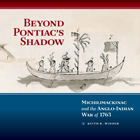 Beyond Pontiac's Shadow: Michilimackinac and the Anglo-Indian War of 1763
Keith R. Widder
Michigan State University Press, 2013 On June 2, 1763, the Ojibwe captured Michigan’s Fort Michilimackinac from the British. Ojibwe warriors from villages on Mackinac Island and along the Cheboygan River had surprised the unsuspecting garrison while playing a game of baggatiway. On the heels of the capture, Odawa from nearby L’Arbre Croche arrived to rescue British prisoners, setting into motion a complicated series of negotiations among Ojibwe, Odawa, and Menominee and other Indians from Wisconsin. Because nearly all Native people in the Michilimackinac borderland had allied themselves with the British before the attack, they refused to join the Michilimackinac Ojibwe in their effort to oust the British from the upper country; the turmoil effectively halted the fur trade. Beyond Pontiac’s Shadow examines the circumstances leading up to the attack and the course of events in the aftermath that resulted in the regarrisoning of the fort and the restoration of the fur trade. At the heart of this discussion is an analysis of French-Canadian and Indian communities at the Straits of Mackinac and throughout the pays d’en haut. An accessible guide to this important period in Michigan, American, and Canadian history, Beyond Pontiac’s Shadow sheds invaluable light on a political and cultural crisis.
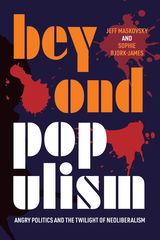 Beyond Populism: Angry Politics and the Twilight of Neoliberalism
Jeff Maskovsky
West Virginia University Press, 2020 Across the world, politics is lurching to the right, ethnic nationalism is on the rise, and people are furious. Beyond Populism critically examines the new destructive projects of resentment that have surfaced in the political spaces opened by neoliberalism’s failures, particularly since the financial collapse of 2008. It contextualizes the recent history of the Global North—notably Brexit and the Trump election—among wider comparative politics, with chapters on India, Colombia, Eastern Europe, the Philippines, Ethiopia, and other parts of the globe marked by populist insurgencies. The essays collected here explore how global, regional, national, and local structures of power produce angry politics. They go beyond conventional academic debates about populism to explore the different kinds of anger that shape politics today and to make legible the multiplicity of forces, antagonisms, conflicts, and emergent political forms that mark the present. By examining the politics of anger, Beyond Populism also considers what is needed to transform anger from a reactionary to an emancipatory force.
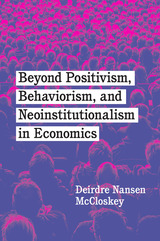 Beyond Positivism, Behaviorism, and Neoinstitutionalism in Economics
Deirdre Nansen McCloskey
University of Chicago Press, 2022 A penetrating analysis from one of the defining voices of contemporary economics.
In Beyond Positivism, Behaviorism, and Neoinstitutionalism in Economics, Deirdre Nansen McCloskey zeroes in on the authoritarian cast of recent economics, arguing for a re-focusing on the liberated human. The behaviorist positivism fashionable in the field since the 1930s treats people from the outside. It yielded in Williamson and North a manipulative neo-institutionalism. McCloskey argues that institutions as causes are mainly temporary and intermediate, not ultimate. They are human-made, depending on words, myth, ethics, ideology, history, identity, professionalism, gossip, movies, what your mother taught you. Humans create conversations as they go, in the economy as in the rest of life.
In engaging and erudite prose, McCloskey exhibits in detail the scientific failures of neo-institutionalism. She proposes a “humanomics,” an economics with the humans left in. Humanomics keeps theory, quantification, experiment, mathematics, econometrics, though insisting on more true rigor than is usual. It adds what can be learned about the economy from history, philosophy, literature, and all the sciences of humans. McCloskey reaffirms the durability of “market-tested innovation” against the imagined imperfections to be corrected by a perfect government. With her trademark zeal and incisive wit, she rebuilds the foundations of economics.
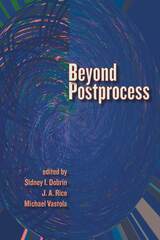 Beyond Postprocess
Sidney I. Dobrin, J.A. Rice, and Michael Vastola
Utah State University Press, 2011 Beyond Postprocess offers a vigorous, provocative discussion of postprocess theory in its contemporary profile. Fueled by something like a fundamental refusal to see writing as self-evident, reducible, and easily explicable, the contributors rethink postprocess, suggesting that there is no easily defined moment or method that could be called postprocess. Instead, each contribution to this collection provides a unique and important example of what work beyond postprocess could be.
Since postprocess theory in writing studies first challenged traditional conceptions of writing and the subject who writes, developments there have continued to push theorists of writing in a number of promising theoretical directions. Spaces for writing have arisen that radically alter ideological notions of space, rational thinking, intellectual property and politics, and epistemologies; and new media, digital, and visual rhetorics have increasingly complicated the scene, as well.
Contributors to Beyond Postprocess reconsider writing and writing studies through posthumanism, ecology, new media, materiality, multimodal and digital writing, institutional critique, and postpedagogy. Through the lively and provocative character of these essays, Beyond Postprocess aims to provide a critical site for nothing less than the broad reevaluation of what it means to study writing today. Its polyvocal considerations and conclusions invest the volume with a unique potential to describe not what that field of study should be, but what it has the capacity to create. The central purpose of Beyond Postprocess is to unleash this creative potential.
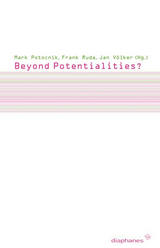 Beyond Potentialities?: Politics between the Possible and the Impossible
Edited by Mark Potocnik, Frank Ruda, and Jan Völker
Diaphanes, 2011 Nearly the whole history of political thought is spanned between two poles: one of founding, establishing, and justifying a stable and just order on one side and of justified transformation and necessary break with that same order on the other side. Between institution and emancipation, reform and revolution, the question of possibility is always arising for politics. Are there possibilities to change the order of society? Are there possibilities for a different justice? Where to find them and how to define them? Are they already present in the situation, or do they have to be actively created? Or does one have to rethink collective emancipation in a way that it does not rely upon given possibilities?
The question of possibility is raised in philosophy itself in different terms: as a question of potentiality and potentials but also as a question of the impossibilities of changing political order. In recent political discussions this question is more present than ever and is newly posed in fundamental ways by thinkers such as Agamben, Badiou, and Deleuze, or Lacan and Žižek. The present volume assembles articles that investigate this question and the new guise it took from different perspectives and highlight its relevance for contemporary political thought.
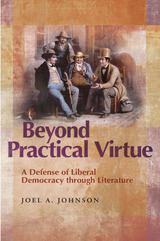 Beyond Practical Virtue: A Defense of Liberal Democracy through Literature
Joel A. Johnson
University of Missouri Press, 2007
Why hasn’t democracy been embraced worldwide as the best form of government?
Aesthetic critics of democracy such as Carlyle and Nietzsche have argued that modern democracy, by removing the hierarchical institutions that once elevated society’s character, turns citizens into bland, mediocre souls. Joel A. Johnson now offers a rebuttal to these critics, drawing surprising inspiration from American literary classics.
Addressing the question from a new perspective, Johnson takes a fresh look at the worth of liberal democracy in these uncertain times and tackles head-on the thorny question of cultural development. Examining the novels of James Fenimore Cooper, Mark Twain, and William Dean Howells, he shows that through their fiction we can gain a better appreciation of the rich detail of everyday life, making the debate relevant to contemporary discussions of liberal democracy.
Johnson focuses on an issue that liberals have inadequately addressed: whether people tend to develop fully as individuals under liberal democracy when such a regime does little formally to encourage their development. He argues that, though the liberal fear of state-guided culture is well founded, it should not prevent us from evaluating liberalism’s effect on individual flourishing. By extending the debate over the worthiness of liberal democracy to include democracy’s effect on individual development, he contends that the democratic experience is much fuller than the aristocratic one and thus expands the faculties of its citizens.
Critics of American democracy such as John Rawls have sought to transform it into a social or egalitarian democracy in the European style. Johnson shows that neither the debate between Rawls and his communitarian critics nor the ongoing discussion of the globalization of American values adequately addresses the fundamental critique of democratic culture advanced by the aesthetic critics. Johnson’s cogent analysis reaches out to those readers who are ready for a more comprehensive evaluation of liberal democracy, offering new insight into the relationship between the state and the individual while blazing new trails in the intersection of politics and literature.
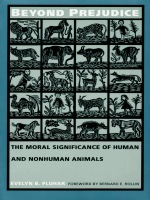 Beyond Prejudice: The Moral Significance of Human and Nonhuman Animals
Evelyn B. Pluhar
Duke University Press, 1995 In Beyond Prejudice, Evelyn B. Pluhar defends the view that any sentient conative being—one capable of caring about what happens to him or herself—is morally significant, a view that supports the moral status and rights of many nonhuman animals. Confronting traditional and contemporary philosophical arguments, she offers in clear and accessible fashion a thorough examination of theories of moral significance while decisively demonstrating the flaws in the arguments of those who would avoid attributing moral rights to nonhumans.
Exposing the traditional view—which restricts the moral realm to autonomous, fully fledged "persons"—as having horrific implications for the treatment of many humans, Pluhar goes on to argue positively that sentient individuals of any species are no less morally significant than the most automomous human. Her position provides the ultimate justification that is missing from previous defenses of the moral status of nonhuman animals. In the process of advancing her position, Pluhar discusses the implications of determining moral significance for children and "abnormal" humans as well as its relevance to population policies, the raising of animals for food or product testing, decisions on hunting and euthanasia, and the treatment of companion animals. In addition, the author scrutinizes recent assertions by environmental ethicists that all living things or that natural objects and ecosystems be considered highly morally significant. This powerful book of moral theory challenges all defenders of the moral status quo—which decrees that animals decidedly do not count—to reevaluate their convictions.
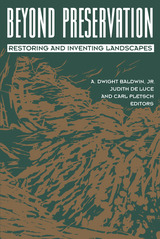 Beyond Preservation: Restoring and Inventing Landscapes
Dwight Baldwin
University of Minnesota Press, 1994 Beyond Preservation was first published in 1993. Minnesota Archive Editions uses digital technology to make long-unavailable books once again accessible, and are published unaltered from the original University of Minnesota Press editions. Addressing current ecological issues, from the philosophical to the practical, Frederick Turner and William R. Jordan III Here offer a new paradigm for understanding the relationship between the humans and nature. Challenging the idea that preserving nature is the only solution to environmental problems, they advocate going beyond preservation to restoration and actual construction of our landscape. Fifteen respondents reflect on the implications and consequences of Turner’s and Jordan’s bold proposals.“Ecological restoration is the most helpful and provocative contribution to our thinking about nature to come along in many years, and Beyond Preservation is without a doubt the best book on the subject to date.” Michael Polan, Harper’sContributors include Gary W. Barrett, Ann Cline, David L. Gorchov, William Jordan III, G. Stanley Kane, Jack Temple Kirby, Dora G. Lodwick, Orie L. Loucks, Kimberly E. Medley, Constance Pierce, Ellen Price, Frederick Turner, John E. Wierwille, and Gene E. Willeke.
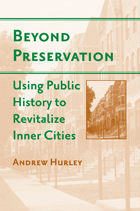 Beyond Preservation: Using Public History to Revitalize Inner Cities
Authored by Andrew Hurley
Temple University Press, 2010 Across the United States, historic preservation has become a catalyst for urban regeneration. Entrepreneurs, urban pioneers, and veteran city dwellers have refurbished thousands of dilapidated properties and put them to productive use as shops, restaurants, nightclubs, museums, and private residences. As a result, inner-cities, once disparaged as zones of poverty, crime, and decay have been re-branded as historic districts. Although these preservation initiatives, often supported by government tax incentives and rigid architectural controls, deserve credit for bringing people back to the city, raising property values, and generating tourist revenue, they have been less successful in creating stable and harmonious communities. Beyond Preservation proposes a framework for stabilizing and strengthening inner-city neighborhoods through the public interpretation of historic landscapes. Its central argument is that inner-city communities can best turn preserved landscapes into assets by subjecting them to public interpretation at the grass-roots. Based on an examination of successful projects in St. Louis, Missouri and other U.S. cities, Andrew Hurley demonstrates how rigorous historical analysis can help communities articulate a local identity and plan intelligently on the basis of existing cultural and social assets.
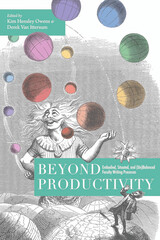 Beyond Productivity: Embodied, Situated, and (Un)Balanced Faculty Writing Processes
Kim Hensley Owens
Utah State University Press, 2023 In Beyond Productivity, a wide range of contributors share honest narratives of the sometimes-impossible conditions that scholars face when completing writing projects. The essays provide backstage views of the authors' varying approaches to moving forward when the desire to produce wanes, when deciding a project is not working, when working within and around and redefining academic productivity expectations, and when writing with ever-changing bodies that do not always function as expected.
This collection positions scholarly writers' ways of writing as a form of flexible, evolving knowledge. By exhibiting what is lost and gained through successive rounds of transformation and adaptation over time, the contributors offer a sustainable understanding and practice of process—one that looks beyond productivity as the primary measure of success. Each presents a fluid understanding of the writing process, illustrating its deeply personal nature and revealing how fragmented and disjointed methods and experiences can highlight what is precious about writing.
Beyond Productivity determines anew the use and value of scholarly writing and the processes that produce it, both within and beyond the context of the losses, constraints, and adaptations associated with the COVID-19 pandemic.
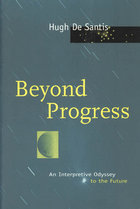 Beyond Progress: An Interpretive Odyssey to the Future
Hugh De Santis
University of Chicago Press, 1996 In this dynamic portrait of the human community as it enters the twenty-first century, Hugh De Santis argues that in a world of dwindling resources, economic inequality, and unremitting violence, the belief in endless progress can no longer be sustained.
Explaining that we have arrived at a great historic divide, De Santis asserts that the old modern order is giving way to an age of "mutualism." He draws on world history and the study of international relations to explore the emerging future, in which new forms of social and political identity and regional associations and alignments will be needed to solve global problems. Demonstrating that mutualism will require a dramatic change in the way states, international institutions, corporations, and local communities interact, De Santis argues that this transformation will be especially difficult for the United States, which will have to abandon its exceptionalist identity and rejoin a world it can no longer escape.
 Beyond Realism and Antirealism: John Dewey and the Neopragmatists
David L. Hildebrand
Vanderbilt University Press, 2003 Perhaps the most significant development in American philosophy in recent times has been the extraordinary renaissance of Pragmatism, marked most notably by the reformulations of the so-called "Neopragmatists" Richard Rorty and Hilary Putnam. With Pragmatism offering the allure of potentially resolving the impasse between epistemological realists and antirealists, analytic and continental philosophers, as well as thinkers across the disciplines, have been energized and engaged by this movement.
In Beyond Realism and Antirealism: John Dewey and the Neopragmatists, David L. Hildebrand asks two important questions: first, how faithful are the Neopragmatists' reformulations of Classical Pragmatism (particularly Deweyan Pragmatism)? Second, and more significantly, can their Neopragmatisms work?
In assessing Neopragmatism, Hildebrand advances a number of historical and critical points:
• Current debates between realists and antirealists (as well as objectivists and relativists) are similar to early twentieth-century debates between realists and idealists that Pragmatism addressed extensively.
• Despite their debts to Dewey, the Neopragmatists are reenacting realist and idealist stands in their debate over realism, thus giving life to something shown fruitless by earlier Pragmatists.
• What is absent from the Neopragmatist's position is precisely what makes Pragmatism enduring: namely, its metaphysical conception of experience and a practical starting point for philosophical inquiry that such experience dictates.
• Pragmatism cannot take the "linguistic turn" insofar as that turn mandates a theoretical starting point.
• While Pragmatism's view of truth is perspectival, it is nevertheless not a relativism.
• Pace Rorty, Pragmatism need not be hostile to metaphysics; indeed, it demonstrates how pragmatic instrumentalism and metaphysics are complementary.
In examining these and other difficulties in Neopragmatism, Hildebrand is able to propose some distinct directions for Pragmatism. Beyond Realism and Antirealism will provoke specialists and non-specialists alike to rethink not only the definition of Pragmatism, but its very purpose.
 Beyond Recognition: Transgender Antidiscrimination Law, Rhetoric, and Ethical Responsibility
Collins, Laura Jane
University of Alabama Press, 2026 A bold and original analysis of how the complexity of legal struggles over transgender rights is shaped not only by politics but by a deeper cultural anxiety about the meaning of sex itself. Beyond Recognition: Transgender Antidiscrimination Law, Rhetoric, and Ethical Responsibility is a timely analysis that challenges the idea of transgender antidiscrimination law as a simple matter of inclusion or exclusion. Far from treating the law as a straightforward recognition project, Laura Jane Collins employs a rhetorically responsive approach that reveals how legal systems both reflect and shape our deepest uncertainties about sex, identity, and justice. Through close readings of Title VII case law, state-level legislation such as California’s Fair Employment and Housing Act, and legislative debates surrounding bathroom access and trans rights, Collins exposes the deep-seated anxieties driving contemporary legal debates. While courts, policymakers, and advocates struggle to construct legal protections, the very act of defining sex within the law exposes law’s limitations. Rather than condemning the law’s failures or romanticizing its liberatory potential, Collins calls for a more self-reflective, ethically engaged response. She argues that our demand for legal clarity often conceals a broader discomfort with ambiguity—and that the law’s so-called shortcomings may in fact reflect our own refusal to confront the complexity of sex as a category and system of power. A vital contribution to scholarship in law and rhetoric, gender studies, and critical legal theory, Beyond Recognition invites a deeper reckoning with both legal frameworks and personal responsibility. It offers a compelling perspective on the evolving landscape of transgender rights and the cultural anxieties that continue to shape it.
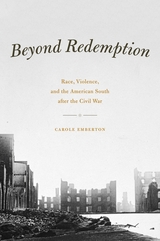 Beyond Redemption: Race, Violence, and the American South after the Civil War
Carole Emberton
University of Chicago Press, 2013 In the months after the end of the Civil War, there was one word on everyone’s lips: redemption. From the fiery language of Radical Republicans calling for a reconstruction of the former Confederacy to the petitions of those individuals who had worked the land as slaves to the white supremacists who would bring an end to Reconstruction in the late 1870s, this crucial concept informed the ways in which many people—both black and white, northerner and southerner—imagined the transformation of the American South. Beyond Redemption explores how the violence of a protracted civil war shaped the meaning of freedom and citizenship in the new South. Here, Carole Emberton traces the competing meanings that redemption held for Americans as they tried to come to terms with the war and the changing social landscape. While some imagined redemption from the brutality of slavery and war, others—like the infamous Ku Klux Klan—sought political and racial redemption for their losses through violence. Beyond Redemption merges studies of race and American manhood with an analysis of post-Civil War American politics to offer unconventional and challenging insight into the violence of Reconstruction.
 Beyond Reformation?: An Essay on William Langland's Piers Plowman and the End of Constantinian Christianty
David Aers
University of Notre Dame Press, 2015 In Beyond Reformation? An Essay on William Langland’s Piers Plowman and the End of Constantinian Christianity, David Aers presents a sustained and profound close reading of the final version of William Langland’s Piers Plowman, the most searching Christian poem of the Middle Ages in English. His reading, most unusually, seeks to explore the relations of Langland's poem to both medieval and early modern reformations together with the ending of Constantinian Christianity.
Aers concentrates on Langland’s extraordinarily rich ecclesiastic politics and on his account of Christian virtues and the struggles of Conscience to discern how to go on in his often baffling culture. The poem’s complex allegory engages with most institutions and forms of life. In doing so, it explores moral languages and their relations to current practices and social tendencies. Langland’s vision conveys a strange sense that in his historical moment some moral concepts were being transformed and some traditions the author cherished were becoming unintelligible. Beyond Reformation? seeks to show how Langland grasped subtle shifts that were difficult to discern in the fourteenth century but were to become forces with a powerful future in shaping Western Christianity.
The essay form that Aers has chosen for his book contributes to the effectiveness of the argument he develops in tandem with the structure of Langland’s poem: he sustains and tests his argument in a series of steps or “passus,” a Langlandian mode of proceeding. His essay unfolds an argument about medieval and early modern forms of Constantinian Christianity and reformation, and the way in which Langland's own vision of a secularizing, de-Christianizing late medieval church draws him toward the idea of a church of “fools,” beyond papacy, priesthood, hierarchy, and institutions. For Aers, Langland opens up serious diachronic issues concerning Christianity and culture. His essay includes a brief summary of the poem and modern translations alongside the original medieval English. It will challenge specialists on Langland's poem and supply valuable resources of thought for anyone who continues to struggle with the church of today.
“David Aers, as a master interpreter, shows us how he reads Langland and, while doing so, instructs us in how to read. His brilliant essay models for us how it is possible, and indeed desirable, to open the usually well-policed border between theological reflection and literary analysis and thereby aim at a fuller reading of what a life of faith encompasses. Along the way, we gain an appreciation of William Langland’s formidable Middle English epic masterpiece, Piers Plowman, and the riches it repays our careful attention.”
—James Wetzel, Augustinian Endowed Chair in the thought of St. Augustine and Professor of Philosophy, Villanova University
 Beyond Regimes: China and India Compared
Prasenjit Duara
Harvard University Press, 2018 For many years, China and India have been powerfully shaped by both transnational and subnational circulatory forces. This edited volume explores these local and global influences as they play out in the contemporary era. The analysis focuses on four intersecting topics: labor relations; legal reform and rights protest; public goods provision; and transnational migration and investment. The eight substantive chapters and introduction share a common perspective in arguing that distinctions in regime type (“democracy” versus “dictatorship”) alone offer little insight into critical differences and similarities between these Asian giants in terms of either policies or performance. A wide variety of subnational and transnational actors, from municipal governments to international organizations, and from local NGO activists to a far-flung diaspora, have been—and will continue to be—decisive.
The authors approach China and India through a strategy of “convergent comparison,” in which they investigate temporal and spatial parallels at various critical junctures, at various levels of the political system, and both inside and outside the territorial confines of the nation-state. The intensified globalization of recent decades only heightens the need to view state initiatives against such a wider canvas.
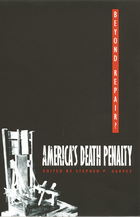 Beyond Repair?: America's Death Penalty
Stephen P. Garvey, ed.
Duke University Press, 2003 Can the death penalty be administered in a just way—without executing the innocent, without regard to race, and without arbitrariness? How does capital punishment in the United States fit with international human rights law? These are among the questions that leading legal scholars and journalists explore in Beyond Repair? All new, the essays in this collection focus on the period since 1976, when the Supreme Court held that capital punishment, in and of itself, does not violate the Constitution. In addition to reflecting on the most recent developments in the law, the contributors draw on empirical research to consider connections between newly available data and modern American death penalty procedures. A number of the essays scrutinize thinking about capital punishment. They examine why, following almost two decades of strong public support for the death penalty, public opinion in favor of it has recently begun to decline. Beyond Repair? presents some of the findings of the Capital Jury Project, a nationwide research initiative that has interviewed over one thousand people who served as jurors in capital trials. It looks at what goes through the minds of jurors asked to consider imposing the death penalty, how qualified they are to make such an important decision, and how well they understand the judge’s instructions. Contributors also investigate the risk of executing the innocent, the role that race plays in determining which defendants are sentenced to death, and the effect of expanded restrictions on access to federal appellate relief. The postscript contemplates the peculiarities of our contemporary system of capital punishment, including the alarming variance in execution rates from state to state. Filled with current insights and analysis, Beyond Repair? will provide valuable information to attorneys, political scientists, criminologists, and all those wanting to participate knowledgeably in the debates about the death penalty in America.
Contributors. Ken Armstrong, John H. Blume, Theodore Eisenberg, Phoebe C. Ellsworth, Stephen P. Garvey, Samuel R. Gross, Sheri Lynn Johnson, Steve Mills, William A. Schabas, Larry W. Yackle, Franklin E. Zimring
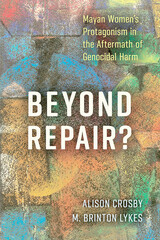 Beyond Repair?: Mayan Women’s Protagonism in the Aftermath of Genocidal Harm
Alison Crosby
Rutgers University Press, 2019 Winner of the 2021 Raphael Lemkin Book Award from the Institute for the Study of Genocide
Honorable Mention, 2020 CALACS Book Prize
Beyond Repair? explores Mayan women’s agency in the search for redress for harm suffered during the genocidal violence perpetrated by the Guatemalan state in the early 1980s at the height of the thirty-six-year armed conflict. The book draws on eight years of feminist participatory action research conducted with fifty-four Q’eqchi’, Kaqchikel, Chuj, and Mam women who are seeking truth, justice, and reparation for the violence they experienced during the war, and the women’s rights activists, lawyers, psychologists, Mayan rights activists, and researchers who have accompanied them as intermediaries for over a decade. Alison Crosby and M. Brinton Lykes use the concept of “protagonism” to deconstruct dominant psychological discursive constructions of women as “victims,” “survivors,” “selves,” “individuals,” and/or “subjects.” They argue that at different moments Mayan women have been actively engaged as protagonists in constructivist and discursive performances through which they have narrated new, mobile meanings of “Mayan woman,” repositioning themselves at the interstices of multiple communities and in their pursuit of redress for harm suffered.
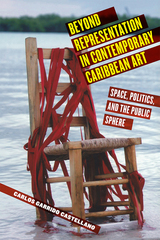 Beyond Representation in Contemporary Caribbean Art: Space, Politics, and the Public Sphere
Carlos Garrido Castellano
Rutgers University Press, 2019 The Caribbean has been traditionally associated with externally devised mappings and categories, thus appearing as a passive entity to be consumed and categorized. Challenging these forces and representations, Carlos Garrido Castellano argues that something more must be added to the discussion in order to address contemporary Caribbean visual creativity. Beyond Representation in Contemporary Caribbean Art arises from several years of field research and curatorial activity in museums, universities, and cultural institutions of Jamaica, Trinidad, Martinique, Guadeloupe, Cuba, Dominican Republic, Puerto Rico, and the United States. This book explores the ways in which Caribbean individuals and communities have recurred to art and visual creativity to create and sustain public spaces of discussion and social interaction. The book analyzes contemporary Caribbean art in relation to broader discussions of citizenship, cultural agency, critical geography, migration, and social justice. Covering a broad range of artistic projects, including curatorial practice, socially engaged art, institutional politics, public art, and performance, this book is about the imaginative ways in which Caribbean subjects and communities rearrange the sociocultural framework(s) they inhabit and share.
Beyond Respectability: The Intellectual Thought of Race Women
Brittney C. Cooper
University of Illinois Press, 2017 Beyond Respectability charts the development of African American women as public intellectuals and the evolution of their thought from the end of the 1800s through the Black Power era of the 1970s. Eschewing the Great Race Man paradigm so prominent in contemporary discourse, Brittney C. Cooper looks at the far-reaching intellectual achievements of female thinkers and activists like Anna Julia Cooper, Mary Church Terrell, Fannie Barrier Williams, Pauli Murray, and Toni Cade Bambara. Cooper delves into the processes that transformed these women and others into racial leadership figures, including long-overdue discussions of their theoretical output and personal experiences. As Cooper shows, their body of work critically reshaped our understandings of race and gender discourse. It also confronted entrenched ideas of how--and who--produced racial knowledge.
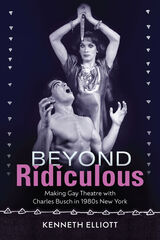 Beyond Ridiculous: Making Gay Theatre with Charles Busch in 1980s New York
Kenneth Elliott
University of Iowa Press, 2023 Beyond Ridiculous tells the story of Theatre-in-Limbo, a downtown band of actors formed in 1984 by director Kenneth Elliott and playwright and drag legend Charles Busch. They launched Vampire Lesbians of Sodom at the Limbo Lounge, a raffish club in the fringes of the East Village, but it would later become the longest-running non-musical in off-Broadway history. From 1984 to 1991, Busch starred in eight Limbo productions, always in outrageously fabulous drag.
In Beyond Ridiculous, Elliott narrates in first-person the company’s Cinderella tale of fun, heartbreak, and dishy drama. At the center of the book is a young Charles Busch, an unforgettable personality fighting to be seen, be heard, and express his unique style as a writer-performer in plays such as Psycho Beach Party and The Lady in Question. The tragedy of AIDS among treasured friends in the company, the struggle for mainstream acceptance of LGBTQ+ theatre during the reign of President Ronald Reagan, and the exploration of new ways of being a gay theatre artist make the book a bittersweet and joyous ride.
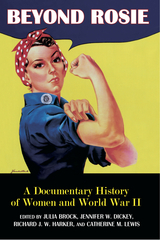 Beyond Rosie: A Documentary History of Women and World War II
Julia Brock
University of Arkansas Press, 2015 More so than any war in history, World War II was a woman’s war. Women, motivated by patriotism, the opportunity for new experiences, and the desire to serve, participated widely in the global conflict. Within the Allied countries, women of all ages proved to be invaluable in the fight for victory. Rosie the Riveter became the most enduring image of women’s involvement in World War II. What Rosie represented, however, is only a small portion of a complex story. As wartime production workers, enlistees in auxiliary military units, members of voluntary organizations or resistance groups, wives and mothers on the home front, journalists, and USO performers, American women found ways to challenge traditional gender roles and stereotypes.
Beyond Rosie offers readers an opportunity to see the numerous contributions they made to the fight against the Axis powers and how American women’s roles changed during the war. The primary documents (newspapers, propaganda posters, cartoons, excerpts from oral histories and memoirs, speeches, photographs, and editorials) collected here represent cultural, political, economic, and social perspectives on the diverse roles women played during World War II.
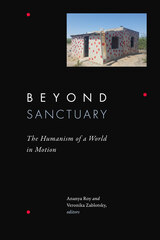 Beyond Sanctuary: The Humanism of a World in Motion
Ananya Roy and Veronika Zablotsky, editors
Duke University Press, 2025 The contributors to Beyond Sanctuary examine how the liberal democracies of the West recognize and include racial others through technologies of state power that promise but rarely grant sanctuary and refuge. Conceptualized at a time of resurgent white nationalism, this volume critically interrogates not only right-wing xenophobia but also the liberal ruse of asylum and its place in Western humanism. Drawing on the liberatory histories and countercartographies of migrant movements and the intellectual traditions of the Black radical tradition, Indigenous studies, postcolonial thought, and critical refugee studies, the contributors analyze the colonial-racial logics of humanitarian reason and its carceral geographies of camps and crossings. Whether analyzing guerrilla art projects that memorialize female migrants who died crossing the US-Mexico border, schools for undocumented students, housing solidarity movements in state-run camps in Greece, or transnational struggles for abolition, this collection foregrounds ideas and practices of fugitivity and freedom that refuse and reworld the West.
Contributors. Leisy Abrego, Damon Azali-Rojas, Amy Sara Carroll, Sharad Chari, Nicholas De Genova, Ricardo Dominguez, Lorgia García-Peña, Sarah Haley, Gaye Theresa Johnson, Moon-Kie Jung, Maria Kaika, Saree Makdisi, Kyle T. Mays, Ananya Roy, Charles Sepulveda, SA Smythe, Vanessa E. Thompson, Charalampos Tsavdaroglou, João H. Costa Vargas, Rinaldo Walcott, Veronika Zablotsky, Maite Zubiaurre
Beyond Segregation: Multiracial And Multiethnic Neighborhoods
Michael T. Maly
Temple University Press, 2005 At a time when cities appear to be fragmenting mosaics of ethnic enclaves, it is reassuring to know there are still stable multicultural neighborhoods. Beyond Segregation offers a tour of some of America's best known multiethnic neighborhoods: Uptown in Chicago, Jackson Heights (Queens), and San Antonio-Fruitvale in Oakland. Readers will learn the history of the neighborhoods and develop an understanding of the people that reside in them, the reasons they stay, and the work it takes to maintain each neighborhood as an affordable, integrated place to live.
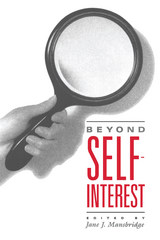 Beyond Self-Interest
Edited by Jane J. Mansbridge
University of Chicago Press, 1990 A dramatic transformation has begun in the way scholars think about human nature. Political scientists, psychologists, economists, and evolutionary biologists are beginning to reject the view that human affairs are shaped almost exclusively by self-interest—a view that came to dominate social science in the last three decades.
In Beyond Self-Interest, leading social scientists argue for a view of individuals behavior and social organization that takes into account the powerful motivations of duty, love, and malevolence. Economists who go beyond "economic man," psychologists who go beyond stimulus-response, evolutionary biologists who go beyond the "selfish gene," and political scientists who go beyond the quest for power come together in this provocative and important manifesto.
The essays trace, from the ancient Greeks to the present, the use of self-interest to explain political life. They investigate the differences between self-interest and the motivations of duty and love, showing how these motivations affect behavior in "prisoners' dilemma" interactions. They generate evolutionary models that explain how altruistic motivations escape extinction.
They suggest ways to model within one individual the separate motivations of public spirit and self-interest, investigate public spirit and self-interest, investigate public spirit in citizen and legislative behavior, and demonstrate that the view of democracy in existing Constitutional interpretations is not based on self-interest. They advance both human evil and mothering as alternatives to self-interest, this last in a penetrating feminist critique of the "contract" model of human interaction.
 Beyond September 11: An Anthology of Dissent
Edited by Phil Scraton
Pluto Press, 2002 The unprecedented and tragic events in New York, Washington and Pennsylvania left an indelible mark on world politics. Civilian deaths in horrific circumstances triggered an uncompromising response from the US administration and its allies: an open-ended 'war on terrorism'.
This anthology includes some of the world's leading commentators - Noam Chomsky, Robert Fisk, Naomi Klein, John Pilger, Paul Foot and A.Sivanandan. It presents accessible, detailed and often deeply personal accounts of the aftermath, the bombing of Afghanistan and the dubious claims for its legality. From investigative journalists to critical academics, human rights lawyers and anti-racist campaigners, the contributors are united in their opposition to military intervention in Afghanistan and beyond and to the attack on civil liberties in the US, the UK and Europe.
From the US and Canada, Herman and Julia Schwendinger, Jonathan Farley, Tony Platt, Cecilia O'Leary, Christian Parenti and Michael Mandel are among critical academics who assess the validity, lawfulness and political consequences of the Bush/Blair agenda. European based commentators include Martti Gronfors and Thomas Mathiesen.
Examining the the context and rhetoric of US vengeance -- ennobled by the symbolic title 'Enduring Freedom' -- they challenge political and popular definitions, constructions,pathologisation and reporting of terrorism. In questioning the representation of war as 'just', the anthology focuses on civilian deaths in Afghanistan, evidence of US/allied atrocities, violations of prisoners' rights and US determination to escalate military offensives, regardless of global destabilisation.
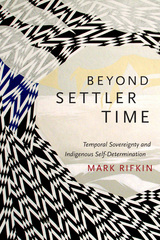 Beyond Settler Time: Temporal Sovereignty and Indigenous Self-Determination
Mark Rifkin
Duke University Press, 2017 What does it mean to say that Native peoples exist in the present? In Beyond Settler Time Mark Rifkin investigates the dangers of seeking to include Indigenous peoples within settler temporal frameworks. Claims that Native peoples should be recognized as coeval with Euro-Americans, Rifkin argues, implicitly treat dominant non-native ideologies and institutions as the basis for defining time itself. How, though, can Native peoples be understood as dynamic and changing while also not assuming that they belong to a present inherently shared with non-natives? Drawing on physics, phenomenology, queer studies, and postcolonial theory, Rifkin develops the concept of "settler time" to address how Native peoples are both consigned to the past and inserted into the present in ways that normalize non-native histories, geographies, and expectations. Through analysis of various kinds of texts, including government documents, film, fiction, and autobiography, he explores how Native experiences of time exceed and defy such settler impositions. In underscoring the existence of multiple temporalities, Rifkin illustrates how time plays a crucial role in Indigenous peoples’ expressions of sovereignty and struggles for self-determination.
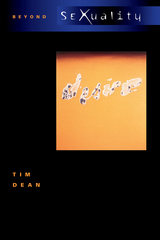 Beyond Sexuality
Tim Dean
University of Chicago Press, 2000 Beyond Sexuality points contemporary sexual politics in a radically new direction. Combining a psychoanalytic emphasis on the unconscious with a deep respect for the historical variability of sexual identities, this original work of queer theory makes the case for viewing erotic desire as fundamentally impersonal. Tim Dean develops a reading of Jacques Lacan that—rather than straightening out this notoriously difficult French psychoanalyst—brings out the queer tensions and productive incoherencies in his account of desire.
Dean shows how the Lacanian unconscious "deheterosexualizes" desire, and along the way he reveals how psychoanalytic thinkers as well as queer theorists have failed to exploit the full potential of this conception of desire. The book elaborates this by investigating social fantasies about homosexuality and AIDS, including gay men's own fantasies about sex and promiscuity, in an attempt to illuminate the challenges facing safe-sex education. Taking on many shibboleths in contemporary psychoanalysis and queer theory—and taking no prisoners—Beyond Sexuality offers an antidote to hagiographical strains in recent work on psychoanalysis, Foucault, and sexuality.
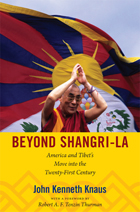 Beyond Shangri-La: America and Tibet's Move into the Twenty-First Century
John Kenneth Knaus
Duke University Press, 2012 Beyond Shangri-La chronicles relations between the Tibetans and the United States since 1908, when a Dalai Lama first met with U.S. representatives. What was initially a distant alliance became more intimate and entangled in the late 1950s, when the Tibetan people launched an armed resistance movement against the Chinese occupiers. The Tibetans fought to oust the Chinese and to maintain the presence of the current Dalai Lama and his direction of their country. In 1958, John Kenneth Knaus volunteered to serve in a major CIA program to support the Tibetans. For the next seven years, as an operations officer working from India, from Colorado, and from Washington, D.C., he cooperated with the Tibetan rebels as they utilized American assistance to contest Chinese domination and to attain international recognition as an independent entity. Since the late 1950s, the rugged resolve of the Dalai Lama and his people and the growing respect for their efforts to free their homeland from Chinese occupation have made Tibet's political and cultural status a pressing issue in international affairs. So has the realization by nations, including the United States, that their geopolitical interests would best be served by the defeat of the Chinese and the achievement of Tibetan self-determination. Beyond Shangri-La provides unique insight into the efforts of the U.S. government and committed U.S. citizens to support a free Tibet.
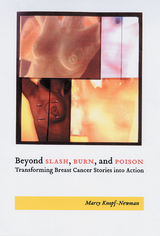 Beyond Slash, Burn, and Poison: Transforming Breast Cancer Stories into Action
Marcy Jane Knopf-Newman
Rutgers University Press, 2004 Depending on one’s vantage point, breast cancer can be a very different experience, and indeed, a very different concern. It is, for some, a personal struggle; for others, it is a disease posing scientific and environmental challenges; and for others it is a highly charged and politicized issue around which policy wars rage. Beyond Slash, Burn, and Poison brings a unique perspective to breast cancer by recognizing the overlapping relationship of all these realities. Drawing on the writings of Rachel Carson, Betty Ford, Rose Kushner, and Audre Lorde, this book explores the various ways in which patient-centered texts continue to leave their mark on the political realm of breast cancer and, ultimately, the disease itself. Ordered chronologically, the selections trace the progression of discussions about breast cancer from a time when the subject was kept private and silent to when it became part of public discourse. The texts included are personal accounts, written by women struggling to play an active role in their healing process and, at the same time, hoping to help others do the same. Knopf-Newman also shows us how these writings eventually changed public opinion and the underlying tendency to blame women for their illness. She argues that changes in medical practice and public policy are linked to textual interventions, and makes a case for the politicization of cultural studies of disease through personal and literary expression.
Passionately written and well-researched, Beyond Slash, Burn, and Poison transforms how we think about breast cancer. Rather than facilitating forums for separate discussions, this book brings conversations into dialog with each other. It is essential reading for anyone concerned with breast cancer and its history, as well as for those interested in the effect of the environment on public health and the role that literature plays in public policy and medicine.
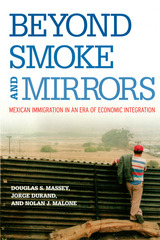 Beyond Smoke and Mirrors: Mexican Immigration in an Era of Economic Integration
Douglas S. Massey
Russell Sage Foundation, 2002 Migration between Mexico and the United States is part of a historical process of increasing North American integration. This process acquired new momentum with the passage of the North American Free Trade Agreement in 1994, which lowered barriers to the movement of goods, capital, services, and information. But rather than include labor in this new regime, the United States continues to resist the integration of the labor markets of the two countries. Instead of easing restrictions on Mexican labor, the United States has militarized its border and adopted restrictive new policies of immigrant disenfranchisement. Beyond Smoke and Mirrors examines the devastating impact of these immigration policies on the social and economic fabric of the Mexico and the United States, and calls for a sweeping reform of the current system. Beyond Smoke and Mirrors shows how U.S. immigration policies enacted between 1986–1996—largely for symbolic domestic political purposes—harm the interests of Mexico, the United States, and the people who migrate between them. The costs have been high. The book documents how the massive expansion of border enforcement has wasted billions of dollars and hundreds of lives, yet has not deterred increasing numbers of undocumented immigrants from heading north. The authors also show how the new policies unleashed a host of unintended consequences: a shift away from seasonal, circular migration toward permanent settlement; the creation of a black market for Mexican labor; the transformation of Mexican immigration from a regional phenomenon into a broad social movement touching every region of the country; and even the lowering of wages for legal U.S. residents. What had been a relatively open and benign labor process before 1986 was transformed into an exploitative underground system of labor coercion, one that lowered wages and working conditions of undocumented migrants, legal immigrants, and American citizens alike. Beyond Smoke and Mirrors offers specific proposals for repairing the damage. Rather than denying the reality of labor migration, the authors recommend regularizing it and working to manage it so as to promote economic development in Mexico, minimize costs and disruptions for the United States, and maximize benefits for all concerned. This book provides an essential "user's manual" for readers seeking a historical, theoretical, and substantive understanding of how U.S. policy on Mexican immigration evolved to its current dysfunctional state, as well as how it might be fixed.
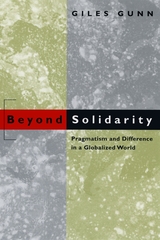 Beyond Solidarity: Pragmatism and Difference in a Globalized World
Giles Gunn
University of Chicago Press, 2001 Beyond Solidarity is an impassioned argument for a sharable morality in a world increasingly fractured along lines of difference. Giles Gunn asks how human solidarity can be reconceived when its expressions have become increasingly exceptionalist and outmoded, and when the pressures of globalization divide as much as they unify.
He finds the terms for answering these questions in a more inclusive, cosmopolitan pragmatism—one willing to explore fundamental values without recourse to absolutist arguments. Drawing on the work of William and Henry James, John Dewey, Primo Levi, Richard Rorty, and many others, as well as postcolonial writing, Jewish literature of the Holocaust, and the cultural and religious experience of African Americans in slavery, Gunn points pragmatism in a transnational direction and shows how it can better account for the consequences of diversity. Beyond Solidarity, then, is a study of the difference that difference makes in a globalized world.
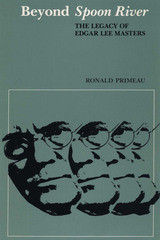 Beyond Spoon River: The Legacy of Edgar Lee Masters
By Ronald Primeau
University of Texas Press, 1981 As the first full-length critical study of Edgar Lee Masters, Beyond Spoon River is important not only for its reevaluation of this American poet and his work but also for its valuable insights into central questions of aesthetics, regionalism, and the nature and meaning of literary influence. The inordinate popularity of Spoon River Anthology has for many years unfairly restricted Masters' reputation as a "one-book phenomenon," although between 1911 and 1942 he wrote over fifty other books—most of which were neglected or misinterpreted precisely because they attempted a large-scale rewriting of what he felt had been obscured or distorted in the Anglo-American tradition. Masters' wide reading in the whole of western literature shaped his own attitudes, themes, and style, and his detailed accounts of that reading and its effect on his work form the basis for this reinterpretation of his place in American poetry in this century. After reviewing Masters' own statements on literary influence and his role as a critic, Primeau devotes the main body of his study to the major influences on Masters' work—the Greeks, Goethe, Emerson, Whitman, Shelley, and Browning. For Masters, the composite of all these influences provided a corrective to the poetry and criticism of his time, which he little admired. Primeau concludes by exploring Masters' midwestern heritage in the light of recent reinterpretations of regionalism.
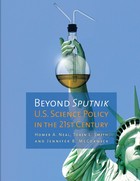 Beyond Sputnik: U.S. Science Policy in the Twenty-First Century
Homer A. Neal, Tobin L. Smith, and Jennifer B. McCormick
University of Michigan Press, 2008 Science and technology are responsible for almost every advance in our modern quality of life. Yet science isn't just about laboratories, telescopes and particle accelerators. Public policy exerts a huge impact on how the scientific community conducts its work. Beyond Sputnik is a comprehensive survey of the field for use as an introductory textbook in courses and a reference guide for legislators, scientists, journalists, and advocates seeking to understand the science policy-making process. Detailed case studies---on topics from cloning and stem cell research to homeland security and science education---offer readers the opportunity to study real instances of policymaking at work. Authors and experts Homer A. Neal, Tobin L. Smith, and Jennifer B. McCormick propose practical ways to implement sound public policy in science and technology and highlight how these policies will guide the results of scientific discovery for years to come. Homer A. Neal is the Samuel A. Goudsmit Distinguished University Professor of Physics, Interim President Emeritus, and Vice President for Research Emeritus at the University of Michigan, and is a former member of the U.S. National Science Board. Tobin L. Smith is Associate Vice President for Federal Relations at the Association of American Universities. He was formerly Assistant Director of the University of Michigan and MIT Washington, DC, offices. Jennifer B. McCormick is an Assistant Professor of Biomedical Ethics in the Division of General Internal Medicine at the Mayo College of Medicine in Rochester, Minnesota, and is the Associate Director of the Research Ethics Resource, part of the Mayo Clinic's NIH Clinical Translational Science Award research programs. GO BEYOND SPUTNIK ONLINE--Visit www.science-policy.net for the latest news, teaching resources, learning guides, and internship opportunities in the 21st-Century field of science policy.
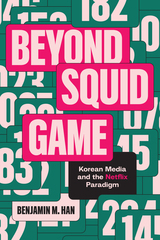 Beyond Squid Game: Korean Media and the Netflix Paradigm
Benjamin M. Han
University of Texas Press, 2026 Korea is a global entertainment powerhouse, thanks in no small part to Netflix. Analyzing the artistry and industry behind Netflix-produced Korean hits like Squid Game, The Glory, and Narco-Saints, Benjamin Han argues that Korea is ground zero for an emerging “Netflix Paradigm.” The US-based streaming platform generates massive profits by erasing boundaries of foreign and domestic production, even as it underscores the resilience of the national media within global popular culture.Beyond Squid Game breaks down the intricate and often ambivalent relationship between Netflix and the Korean media business, drawing on interviews with creative workers navigating the streaming giant’s ever-increasing economic and cultural power. Challenging narratives that present Netflix as a revolutionary disruptor, Han shows how the company has replicated abroad the precarious labor conditions and tensions over intellectual property from which US studios have long benefited. At the same time, Beyond Squid Game underscores the complex dynamics of a globalized media industry in which cultural imperialism thrives on localization and perceived authenticity.
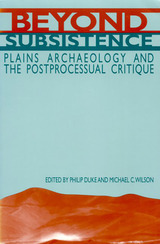 Beyond Subsistence: Plains Archaeology and the Postprocessual Critique
Edited by Philip Duke and Michael C. Wilson
University of Alabama Press, 1995 A series of essays, written by Plains scholars of diverse research interests and backgrounds, that apply postprocessual approaches to the solution of current problems in Plains archaeology
Postprocessual archaeology is seen as a potential vehicle for integrating culture-historical, processual, and postmodernist approaches to solve specific archaeological problems. The contributors address specific interpretive problems in all the major regions of the North American Plains, investigate different Plains societies (including hunter-gatherers and farmers and their associated archaeological records), and examine the political content of archaeology in such fields as gender studies and cultural resource management. They avoid a programmatic adherence to a single paradigm, arguing instead that a mature archaeology will use different theories, methods, and techniques to solve specific empirical problems. By avoiding excessive infatuation with the correct scientific method, this volume addresses questions that have often been categorized as beyond archaeological investigations.
Beyond Suffrage: Women in the New Deal
Susan Ware
Harvard University Press, 1981 The New Deal administration of Franklin Roosevelt brought an unprecedented number of women to Washington to serve in positions of power and influence. Beyond Suffrage is a study of women who achieved positions of national leadership in the 1930s. Susan Ware discusses the network they established, their attitudes toward feminism and social reform, and the impact they had upon the New Deal's social welfare policies and on Democratic party politics.
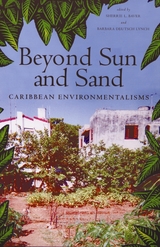 Beyond Sun and Sand: Caribbean Environmentalisms
Edited by Sherrie L. Baver and Barbara Deutsch Lynch
Rutgers University Press, 2006 Filtered through the lens of the North American and European media, the Caribbean appears to be a series of idyllic landscapes-sanctuaries designed for sailing, diving, and basking in the sun on endless white sandy beaches. Conservation literature paints a similarly enticing portrait, describing the region as a habitat for endangered coral reefs and their denizens, parrots, butterflies, turtles, snails, and a myriad of plant species.
In both versions, the image of the exotic landscape overshadows the rich island cultures that are both linguistically and politically diverse, but trapped in a global economy that offers few options for development. Popular depictions also overlook the reality that the region is fraught with environmental problems, including water and air pollution, solid waste mismanagement, destruction of ecosystems, deforestation, and the transition from agriculture to ranching.
Bringing together ten essays by social scientists and activists, Beyond Sun and Sand provides the most comprehensive exploration to date of the range of environmental issues facing the region and the social movements that have developed to deal with them. The authors consider the role that global and regional political economies play in this process and provide valuable insight into Caribbean environmentalism. Many of the essays by prominent Caribbean analysts are made available for the first time in English.
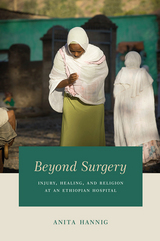 Beyond Surgery: Injury, Healing, and Religion at an Ethiopian Hospital
Anita Hannig
University of Chicago Press, 2017 Over the past few decades, maternal childbirth injuries have become a potent symbol of Western biomedical intervention in Africa, affecting over one million women across the global south. Western-funded hospitals have sprung up, offering surgical sutures that ostensibly allow women who suffer from obstetric fistula to return to their communities in full health. Journalists, NGO staff, celebrities, and some physicians have crafted a stock narrative around this injury, depicting afflicted women as victims of a backward culture who have their fortunes dramatically reversed by Western aid. With Beyond Surgery, medical anthropologist Anita Hannig unsettles this picture for the first time and reveals the complicated truth behind the idea of biomedical intervention as quick-fix salvation.
Through her in-depth ethnography of two repair and rehabilitation centers operating in Ethiopia, Hannig takes the reader deep into a world inside hospital walls, where women recount stories of loss and belonging, shame and delight. As she chronicles the lived experiences of fistula patients in clinical treatment, Hannig explores the danger of labeling “culture” the culprit, showing how this common argument ignores the larger problem of insufficient medical access in rural Africa. Beyond Surgery portrays the complex social outcomes of surgery in an effort to deepen our understanding of medical missions in Africa, expose cultural biases, and clear the path toward more effective ways of delivering care to those who need it most.
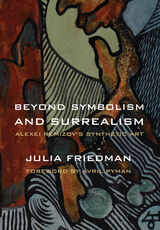 Beyond Symbolism and Surrealism: Alexei Remizov's Synthetic Art
Julia Friedman, Foreword by Avril Pyman
Northwestern University Press, 2011 The great modernist eccentric Alexei Remizov was a “writers’ writer” whose innovative poetic prose has long since entered the Russian literary canon. Gradually expanding his working methods to make drawing an integral part of the writing process, during the 1930s and 1940s, Remizov created hundreds of albums that combined texts with collages and india ink and watercolor illustrations. In Beyond Symbolism and Surrealism, Julia Friedman provides the first extensive examination of the dynamic interplay between text and image in Remizov’s albums, revealing their coequal roles in his oneiric and synaesthetic brand of storytelling. A participant in the Russian symbolist movement, an intellectual ally of many futurists, and during his émigré years, a collaborator of the surrealists, Remizov had unique insight into artistic cultures of the European avant-garde. His reinterpretation of the medieval illuminated manuscripts carries forward the traditions of symbolist mysticism and This long-overdue examination of Remizov’s visual art addresses modernism’s key theoretical questions surrounding the relationships between image and text. Beyond Symbolism and Surrealism introduces a generous sampling of Remizov’s graphic work, much of which is currently held in private collections.
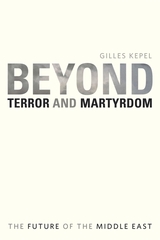 Beyond Terror and Martyrdom: The Future of the Middle East
Gilles Kepel
Harvard University Press, 2008 Since 2001, two dominant worldviews have clashed in the global arena: a neoconservative nightmare of an insidious Islamic terrorist threat to civilized life, and a jihadist myth of martyrdom through the slaughter of infidels. Across the airwaves and on the ground, an ill-defined and uncontrollable war has raged between these two opposing scenarios. Deadly images and threats—from the televised beheading of Western hostages to graphic pictures of torture at Abu Ghraib, from the destruction wrought by suicide bombers in London and Madrid to civilian deaths at the hands of American occupation forces in Iraq—have polarized populations on both sides of this divide.
Yet, as the noted Middle East scholar and commentator Gilles Kepel demonstrates, President Bush’s War on Terror masks a complex political agenda in the Middle East—enforcing democracy, accessing Iraqi oil, securing Israel, and seeking regime change in Iran. Osama bin Laden’s call for martyrs to rise up against the apostate and hasten the dawn of a universal Islamic state papers over a fractured, fragmented Islamic world that is waging war against itself.
Beyond Terror and Martyrdom sounds the alarm to the West and to Islam that both of these exhausted narratives are bankrupt—neither productive of democratic change in the Middle East nor of unity in Islam. Kepel urges us to escape the ideological quagmire of terrorism and martyrdom and explore the terms of a new and constructive dialogue between Islam and the West, one for which Europe, with its expanding and restless Muslim populations, may be the proving ground.
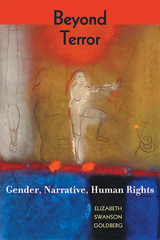 Beyond Terror: Gender, Narrative, Human Rights
Elizabeth Swanson Goldberg
Rutgers University Press, 2007 In traditional narrative contexts-legal, psychoanalytic, and documentary-the ethics of representing violations of human rights are widely acknowledged. But what are the principles that guide the creation and dissemination of historically based fictional narratives? Are such representations capable of shaping, changing, or even effectively depicting "real" human atrocities? How do existing ideas about gender influence the way these narratives are written and perceived? In Beyond Terror , Elizabeth Swanson Goldberg argues that after human rights violations have occurred, the realm of representation-actual and fictional-is precisely the ground upon which struggles for justice and peace are waged in legal, emotional, and cultural terms. Moving beyond the myriad of fictional accounts that have portrayed the carnage of World War II, the Holocaust, and the Vietnam War, Goldberg focuses on emerging narratives about recent abuses, including those in South Africa, Rwanda, and Iraq. Through the lens of literary, feminist, and human rights theory, this important book examines the meaning and influence of films such as Cry Freedom, Three Kings, and Salvador , and novels such as Gil Courtemanche's A Sunday at the Pool in Kigali , Pat Barker's Double Vision , and Edwidge Danticat's The Farming of Bones .
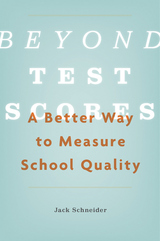 Beyond Test Scores: A Better Way to Measure School Quality
Jack Schneider
Harvard University Press, 2017 When it comes to sizing up America’s public schools, test scores are the go-to metric of state policy makers and anxious parents looking to place their children in the “best” schools. Yet ample research indicates that standardized tests are a poor way to measure a school’s performance. It is time—indeed past time—to rethink this system, Jack Schneider says.
Beyond Test Scores reframes current debates over school quality by offering new approaches to educational data that can push us past our unproductive fixation on test scores. Using the highly diverse urban school district of Somerville, Massachusetts, as a case study, Schneider and his research team developed a new framework to more fairly and comprehensively assess educational effectiveness. And by adopting a wide range of measures aligned with that framework, they were able to more accurately capture a broader array of school strengths and weaknesses. Their new data not only provided parents, educators, and administrators with a clearer picture of school performance, but also challenged misconceptions about what makes a good school.
With better data, Schneider shows, stakeholders at the federal, state, and local levels can undo the damage of present accountability systems and build greater capacity in our schools. Policy makers, administrators, and school leaders can better identify where assistance is needed. Educators can engage in more evidence-based decision making. And parents can make better-informed choices for their children. Perhaps most importantly, better data can facilitate communication among all these groups, allowing them to take collective action toward shared, concrete goals.
 Beyond Text: Learning through Arts-Based Research
Edited by Jeff Adams and Allan Owens
Intellect Books, 2021 A transnational, intercultural, and interdisciplinary discussion of arts-based practices
This collection explores a variety of art forms across different professional contexts, focusing on the ways educational practitioners and leaders from different cultures, disciplines, and organizations practice arts-based research. Beyond Text builds on a multi-year research study wherein participants used the arts to study topics of mutual interest. The project facilitated long-term conversations about arts-based practices among a large and diverse group: twenty-eight people from eight different organizations and with a range of experience levels, across six countries.
This vibrant collection takes the study further, discussing the significant effect arts-based practices can have on research across a range of international contexts. The academic and educational practices explored in the volume go beyond text to give rise to profound questions about the nature of research and education.
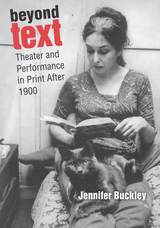 Beyond Text: Theater and Performance in Print After 1900
Jennifer Buckley
University of Michigan Press, 2019 Taking up the work of prominent theater and performance artists, Beyond Text reveals the audacity and beauty of avant-garde performance in print. With extended analyses of the works of Edward Gordon Craig, German expressionist Lothar Schreyer, the Living Theatre, Carolee Schneemann, and Guillermo Gómez-Peña, the book shows how live performance and print aesthetically revived one another during a period in which both were supposed to be in a state of terminal cultural decline. While the European and American avant-gardes did indeed dismiss the dramatic author, they also adopted print as a theatrical medium, altering the status, form, and function of text and image in ways that continue to impact both the performing arts and the book arts.
Beyond Text participates in the ongoing critical effort to unsettle conventional historical and theoretical accounts of text-performance relations, which have too often been figured in binary, chronological (“from page to stage”), or hierarchical terms. Across five case studies spanning twelve decades, Beyond Text demonstrates that print—as noun and verb—has been integral to the practices of modern and contemporary theater and performance artists.
Beyond the Archipelago: Selected Poems
Muhammad Haji Salleh
Ohio University Press, 1994 A collections of 70 poems from one of Malaya’s leading poets, that depict longing, loneliness, modernization, and insights in Malaysian culture.
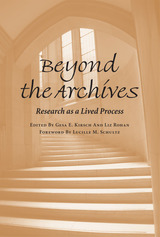 Beyond the Archives: Research as a Lived Process
Edited by Gesa E. Kirsch and Liz Rohan Foreword by Lucille M. Schultz
Southern Illinois University Press, 2008 This collection of highly readable essays reveals that research is not restricted to library archives. When researchers pursue information and perspectives from sources beyond the archives—from existing people and places— they are often rewarded with unexpected discoveries that enrich their research and their lives. Beyond the Archives: Research as a Lived Process presents narratives that demystify and illuminate the research process by showing how personal experiences, family history, and scholarly research intersect. Editors Gesa E. Kirsch and Liz Rohan emphasize how important it is for researchers to tap into their passions, pursuing research subjects that attract their attention with creativity and intuition without limiting themselves to traditional archival sources and research methods. Eighteen contributors from a number of disciplines detail inspiring research opportunities that led to recently published works, while offering insights on such topics as starting and finishing research projects, using a wide range of types of sources and methods, and taking advantage of unexpected leads, chance encounters and simple clues. In addition, the narratives trace the importance of place in archival research, the parallels between the lives of research subjects and researchers, and explore archives as sites that resurrect personal, cultural, and historical memory. Beyond the Archives sheds light on the creative, joyful, and serendipitous nature of research, addressing what attracts researchers to their subjects, as well as what inspires them to produce the most thorough, complete, and engaged scholarly work. This timely and essential volume supplements traditional-method textbooks and effectively models concrete practices of retrieving and synthesizing information by professional researchers.
 Beyond the Ark: Tools For An Ecosystem Approach To Conservation
W. William Weeks; Foreword by Bruce Babbitt
Island Press, 1997 Among the few organizations with substantial experience in conserving and managing large ecosystems is The Nature Conservancy (TNC) -- the largest private, nonprofit conservation organization in the world dedicated to preserving natural areas, whose efforts have led to the protection of more than nine million acres of land across the United States and Canada.For more than fourteen years, W. William Weeks has worked in various capacities for The Nature Conservancy -- as state director, chief operating officer, and, currently, as vice president and director of The Center for Compatible Economic Development. During that time he has developed a deeply personal understanding of TNC's underlying philosophy and guiding methodology, and has come to appreciate the complex interaction between landscapes and people that characterize all conservation efforts. In Beyond the Ark, Weeks weaves together anecdotes, personal reflection, and fascinating detail from past and current Nature Conservancy projects to present a lively and inspiring introduction to issues of land conservation and management, and to The Nature Conservancy's approach to conservation.The author begins with a general introduction to conservation, to conservation planning, to the history and philosophy of The Nature Conservancy, and to the popular but often vaguely defined notion of ecosystem management. He then presents a detailed account of the conservation planning discipline that is at the heart of The Nature Conservancy's approach. Weeks offers in-depth description and analysis of the planning process that TNC goes through for each project -- a process designed to lead to a comprehensive understanding of the ecological system under consideration, threats to it and their causes, strategies for addressing those threats, and a means of measuring success. He ends with a consideration of the implications of the approach described, and presents his own thoughts on various aspects of the larger context in which conservation efforts must function.Beyond the Ark is an insightful and illuminating overview of conservation and management issues. Featuring a wealth of practical information gleaned from a wide range of real-life projects, it provides invaluable guidance to all those working to protect our endangered natural resources.
 Beyond the Bandstand: Paul Whiteman in American Musical Culture
Edited by W. Anthony Sheppard
University of Illinois Press, 2024 The most successful bandleader of the 1920s, Paul Whiteman was an entertainment icon who played a major role in the mainstreaming of jazz. Whiteman and his band premiered Gershwin’s Rhapsody in Blue. Duke Ellington acknowledged his achievements. His astonishing ear for talent vaulted a who’s who of artists toward prominence. But Whiteman’s oversized presence eclipsed Black jazz musicians while his middlebrow music prompted later generations to jettison him from jazz history. W. Anthony Sheppard’s collection of essays confronts the racial implications of Whiteman’s career. The contributors explore Whiteman’s broad impact on popular culture, tracking his work and influence in American marketing, animated films, the Black press, Hollywood, and the music publication industry, and following him behind the scenes with arrangers, into grand concert halls, across the Atlantic, into the courtroom, and on television. Multifaceted and cutting-edge, Beyond the Bandstand explores the racial politics and artistic questions surrounding a controversial figure in popular music. Contributors: Ryan Raul Bañagale, Stephanie Doktor, John Howland, Katherine M. Leo, Sarah Caissie Provost, W. Anthony Sheppard, Catherine Tackley, Elijah Wald, and Christi Jay Wells
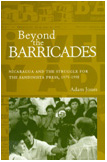 Beyond The Barricades: Nicaragua and the Struggle for the Sandinista Press, 1979–1998
Adam Jones
Ohio University Press, 2002 Throughout the 1980s, Barricada, the official daily newspaper of the ruling Sandinista Front, played the standard role of a party organ, seeking the mobilize the Nicaraguan public to support the revolutionary agenda. Beyond the Barricades, however, reveals a story that is both more intriguing and much more complex. Even during this period of sweeping transformation and outside military siege, another, more professional agenda also motivated Barricada’s journalists and editors. When the Sandinistas unexpectedly fell from power in the 1990 elections, Barricada gained a substantial degree of autonomy that allowed it to explore a more balanced and nuanced journalism “in the national interest.” This new orientation, however, ran afoul of more orthodox party leaders, who gradually gained the upper hand in the bitter internal struggle that wracked the Sandinista Front in the early 1990s. The paper closed its doors in January 1998. Adam Jones’s outstanding study offers an unprecedented behin-the-scenes looks at Barricada’s two decades of evolution and dissolution. It also presents an intimate portrait of a key revolutionary institution and the memorable individuals who were a part of it.
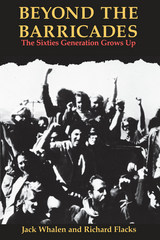 Beyond the Barricades: The Sixties Generation Grows Up
Jack Whalen
Temple University Press, 1990 "'The Big Chill' told only half the story of where Sixties activists ended up. Whalen and Flacks... honestly chronicle the other half."
--Abbie Hoffman
"What happens to youthful idealism as people leave their youth behind? ...Where do young revolutionaries go when the revolution doesn't happen?"
Amid the social and political turmoil of the late 1960s, student demonstrations on college campuses and in nearby communities looked like a prelude to apocalypse. By 1970 radical students at the University of California, Santa Barbara (UCSB), were involved in burning the Bank of America branch in Isla Vista and a series of riots and demonstrations that culminated in hundreds of arrests, numerous injuries, and one student death. To some campus observers, the violence and property damage were nothing more than a meaningless rampage--privileged students running amok. To those actively involved in the student movement and the Radical Union, the second American revolution was at hand. The disparate views of these events persist some twenty years later.
In Beyond the Barricades, Whalen and Flacks challenge the conventional wisdom, which holds that the Sixties Generation soon outgrew their political ideals and channeled their energies into building lucrative careers and accumulating material goods. For nine years, the authors have maintained contact with eighteen men and women who participated in the UCSB student movement, asking probing questions about the long-term significance of political commitment to individual lives. They have also tracked fourteen former students who were part of the sorority/fraternity subculture in an attempt to discern whether the paths of the two student groups tend to converge as they grow older.
This study grows out of the student activists' own assessments of the events at UCSB and the lives they have shaped in subsequent years. It demonstrates that student activists did not abandon their beliefs or become disillusioned with the prospects for social change as they left the university and ventured into the adult world. Indeed, their present political convictions and vocational commitments are largely consistent with their past views--even as they have had to adapt to changes in their personal needs and in the social climate.
In asking where the students are now, the authors illuminate something about how our society has been affected--culturally, institutionally, psychologically--by the movements and conflicts of the sixties. Whalen and Flacks "offer these stories in the same spirit that apparently guided [the] respondents: as contributions to the ongoing discourse on how we might live according to our dreams!"
"Whalen and Flacks are true Sixties sociologists--hip white knights who ride out to slay the ideal-crushing dragon of ‘The Big Chill.' In all, a heart-on-the-sleeve, hopeful study that should appeal to social psychologists and Sixties sympathizers."
--Kirkus Reviews
"In the first systematic study of the sequels to New Left radicalism, Whalen and Flacks bring alive the real choices of real activists. This is a lucid and enlightening book, full of stimulating ideas about continuities and fragilities in American radicalism."
--Todd Gitlin, author of The Sixties: Years of Hope, Days of Rage
"As Whalen and Flacks know, ‘The Big Chill' was a lie. The earthquake called the Sixties changed lives--and this pioneering study explains why, showing how the generation schooled in activism has been struggling to keep faith with the ideal of social justice and democracy."
--James Miller, author of Democracy is in the Streets
"Beyond the Barricades...is, in short, very good sociology of the intimate close-up sort. And it helps us to understand that most of the so-called yuppies are not (as we have cynically been led to believe) ex-hippies or student radicals, but rather very probably come from that majority of 1960s students who were never either."
--Bennett M. Berger, University of California, San Diego
 Beyond the Barrio: Latinos in the 2004 Elections
Rodolfo O. de la Garza
University of Notre Dame Press, 2010
Beyond the Barrio: Latinos in the 2004 Elections analyzes the mobilization of Latino voters at the state and national levels during the 2004 campaign and the efforts of Latino communities to influence electoral outcomes. The volume is the most recent installment in the quadrennial analyses of Latinos and national elections begun in 1988 by Rodolfo de la Garza and Louis DeSipio. This ongoing project is the only scholarly effort to track the emergence of Latino influence in U.S. politics over the last two decades.
The volume examines how and when Latinos were the focus of candidate/campaign mobilization, how Latinos themselves organized to influence electoral outcomes, and where and under what circumstances they succeeded. In addition to state-level analyses, Beyond the Barrio presents an analytical overview of the national presidential campaign that includes measures of Latino influence and a review of state and local contests that led to the election of Latino officials. It also extends the analysis to states with small Latino populations that are just beginning to organize. The editors consider 2004 as a "signpost" election, in which both major parties began a transition from symbolic gestures toward Latino voters to more serious, issue-related efforts to court the Latino vote.
The expertise of the contributors ensures that Beyond the Barrio avoids simple generalizations about the "Latino vote" and illustrates its complexity, as well as the opportunities and challenges faced by Latino voters and Latino leaders.
"This latest volume focusing on Latino politics in the 2004 election may well be the best in the series. If you are looking for a book on Latino political participation or a work to supplement your American Government class, this is the book." --Robert D. Wrinkle, University of Texas-Pan American
"This volume makes an indispensable contribution toward understanding the continuing political development of U.S. Latino communities by assessing their roles in the 2004 U.S. elections. This book should not be missed by anyone interested in tracking the complex realities of the roles played by the nation's largest ethno-racial minority group in the first national elections since officially gaining that status following the 2000 decennial U.S. Census." --Ronald Schmidt, Sr., California State University, Long Beach
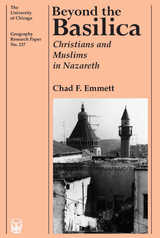 Beyond the Basilica: Christians and Muslims in Nazareth
Chad F. Emmett
University of Chicago Press, 1994 Nazareth, the largest Arab city in Israel, is a surprising example of ethnic harmony in a region dominated by conflict. A recent trend toward integration of its historical Greek Orthodox, Roman Catholic, and Muslim quarters however, has disrupted the harmony. In Beyond the Basilica: Christians and Muslims in Nazareth, Chad F. Emmett provides penetrating analysis of the complex relationship between the structure of Nazareth’s quarters and the relations between its ethnic communities.
Emmett describes both the positive and negative effects of Nazareth’s residential patterns. He shows that the addition of new and ethnically mixed quarters has promoted mixed schools, joint holiday celebrations, a common political culture, and social networks that cross ethnic boundaries. But he also finds that tensions exist among Christian groups and between Muslims and Christians in regard to intersectarian marriages, religious conversion, attempts to establish a joint Christian cemetery, and the emergence of a local Islamic party.
Extensive interviews with leaders of religious groups, political parties, and residents reveal the way in which members of each ethnic community perceive one another. A survey of 300 families gives a wealth of details about the make-up of Nazareth’s population, including residential histories, religion, level of religious conviction, friendship and shopping patterns, and much more. Fourteen maps trace changes in the distribution of religious groups and political affiliation in Nazareth from the mid-nineteenth century to the present.
Beyond the Basilica will interest cultural geographers, historians, demographers, political scientists, and anyone who would like to learn more about an ethnically divided community in the residents cooperate more than they fight.
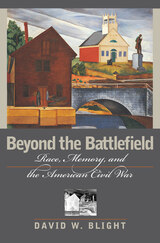 Beyond the Battlefield: Race, Memory, and the American Civil War
David W. Blight
University of Massachusetts Press, 2002 During the past decade and a half, scholars have increasingly addressed the relationship of history and memory. Among American historians, David W. Blight has been a pioneer in the field of memory studies, especially on the problems of slavery, race, and the Civil War. In this collection of essays, Blight examines the meanings embedded in the causes, course, and consequences of the Civil War, the nature of changing approaches to African American history, and the significance of race in the ways Americans, North and South, black and white, developed historical memories of the nation's most divisive event.
The book as a whole demonstrates several ways to probe the history of memory, to understand how and why groups of Americans have constructed versions of the past in the service of contemporary social needs. Topics range from the writing and thought of Frederick Douglass and W.E.B. Du Bois to a comparison of Abraham Lincoln and Douglass on the level of language and memory. The volume also includes a compelling study of the values of a single Union soldier, an analysis of Ken Burns's PBS series The Civil War, and a retrospective treatment of the distinguished African American historian Nathan I. Huggins.
Taken together, these lucidly written pieces offer a thoroughgoing assessment of the stakes of Civil War memory and their consequences for American race relations. Beyond the Battlefield demonstrates not only why we should preserve and study our Civil War battlefields, but also why we should lift our vision above those landscapes and ponder all the unfinished questions of healing and justice, of racial harmony and disharmony, that still bedevil our society and our historical imagination.
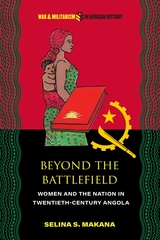 Beyond the Battlefield: Women and the Nation in Twentieth-Century Angola
Selina S. Makana
Ohio University Press Beyond the Battlefield offers a critical reappraisal of Angola’s nationalist history by centering the experiences and political agency of women during the country’s transition from Portuguese colonial rule to independence. Challenging dominant masculinist narratives that equate anticolonial resistance with armed combat, this study introduces maternalist nationalism as a theoretical framework to illuminate how women engaged in nation building through often-overlooked forms of labor and activism. While men were largely visible on the battlefield, women fought a parallel struggle on the home front—mobilizing care work, reproductive labor, and political engagement in ways that were essential to the liberation movement and the postindependence state. Drawing on archival sources and women’s testimonies, Makana explores how patriotic motherhood—a concept defined as the fusion of nationalist politics with gendered expectations of women’s roles—enabled women to see themselves as vital contributors to the nation’s future. This study contributes to scholarship in African history, gender studies, and postcolonial theory by offering a nuanced account of the intersections among militarism, nationalism, and gender. It invites readers to reconsider the frameworks through which political subjectivity and historical memory are constructed. Beyond the Battlefield is an essential resource for scholars and students interested in the gendered dimensions of colonialism, war, and state formation in modern Africa.
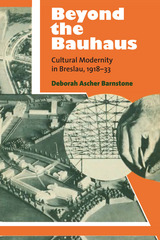 Beyond the Bauhaus: Cultural Modernity in Breslau, 1918-33
Deborah Ascher Barnstone
University of Michigan Press, 2016 Although the Breslau arts scene was one of the most vibrant in all of Weimar-era Germany, it has largely disappeared from memory. Studies of the influence of Weimar culture on modernism have focused almost exclusively on Berlin and the Dessau Bauhaus, yet the advances that occurred in Breslau affected nearly every intellectual field, forming the basis for aesthetic modernism internationally and having an enduring impact on visual art and architecture. Breslau boasted a thriving modern arts scene and one of the premier German arts academies of the day until the Nazis began their assault on so-called degenerate art. This book charts the cultural production of Breslau-based artists, architects, art collectors, urban designers, and arts educators who operated in the margins of Weimar-era cultural debates. Rather than accepting the radical position of the German avant-garde or the reactionary position of German conservatives, many Breslauers sought a middle ground.
This richly illustrated volume is the first book in English to address this history, constituting an invaluable addition to the literature on the Weimar period. Its readership includes scholars of German history, art, architecture, urban design, planning, collecting, and exhibition history; of the avant-garde, and of the development of arts academies and arts pedagogy.
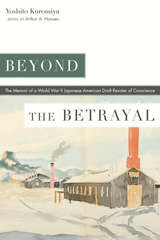 Beyond the Betrayal: The Memoir of a World War II Japanese American Draft Resister of Conscience
by Yoshito Kuromiya edited by ArthurA.Hansen
University Press of Colorado, 2022 Beyond the Betrayal is a lyrically written memoir by Yoshito Kuromiya (1923–2018), a Nisei member of the Fair Play Committee (FPC), which was organized at the Heart Mountain concentration camp. The first book-length account by a Nisei World War II draft resister, this work presents an insider’s perspective on the FPC and the infamous trial condemning its members' efforts. It offers not only a beautifully written account of an important moment in US history but also a rare acknowledgment of dissension within the resistance movement, both between the young men who went to prison and their older leaders and also among the young men themselves. Kuromiya’s narrative is enriched by contributions from Frank Chin, Eric L. Muller, and Lawson Fusao Inada.
Of the 300 Japanese Americans who resisted the military draft on the grounds that the US government had deprived them of their fundamental rights as US citizens, Kuromiya alone has produced an autobiographical volume that explores the short- and long-term causes and consequences of this fateful wartime decision. In his exquisitely written and powerfully documented testament he speaks truth to power, making evident why he is eminently qualified to convey the plight of the Nisei draft resisters. He perceptively reframes the wartime and postwar experiences of the larger Japanese American community, commonly said to have suffered in the spirit of shikata ga nai—enduring that which cannot be changed—and emerged with dignity.
Beyond the Betrayal makes abundantly clear that the unjustly imprisoned Nisei could and did exercise their patriotism even when they refused to serve in the military in the name of civil liberties and social justice. Kuromiya’s account, initially privately circulated only to family and friends, is an invaluable and insightful addition to the Nikkei historical record.
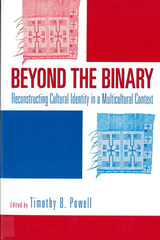 Beyond the Binary: Reconstructing Cultural Identity In a Multicultural Context
Edited by Timothy B. Powell
Rutgers University Press, 1999 "Beyond the Binary offers a coherently presented collection of uniformly strong essays that speak to what is perhaps the most widely discussed, contested and conflicted topic in the study of US culture. It joins the growing body of work that seeks to move beyond identity politics and racial essentialism to formulate racial identity as a more complex series of social, cultural and political gestures." -Priscilla Wald, author of Constituting Americans: Cultural Anxiety and Narrative Form and Constituting Americans Cultural studies have reached a theoretical impasse. As scholars continue to topple the previously entrenched concept of Eurocentrism, this field has fragmented into works covering many separate cultural enclaves. In the first wave of this "post-Eurocentric" scholarship, a binary model ensued, using the designations of "Self" and "Other:" i.e., black/white, gay/straight. This model, however, also has found disfavor. As a result, recent scholarship has focused on a single group studied in isolation. What is needed is a new critical phase of reconstruction that will bring discussion of these disparate cultural enclaves back into a more organized, critical sphere. Researchers must have the necessary conceptual tools so they can study the ways in which cultures overlap, intersect, or else violently conflict with one another. Beyond the Binary: Reconstructing Cultural Identity in a Multicultural Context addresses this theoretical impasse by proposing new critical models that fully engage the dilemmas posed by multiculturalism. Rather than becoming entangled in the polarizing rhetoric of the culture wars, these essays are firmly grounded in the lived perplexities of specific historical moments. One piece, for example, considers the cultural identity of "freaks" exhibited in P. T. Barnum's circus, the contested place of hemophiliacs within Queer Nation, and "white" working-class musicians who proudly proclaim themselves to be "black lesbians." Beyond the Binary is meant to be read in its entirety as a many-voiced narrative dedicated to bringing the divisions within cultural studies back into contact with one another. By doing so, Powell ushers in a new era of multicultural analysis that recognizes the historical existence of racism, yet also acknowledges the dynamic fluidity of cultural identity.
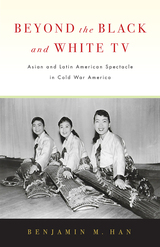 Beyond the Black and White TV: Asian and Latin American Spectacle in Cold War America
Benjamin M. Han
Rutgers University Press, 2020 This is the first book that examines how “ethnic spectacle” in the form of Asian and Latin American bodies played a significant role in the cultural Cold War at three historic junctures: the Korean War in 1950, the Cuban Revolution in 1959, and the statehood of Hawaii in 1959. As a means to strengthen U.S. internationalism and in an effort to combat the growing influence of communism, television variety shows, such as The Xavier Cugat Show, The Ed Sullivan Show, and The Chevy Show, were envisioned as early forms of global television. Beyond the Black and White TV examines the intimate moments of cultural interactions between the white hosts and the ethnic guests to illustrate U.S. aspirations for global power through the medium of television. These depictions of racial harmony aimed to shape a new perception of the United States as an exemplary nation of democracy, equality, and globalism.
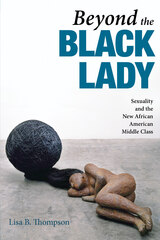 Beyond the Black Lady: Sexuality and the New African American Middle Class
Lisa B. Thompson
University of Illinois Press, 2012 In this book, Lisa B. Thompson explores the representation of black middle-class female sexuality by African American women authors in narrative literature, drama, film, and popular culture, showing how these depictions reclaim black female agency and illustrate the difficulties black women confront in asserting sexual agency in the public sphere. Thompson broadens the discourse around black female sexuality by offering an alternate reading of the overly determined racial and sexual script that casts the middle class "black lady" as the bastion of African American propriety. Drawing on the work of black feminist theorists, she examines symptomatic autobiographies, novels, plays, and key episodes in contemporary American popular culture, including works by Anita Hill, Judith Alexa Jackson, P. J. Gibson, Julie Dash, Kasi Lemmons, Jill Nelson, Lorene Cary, and Andrea Lee.
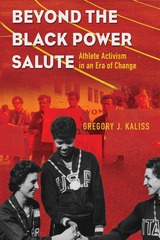 Beyond the Black Power Salute: Athlete Activism in an Era of Change
Gregory J. Kaliss
University of Illinois Press, 2023 Unequal opportunity sparked Jim Brown’s endeavors to encourage Black development while Billie Jean King fought so that women tennis players could earn more money and enjoy greater freedom. Gregory J. Kaliss examines these events and others to guide readers through the unprecedented wave of protest that swept sports in the 1960s and 1970s. The little-known story of the University of Wyoming football players suspended for their activism highlights an analysis of protests by college athletes. The 1971 Muhammad Ali–Joe Frazier clash provides a high-profile example of the Black male athlete’s effort to redefine Black masculinity. An in-depth look at the American Basketball Association reveals a league that put Black culture front and center with its style of play and shows how the ABA influenced the development of hip-hop. As Kaliss describes the breakthroughs achieved by these athletes, he also explores the barriers that remained--and in some cases remain today.
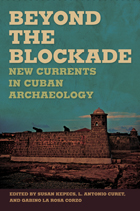 Beyond the Blockade: New Currents in Cuban Archaeology
Edited by Susan Kepecs, L. Antonio Curet, and Gabino La Rosa Corzo
University of Alabama Press, 2011 An important collection of essays and scholarship by Cuban archaeologists about precontact human settlement on the island.
An important and timely collection of essays that greatly expands knowledge of the human settlement of Cuba and the activities of its indigenous peoples. The collection is a testament to the tenacity of Cuban and US scholars determined to dismantle the political and economic barriers that have impeded collaborative archaeological scholarship in Cuba. Despite economic and political challenges that have limited the pursuit of archaeological research in Cuba, these essays show that Cuban archaeology has made valuable contributions to understanding the cultural processes that have shaped life in the Caribbean in both prehispanic and historic periods and added significantly to our understanding of past Cuban peoples.
The collection, one of only a few studies of Cuban archaeology published in English in the United States, includes essays by both Cuban and US scholars that highlight trends in Cuban archaeology. It recognizes the past pioneers of joint Cuban-US archaeological projects and pays homage to those researchers, including Betty Meggers and Lourdes Dominguez, who sustained scholarly contact across the Florida Straits despite geopolitical roadblocks.
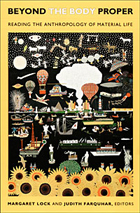 Beyond the Body Proper: Reading the Anthropology of Material Life
Margaret Lock and Judith Farquhar, eds.
Duke University Press, 2007 Over the past several decades, scholars in both the social sciences and humanities have moved beyond the idea that there is a “body proper”: a singular, discrete biological organism with an individual psyche. They have begun to perceive embodiment as dynamic rather than static, as experiences that vary over time and across the world as they are shaped by discourses, institutions, practices, technologies, and ideologies. What has emerged is a multiplicity of bodies, inviting a great many disciplinary points of view and modes of interpretation. The forty-seven readings presented in this volume range from classic works of social theory, history, and ethnography to more recent investigations into historical and contemporary modes of embodiment. Beyond the Body Proper includes nine sections conceptually organized around themes such as everyday life, sex and gender, and science. Each section is preceded by interpretive commentary by the volume’s editors. Within the collection are articles and book excerpts focused on bodies using tools and participating in rituals, on bodies walking and eating, and on the female circumcision controversy, as well as pieces on medical classifications, spirit possession, the commodification of body parts, in vitro fertilization, and an artist/anatomist’s “plastination” of cadavers for display. Materialist, phenomenological, and feminist perspectives on embodiment appear along with writings on interpretations of pain and the changing meanings of sexual intercourse. Essays on these topics and many others challenge Eurocentric assumptions about the body as they speak to each other and to the most influential contemporary trends in the human sciences. With selections by: Henry Abelove, Walter Benjamin, Janice Boddy, John Boswell, Judith Butler, Caroline Walker Bynum, Stuart Cosgrove, Michel de Certeau, Gilles Deleuze, Alice Domurat Dreger, Barbara Duden, Friedrich Engels, E. E. Evans-Pritchard, Judith Farquhar, Marcel Granet, Felix Guattari, Ian Hacking, Robert Hertz, Patricia Leyland Kaufert, Arthur Kleinman, Shigehisa Kuriyama, Jean Langford, Bruno Latour, Margaret Lock, Emily Martin, Karl Marx, Marcel Mauss, Maurice Merleau-Ponty, Nancy K. Miller, Lisa Jean Moore, John D. O’Neil, Aihwa Ong, Mariella Pandolfi, Susan Pedersen, Gregory M. Pflugfelder, Rayna Rapp, Nancy Scheper-Hughes, Kristofer Schipper, Matthew Schmidt, Peter Stallybrass, Michael Taussig, Charis Thompson, E.P. Thompson, Anna Lowenhaupt Tsing, Victor Turner, Terence Turner, Jose van Dijck, Keith Wailoo, Brad Weiss, Allon White
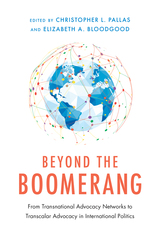 Beyond the Boomerang: From Transnational Advocacy Networks to Transcalar Advocacy in International Politics
Edited by Christopher L. Pallas and Elizabeth A. Bloodgood
University of Alabama Press, 2022 Essays that generate a new, empirically grounded theory of transnational advocacy
Margaret E. Keck and Kathryn Sikkink introduced the boomerang theory in their 1998 book, Activists beyond Borders: Advocacy Networks in International Politics. It remains one of the first broadly applicable theories for why groups of NGOs and interested individuals form transnational advocacy networks. Since its publication, however, the empirical conditions that prompted their theory have changed. The types of actors involved in transnational advocacy have diversified. Northern NGOs have lost power and influence and have been restricted in their access to southern states. Southern NGOs have developed the capacity to undertake advocacy on their own and often built closer relationships with their own governments. The architecture of global governance has likewise changed, providing new avenues of access and influence for southern voices.
In Beyond the Boomerang: From Transnational Advocacy Networks to Transcalar Advocacy in International Politics, editors Christopher L. Pallas and Elizabeth A. Bloodgood offer cutting-edge scholarship that synthesizes a new theoretical framework to develop a coherent, integrated picture of the current dynamics in global advocacy. This new theory of transcalar advocacy focuses on advocacy activities and policy impacts that transcend different levels or scales of political action. In transcalar advocacy, all NGOs–northern and southern–are treated as strategic actors, choosing the targets, scales of advocacy, and partnerships that best suit their capacities and goals. The case studies in the volume develop the empirical grounding of this theory using data from Latin America, Africa, Europe, and Asia, with several chapters featuring cross-national comparison. The chapters highlight the wide variety of actors involved in advocacy work, including NGOs, social movements, international institutions, governments, and businesses. Contributors use both qualitative and quantitative methodologies and bring to bear insights from political science, international relations, and sociology. The case studies also include diverse issue areas, from women’s rights to environmental protection, sustainable agriculture, health policy, and democracy promotion.
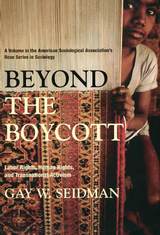 Beyond the Boycott: Labor Rights, Human Rights, and Transnational Activism
Gay W. Seidman
Russell Sage Foundation, 2007 As the world economy becomes increasingly integrated, companies can shift production to wherever wages are lowest and unions weakest. How can workers defend their rights in an era of mobile capital? With national governments forced to compete for foreign investment by rolling back legal protections for workers, fair trade advocates are enlisting consumers to put market pressure on companies to treat their workers fairly. In Beyond the Boycott, sociologist Gay Seidman asks whether this non-governmental approach can reverse the "race to the bottom" in global labor standards. Beyond the Boycott examines three campaigns in which activists successfully used the threat of a consumer boycott to pressure companies to accept voluntary codes of conduct and independent monitoring of work sites. The voluntary Sullivan Code required American corporations operating in apartheid-era South Africa to improve treatment of their workers; in India, the Rugmark inspection team provides 'social labels' for handknotted carpets made without child labor; and in Guatemala, COVERCO monitors conditions in factories producing clothing under contract for major American brands. Seidman compares these cases to explore the ingredients of successful campaigns, as well as the inherent limitations facing voluntary monitoring schemes. Despite activists' emphasis on educating individual consumers to support ethical companies, Seidman finds that, in practice, they have been most successful when they mobilized institutions—such as universities, churches, and shareholder organizations. Moreover, although activists tend to dismiss states' capabilities, all three cases involved governmental threats of trade sanctions against companies and countries with poor labor records. Finally, Seidman points to an intractable difficulty of independent workplace monitoring: since consumers rarely distinguish between monitoring schemes and labels, companies can hand pick monitoring organizations, selecting those with the lowest standards for working conditions and the least aggressive inspections. Transnational consumer movements can increase the bargaining power of the global workforce, Seidman argues, but they cannot replace national governments or local campaigns to expand the meaning of citizenship. As trade and capital move across borders in growing volume and with greater speed, civil society and human rights movements are also becoming more global. Highly original and thought-provoking, Beyond the Boycott vividly depicts the contemporary movement to humanize globalization—its present and its possible future. A Volume in the American Sociological Association's Rose Series in Sociology
 Beyond the Breast-Bottle Controversy
Penny Van Esterik
Rutgers University Press, 1989 "A new milestone in the literature on development. . . . Essential (and enjoyable)reading for a broad range of individuals including all those concerned with urban and rural development . . .; professionals and academics in . . . health, sociology, anthropology, and development economics; many women exploring gender issues and feminism; . . . food industrialists and marketeers; . . . and lastly, ordinary persons interested in how best to nurture babies."
--from the Foreword by Michael C. Latham, Cornell University
Penny Van Esterik takes the reader beyond the Nestle boycott and the activist campaigns against infant-formula manufacturers to the issues underlying the controversy. She shows how the controversy is embedded in the problem of urban poverty, the empowerment of women, the medicalization of infant feeding, and the commoditization of infant foods. She argues that the choice between bottle feeding and breast feeding has significant implications for developing countries. Beyond the Breast-Bottle Controversy raises a host of important questions: why has there been no consistent feminist position? How did infant feeding become medicalized in developing and developed countries? What mechanisms encourage the technology and taste transfer necessary for the expansion of bottle feeding? These questions are examined using documentary sources and interdisciplinary research in Thailand, Indonesia, Kenya, and Columbia.
For Van Esterik, the infant-formula controversy is a valuable case study for understanding the relations between women, the environment, and sustainable development. From this perspective, breast feeding has no long-term negative consequences. It depends on renewable resources, works on the principle that as demand increases so does supply, reduces the dependency of women on consumer products and multinational corporations, and puts pressure on governments to improve the health of mothers. On the other hand, the author argues that bottle feeding has definite long-term negative consequences. Her goal is not to have every woman breast-feed her child, but to create living and working conditions so that every woman can do so if she chooses.
Beyond the Briar Patch: Affrilachian Folktales, Food, and Folklore
Lynette Ford
Parkhurst Brothers, Inc., 2014 Lyn Ford, an African-American storyteller honored by her peers nationally retells traditional stories and folkways from her cultural heritage. In addition, she provides readers with insights and historic perspective of these tales by including notes and references to extensive resources regarding the folktales she tells and the history that brought them to us.
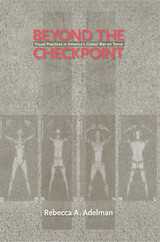 Beyond the Checkpoint: Visual Practices in America's Global War on Terror
Rebecca A. Adelman
University of Massachusetts Press, 2014 Since the 9/11 attacks on U.S. soil, American citizenship has been redefined by the visual images associated with the Global War on Terror (GWOT). Rebecca A. Adelman contends that, in viewing images such as security footage of the 9/11 hijackers, film portrayals of the attacks and subsequent wars, memorials commemorating the attacks, and even graphics associated with increased security in airports, American citizens have been recast as militarized spectators, brought together through the production, circulation, and consumption of these visual artifacts. Beyond the Checkpoint reveals that the visual is essential to the prosecution of the GWOT domestically and abroad, and that it functions as a crucial mechanism in the ongoing formation of the U.S. state itself and an essential component of contemporary American citizenship.
Tracing the connections between citizenship and spectatorship, and moving beyond the close reading of visual representations, this book focuses on the institutions and actors that create, monitor, and regulate the visual landscape of the GWOT. Adelman looks around and through common images to follow the complex patterns of practice by which institutions and audiences engage them in various contexts. In the process, she proposes a new methodology for studying visual cultures of conflict, and related phenomena like violence, terror, and suffering that are notoriously difficult to represent.
Attending to previously unanalyzed dimensions of this conflict, this book illustrates the complexity of GWOT visual culture and the variegated experiences of citizenship that result as Americans navigate this terrain.
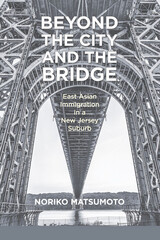 Beyond the City and the Bridge: East Asian Immigration in a New Jersey Suburb
Matsumoto, Noriko
Rutgers University Press, 2018 Winner of the New Jersey Studies Academic Alliance Author Award, Scholarly Non-fiction
Winner of the Richard P. McCormick Prize from the New Jersey Historical Association
Honorable Mention, 2019 American Sociological Association Book Award - Asia/Asian American Section
In recent decades, the American suburbs have become an important site for immigrant settlement. Beyond the City and the Bridge presents a case study of Fort Lee, Bergen County, on the west side of the George Washington Bridge connecting Manhattan and New Jersey. Since the 1970s, successive waves of immigrants from East Asia have transformed this formerly white community into one of the most diverse suburbs in the greater New York region. Fort Lee today has one of the largest concentrations of East Asians of any suburb on the East Coast, with Chinese, Japanese, and Koreans forming distinct communities while influencing the structure and everyday life of the borough. Noriko Matsumoto explores the rise of this multiethnic suburb—the complex processes of assimilation and reproduction of ethnicities, the changing social relationships, and the conditions under which such transformations have occurred.
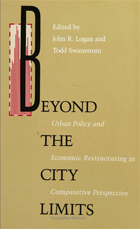 Beyond the City Limits: Urban Policy and Economics Restructuring in Comparative Perspective
edited by John R. Logan and Todd Swanstrom
Temple University Press, 1991 This book challenges the notion that there is a single, global process of economic restructuring to which cities must submit. The studies in this volume compare urban development in the United States, Western Europe, and Japan, demonstrating that there is significant variety in urban economic restructuring. The contributors emphasize that the economic forces transforming cities from industrial concentrations to postindustrial service centers do not exist apart from politics: all nation-states are heavily involved in the restructuring process. Contributors: Pierre Clavel, Susan Fainstein, Richard Child Hill, Nancy Kleniewski, Harvey L. Molotch, Michael Parkinson, Edmond Preteceille, Saskia Sassen, H. V. Savitch, John Walton, and the editors. In the series Conflicts in Urban and Regional Development, edited by John R. Logan and Todd Swanstrom.
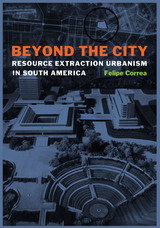 Beyond the City: Resource Extraction Urbanism in South America
By Felipe Correa
University of Texas Press, 2016 During the last decade, the South American continent has seen a strong push for transnational integration, initiated by the former Brazilian president Fernando Henrique Cardoso, who (with the endorsement of eleven other nations) spearheaded the Initiative for the Integration of Regional Infrastructure in South America (IIRSA), a comprehensive energy, transport, and communications network. The most aggressive transcontinental integration project ever planned for South America, the initiative systematically deploys ten east-west infrastructural corridors, enhancing economic development but raising important questions about the polarizing effect of pitting regional needs against the colossal processes of resource extraction. Providing much-needed historical contextualization to IIRSA’s agenda, Beyond the City ties together a series of spatial models and offers a survey of regional strategies in five case studies of often overlooked sites built outside the traditional South American urban constructs. Implementing the term “resource extraction urbanism,” the architect and urbanist Felipe Correa takes us from Brazil’s nineteenth-century regional capital city of Belo Horizonte to the experimental, circular, “temporary” city of Vila Piloto in Três Lagoas. In Chile, he surveys the mining town of María Elena. In Venezuela, he explores petrochemical encampments at Judibana and El Tablazo, as well as new industrial frontiers at Ciudad Guayana. The result is both a cautionary tale, bringing to light a history of societies that were “inscribed” and administered, and a perceptive examination of the agency of architecture and urban planning in shaping South American lives.
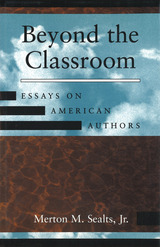 Beyond the Classroom: Essays on American Authors
Merton M. Sealts, Jr.
University of Missouri Press, 1996
Merton M. Sealts, Jr., a long-respected scholar and teacher of Emerson and Melville, has written, "I shall never tire of such writers, nor absorb all that they have to teach." This new collection of Sealts's essays reflects his many years of classroom experience and ongoing scholarship since his retirement in 1982. Most of these essays were originally delivered as public lectures before diverse audiences beyond the classroom; others first appeared in study pamphlets and as chapters of books.
These lucid essays, though varied in subject, have the commonality of an emphasis on teaching. The first essay, entitled "Emerson as Teacher," demonstrates how Emerson "provoked and inspired and educated his students--and his students' students."
In the most recently written essays Sealts deals with four of Emerson's contemporaries--Whitman, Thoreau, Hawthorne, and Melville--who responded variously to Emerson's teachings. A common thread among these four essays is each author's distinctive use of first-person narration.
Teachers of literature at every level will greatly benefit from these highly readable discussions, which illustrate practical strategies for reading and teaching literary works. Included in the appendixes are questions for the study of Melville's Bartleby, Benito Cereno, and Billy Budd, Sailor, which are also treated in individual essays.
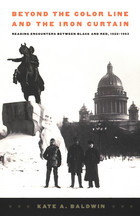 Beyond the Color Line and the Iron Curtain: Reading Encounters between Black and Red, 1922-1963
Kate A. Baldwin
Duke University Press, 2002 Examining the significant influence of the Soviet Union on the work of four major African American authors—and on twentieth-century American debates about race—Beyond the Color Line and the Iron Curtain remaps black modernism, revealing the importance of the Soviet experience in the formation of a black transnationalism.
Langston Hughes, W. E. B. Du Bois, Claude McKay, and Paul Robeson each lived or traveled extensively in the Soviet Union between the 1920s and the 1960s, and each reflected on Communism and Soviet life in works that have been largely unavailable, overlooked, or understudied. Kate A. Baldwin takes up these writings, as well as considerable material from Soviet sources—including articles in Pravda and Ogonek, political cartoons, Russian translations of unpublished manuscripts now lost, and mistranslations of major texts—to consider how these writers influenced and were influenced by both Soviet and American culture. Her work demonstrates how the construction of a new Soviet citizen attracted African Americans to the Soviet Union, where they could explore a national identity putatively free of class, gender, and racial biases. While Hughes and McKay later renounced their affiliations with the Soviet Union, Baldwin shows how, in different ways, both Hughes and McKay, as well as Du Bois and Robeson, used their encounters with the U. S. S. R. and Soviet models to rethink the exclusionary practices of citizenship and national belonging in the United States, and to move toward an internationalism that was a dynamic mix of antiracism, anticolonialism, social democracy, and international socialism.
Recovering what Baldwin terms the "Soviet archive of Black America," this book forces a rereading of some of the most important African American writers and of the transnational circuits of black modernism.
 Beyond the Crises: The Pontificate of Benedict XVI
Regoli
St. Augustine's Press, 2023 "I have felt like Saint Peter with the Apostles in the boat on the Sea of Galilee: the Lord has given us so many days of sun and of light winds, days when the catch was abundant; there were also moments when the waters were rough and the winds against us, as throughout the Church’s history, and the Lord seemed to be sleeping. But I have always known that the Lord is in that boat, and I have always known that the barque of the Church is not mine but his. Nor does the Lord let it sink; it is he who guides it, surely also through those whom he has chosen, because he so wished. This has been, and is, a certainty which nothing can shake."
––Benedict XVI, General Audience, 27 February 2013
Roberto Regoli offers a keen and comprehensive preview of Pope Benedict XVI's pontificate, which will be better understood only after time has passed and more becomes available. As an historian, Regoli provides ample context to frame the theology and pastoral priorities of a pope, professor, priest, and figure of history who has been shaped by his times, and who will undoubtedly be remembered as deeply orienting the Church toward the future. The perspective and questions offered by Regoli will likewise be a key component to the scholarship surrounding Pope Benedict's pontificate for decades to come, and he significantly broadens what has already been compiled by Anglophone writers.
Beyond the Dance Floor: Female DJs, Technology and Electronic Dance Music Culture
Rebekah Farrugia
Intellect Books, 2012 A pathbreaking study of the women who create electronic dance music, Beyond the Dance Floor focuses on the largely neglected relationship between these women and the conceptions of gender and technology that continue to inform the male-dominated culture surrounding electronic music. In this volume, Rebekah Farrugia explores a number of important issues, including the politics of identity and representation, the bonds formed by women within the DJ community, and the role female DJs and producers play in this dance music culture as well as in the larger public sphere. Though Farrugia primarily focuses on women’s relationship to music-related technologies—including vinyl, mp3s, and digital production software—she also deftly extends her argument to the strategic use of the Internet and web design skills for purposes tied to publicity, networking, and music distribution.
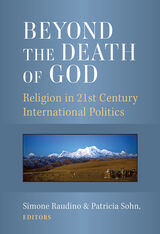 Beyond the Death of God: Religion in 21st Century International Politics
Simone Raudino and Patricia Sohn, Editors
University of Michigan Press, 2022 This volume offers a nuanced picture with specific instances of religion and politics in Muslim, Jewish, Christian, Buddhist, and Hindu contexts, broadly presenting the phenomenon of religion and politics via country and thematic case studies. Qualitative, quantitative, material, philosophical, and theological analyses draw upon social theory to show how (and why) religion matters deeply in each time and place.
The authors and contributors demonstrate that religion is a significant force that drives societies and polities around the world, and that a radical change in the Western understanding of value-driven global politics is needed. Beyond the Death of God offers new, local voices to Western audiences—through essays that suggest the need for an appreciation of Divinity as a quintessence holding a significant place in the hearts, minds, social orders, and political organization of polities around the world.
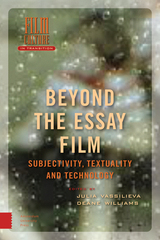 Beyond the Essay Film: Subjectivity, Textuality and Technology
Julia Vassilieva
Amsterdam University Press, 2020 In the wake of the explosion in the production of essay films over the last 25 years and its subsequent theorization in scholarly literature, this volume seeks to historicize these intertwined developments within the ‘long durée’ of the 20th century and into the 21st. By raising the issue of ‘beyond the essay film’, this collection seeks not only to acknowledge the influential predecessors of this — in the view of many critics, the most interesting type of contemporary filmmaking — but also to speculate about its possible transformation as we move forward into the uncharted waters of the 21st — digital — century. Beyond the Essay Film focusses on three specific axes that underpin and shape the articulation of the essay film as a specific cultural form — subjectivity, textuality, and technology — to explore how changes along and across these dimensions affect historical shifts within the essay-film practice and its relation to other types of cinema and neighbouring art forms.
 Beyond the Ethical Demand
K. E. Logstrup
University of Notre Dame Press, 2007
The Danish theologian-philosopher K. E. Løgstrup is second in reputation in his homeland only to Søren Kierkegaard. He is best known outside Europe for his The Ethical Demand, first published in Danish in 1956 and published in an expanded English translation in 1997.
Beyond the Ethical Demand contains excerpts, translated into English for the first time, from the numerous books and essays Løgstrup continued to write throughout his life. In the first essay, he engages the critical response to The Ethical Demand, clarifying, elaborating, or defending his original positions. In the next three essays, he extends his contention that human ethics “demands” that we are concerned for the other by introducing the crucial concept of “sovereign expressions of life.” Like Levinas, Løgstrup saw in the phenomenon of “the other” the ground for his ethics. In his later works he developed this concept of “the sovereign expressions of life,” spontaneous phenomena such as trust, mercy, and sincerity that are inherently other-regarding. The last two essays connect his ethics with political life.
Interest in Løgstrup in the English-speaking academic community continues to grow, and these important original sources will be essential tools for scholars exploring the further implications of his ethics and phenomenology.
“K. E. Løgstrup’s work undoubtedly made in his time an original contribution to the field of moral philosophy and philosophy of religion. This translation makes extracts from his later publications on moral philosophy accessible to an English-speaking audience. I am again impressed by the depth of his ideas, which are certainly not outdated and still relevant for contemporary debates in moral philosophy.” —Bert Musschenga, Vrije Universiteit, Amsterdam
“Making a large part of Knud Løgstrup’s legacy accessible to the English-speaking public is an event of enormous cultural, philosophical and political importance—and we are all in debt to his disciple, Kies van Kooten Niekerk, and the University Press of Notre Dame, for making it happen. Løgstrup, alongside few other giants of 20th Century ethical thought, like Emmanuel Levinas or Hans Jonas, anticipated and articulated all the major challenges and urgent tasks with which the coming century is likely to confront the moral self. Our ethical discourse was all the poorer so far for being barred access to his findings and proposition. This will no longer be the case.” —Zygmunt Bauman, emeritus, University of Leeds
“The publication of an English translation of Knut Eljert Løgstrup's later works in ethics provides a wider readership with the opportunity to better understand his important contribution to ethics in the second half of the last century. With his notion of the Sovereign Expressions of Life Løgstrup articulates his rejection of moral atomism that has become influential in recent times. The introduction and annotation by Kees van Kooten Niekerk are very helpful to see how Løgstrup's thought developed beyond The Ethical Demand.” —Hans S. Reinders, Vrije Universiteit, Amsterdam
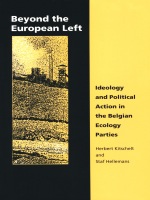 Beyond the European Left: Ideology and Political Action in the Belgian Ecology
Herbert Kitschelt and Staf Hellemans
Duke University Press, 1990 Drawing on recent research on the internal politics of the Belgian ecology parties, Agalev and Ecolo, this work demonstrates how political careers in contemporary social movements lead to activism in left-libertarian politics and influence political ideology. Beyond the European Left is the first comprehensive survey of ecology parties in Europe that presents detailed empirical information on the careers, organizational practices, and political beliefs of the activists involved.
The authors employ a new research methodology—surveying party militants—that is better adapted to the study of micropolitics than are expert interviews. Herbert Kitschelt and Staf Hallemans show that European Green party activists express an egalitarian and libertarian vision of a desirable social order that builds on, but radically transforms, ideas of the traditional socialist European left. The authors then examine the debates and disagreements among militants on political objectives and the consequences of conflicting views for party organization and strategy. Their findings illuminate the unique dynamics of left-libertarian politics in a number of Western European countries with obvious relevance to current developments in Eastern Europe.
 Beyond the Field: How Soccer Built Community in the United States
Brian D. Bunk
University of Illinois Press, 2025 Played by both migrants and native-born Americans, soccer created communities across the United States. Brian D. Bunk ranges from Pawtucket to Honolulu as he illuminates the deep and diverse origins of the American sport. Soccer took root as immigration, urbanization, and industrialization triggered immense changes across society. Matches built local pride as teams battled rival neighborhoods and towns. Teammates and supporters shared meals, raised money for fallen players, and attended each other’s weddings and funerals. If sometimes damaged by economic depression or shattered by war, clubs often bounced back to provide a steadying, resilient force in their towns. Bunk follows the story from the 1880s through World War I by profiling the struggles and joys of players while also tracing the overlooked impact of people of African, Chinese, Hawaiian, Jewish, and Filipino descent on American soccer culture. Engaging and rich in detail, Beyond the Field draws on extensive original research to expand our idea of the people and places that formed the American game.
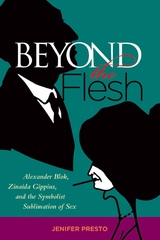 Beyond the Flesh: Alexander Blok, Zinaida Gippius, and the Symbolist Sublimation of Sex
Jenifer Presto
University of Wisconsin Press, 2008 Though the Russian Symbolist movement was dominated by a concern with transcending sex, many of the writers associated with the movement exhibited an intense preoccupation with matters of the flesh. Drawing on poetry, plays, short stories, essays, memoirs, and letters, as well as feminist and psychoanalytic theory, Beyond the Flesh documents the often unexpected form that this obsession with gender and the body took in the life and art of two of the most important Russian Symbolists. Jenifer Presto argues that the difficulties encountered in reading Alexander Blok and Zinaida Gippius within either a feminist or a traditional, binary gendered framework derive not only from the peculiarities of their creative personalities but also from the specific Russian cultural context. Although these two poets engaged in gendered practices that, at times, appeared to be highly idiosyncratic and even incited gossip among their contemporaries, they were not operating in a vacuum. Instead, they were responding to philosophical concepts that were central to Russian Symbolism and that would continue to shape modernism in Russia.
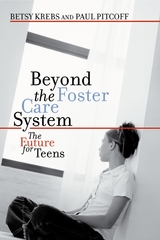 Beyond The Foster Care System: The Future for Teens
Betsy Krebs
Rutgers University Press, 2006
Each year tens of thousands of teenagers are released from the foster care system in the United States without high school degrees or strong family relationships. Two to four years after discharge, half of these young people still do not have either a high school diploma or equivalency degree, and fewer than ten percent enter college. Nearly a third end up on public assistance within fifteen months, and eventually more than a third will be arrested or convicted of a crime.
In this richly detailed and often surprising exploration of the foster care system, Betsy Krebs and Paul Pitcoff argue that the existing structure sets kids up to fail by inadequately preparing them for adult life. Foster care programs traditionally emphasize goals of reuniting children with family or placing children into adoptive homes. But neither of these outcomes is likely for adolescents. Krebs and Pitcoff contend that the primary goal of foster care for teenagers should be rigorous preparation for a fully productive adult life and that the standard life skills curriculum is woefully inadequate for this purpose.
The authors, who together cofounded the Youth Advocacy Center in New York City, draw on their fifteen years of experience working with teens and the foster care system to introduce new ways to teach teens to be responsible for themselves and to identify and develop their potential. They also explore what sorts of resources-legal, financial, and human-will need to come from inside and outside the system to more fully humanize the practice of foster care. Ultimately, Krebs and Pitcoff argue that change must involve the participation of caring communities of volunteers who want to see disadvantaged youth succeed as well as developing methods to empower teens to take control of their lives.
Bringing together a series of inspiring, real-life accounts, Beyond the Foster Care System introduces readers to a number of dynamic young people who have participated in the Youth Advocacy Center's programs and who have gone on to apply these lessons to other areas of life. Their stories demonstrate that more successful alternatives to the standard way of providing foster care are not only imaginable, but possible. With the practical improvements Krebs and Pitcoff outline, teens can learn the skills of effective self-advocacy, become better prepared for the transition to full independence, and avoid becoming the statistics that foster care has so often produced in the past.
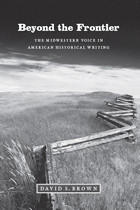 Beyond the Frontier: The Midwestern Voice in American Historical Writing
David S. Brown
University of Chicago Press, 2009 As the world went to war in 1941, Time magazine founder Henry Luce coined a term for what was rapidly becoming the establishment view of America’s role in the world: the twentieth century, he argued, was the American Century. Many of the nation’s most eminent historians—nearly all of them from the East Coast—agreed with this vision and its endorsement of the vigorous use of power and persuasion to direct world affairs. But an important concentration of midwestern historians actively dissented. With Beyond the Frontier, David S. Brown tells their little-known story of opposition. Raised in a cultural landscape that combined agrarian provincialism with reform-minded progressivism, these historians—among them Charles Beard, William Appleman Williams, and Christopher Lasch—argued strenuously against the imperial presidencies, interventionist foreign policies, and Keynesian capitalism that swiftly shaped cold war America. Casting a skeptical eye on the burgeoning military-industrial complex and its domestic counterpart, the welfare state, they warned that both components of the liberal internationalist vision jeopardized the individualistic, republican ethos that had long lain at the heart of American democracy. Drawing on interviews, personal papers, and correspondence of the imoprtant players in the debate, Brown has written a fascinating follow-up to his critically acclaimed biography of Richard Hofstadter. Illuminating key ideas that link midwestern writers from Frederick Jackson Turner all the way to William Cronon and Thomas Frank, Beyond the Frontier is intellectual history at its best: grounded in real lives and focused on issues that remain salient—and unresolved—even today.
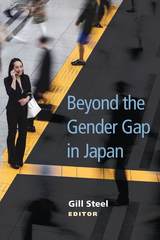 Beyond the Gender Gap in Japan
Gill Steel, Editor
University of Michigan Press, 2019 Why do Japanese women enjoy a high sense of well-being in a context of high inequality? Beyond the Gender Gap in Japan brings together researchers from across the social sciences to investigate this question. The authors analyze women’s values and the lived experiences at home, in the family, at work, in their leisure time, as volunteers, and in politics and policy-making. Their research shows that the state and firms have blurred “the public” and “the private” in postwar Japan, constraining individuals’ lives, and reveals the uneven pace of change in women’s representation in politics. Yet, despite these constraints, the increasing diversification in how people live and how they manage their lives demonstrates that some people are crafting a variety of individual solutions to structural problems. Covering a significant breadth of material, the book presents comprehensive findings that use a variety of research methods—public opinion surveys, in-depth interviews, a life history, and participant observation—and, in doing so, look beyond Japan’s perennially low rankings in gender equality indices to demonstrate the diversity underneath, questioning some of the stereotypical assumptions about women in Japan.
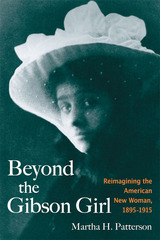 Beyond the Gibson Girl: Reimagining the American New Woman, 1895-1915
Martha H. Patterson
University of Illinois Press, 2005 Challenging monolithic images of the New Woman as white, well-educated, and politically progressive, this study focuses on important regional, ethnic, and sociopolitical differences in the use of the New Woman trope at the turn of the twentieth century. Using Charles Dana Gibson's "Gibson Girls" as a point of departure, Martha H. Patterson explores how writers such as Pauline Hopkins, Margaret Murray Washington, Sui Sin Far, Mary Johnston, Edith Wharton, Ellen Glasgow, and Willa Cather challenged and redeployed the New Woman image in light of other “new” conceptions: the "New Negro Woman," the "New Ethics," the "New South," and the "New China." As she appears in these writers' works, the New Woman both promises and threatens to effect sociopolitical change as a consumer, an instigator of evolutionary and economic development, and (for writers of color) an icon of successful assimilation into dominant Anglo-American culture. Examining a diverse array of cultural products, Patterson shows how the seemingly celebratory term of the New Woman becomes a trope not only of progressive reform, consumer power, transgressive femininity, modern energy, and modern cure, but also of racial and ethnic taxonomies, social Darwinist struggle, imperialist ambition, assimilationist pressures, and modern decay.
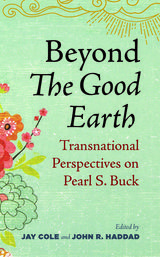 Beyond The Good Earth: Transnational Perspectives on Pearl S. Buck
Jay Cole
West Virginia University Press, 2019 How well do we really know Pearl S. Buck? Many think of Buck solely as the Nobel laureate and Pulitzer Prize–winning author of The Good Earth, the novel that explained China to Americans in the 1930s. But Buck was more than a novelist and interpreter of China. As the essays in Beyond The Good Earth show, she possessed other passions and projects, some of which are just now coming into focus. Who knew, for example, that Buck imagined and helped define multiculturalism long before it became a widely known concept? Or that she founded an adoption agency to locate homes for biracial children from Asia? Indeed, few are aware that she advocated successfully for a genocide convention after World War II and was ahead of her time in envisioning a place for human rights in American foreign policy. Buck’s literary works, often dismissed as simple portrayals of Chinese life, carried a surprising degree of innovation as she experimented with the styles and strategies of modernist artists. In Beyond The Good Earth, scholars and writers from the United States and China explore these and other often overlooked topics from the life of Pearl S. Buck, positioning her career in the context of recent scholarship on transnational humanitarian activism, women’s rights activism, and civil rights activism.
 Beyond the Great Story: History as Text and Discourse
Robert F. Berkhofer Jr.
Harvard University Press, 1995 What legitimate form can history take when faced by the severe challenges issued in recent years by literary, rhetorical, multiculturalist, and feminist theories? That is the question considered in this long-awaited and pathbreaking book. Robert F. Berkhofer, Jr., addresses the essential practical concern of contemporary historians; he offers a way actually to go about reading and writing histories in light of the many contesting theories.
Berkhofer ranges through a vast archive of recent writings by a broad range of authors. He explicates the opposing paradigms and their corresponding dilemmas by presenting in dialogue form the positions of modernists and postmodernists, formalists and deconstructionists, textualists and contextualists. Poststructuralism, the New Historicism, the New Anthropology, the New Philosophy of History--these and many other approaches are illuminated in new ways in these comprehensive, interdisciplinary explorations.
From them, Berkhofer arrives at a clear vision of the forms historical discourse might take, advocates a new approach to historical criticism, and proposes new forms of historical representation that encompass multiculturalism, poetics, and reflexive (con)textualization. He elegantly blends traditional and new methodology; assesses what the "revival of the narrative" actually entails; considers the politics of disciplinary frameworks; and derives coherent new approaches to writing, teaching, reviewing, and reading histories.
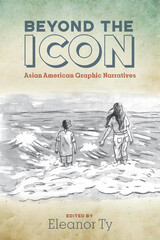 Beyond the Icon: Asian American Graphic Narratives
Edited by Eleanor Ty
Ohio State University Press, 2022 Winner, 2023 Comics Studies Society Edited Book Prize While most US-based comics studies anthologies tend to neglect race, Beyond the Icon brings it to the foreground through an analysis of the vibrant and growing body of graphic narratives by Asian North American creators in the twenty-first century. By demonstrating how the forms and styles of the comics genre help depict Asian Americans as nuanced individuals in ways that words alone may not, Beyond the Icon makes the case for comics as a crucial artistic form in Asian American cultural production––one used to counter misrepresentations and myths, rewrite official history, and de-exoticize the Asian American experience. An interdisciplinary team of contributors offers exciting new readings of key texts, including Ms. Marvel, George Takei’s They Called Us Enemy, Thi Bui’s The Best We Could Do, Gene Luen Yang and Sonny Liew’s The Shadow Hero, works by Adrian Tomine and Jillian Tamaki, and more, to uncover the ways in which Asian American comics authors employ graphic narratives to provide full and complex depictions of Asian diasporic subjects and intervene in the wider North American consciousness. Beyond the Icon initiates vital conversations between Asian American studies, ethnic studies, and comics. Contributors: Monica Chiu, Shilpa Davé, Melinda Luisa de Jesús, Lan Dong, Jin Lee, erin Khuê Ninh, Stella Oh, Jeanette Roan, Eleanor Ty
 Beyond the Inquisition: Ambrogio Catarino Politi and the Origins of the Counter-Reformation
Giorgio Caravale
University of Notre Dame Press, 2017 In Beyond the Inquisition, originally published in an Italian edition in 2007, Giorgio Caravale offers a fresh perspective on sixteenth-century Italian religious history and the religious crisis that swept across Europe during that period. Through an intellectual biography of Ambrogio Catarino Politi (1484–1553), Caravale rethinks the problems resulting from the diffusion of Protestant doctrines in Renaissance Italy and the Catholic opposition to their advance. At the same time, Caravale calls for a new conception of the Counter-Reformation, demonstrating that during the first half of the sixteenth century there were many alternatives to the inquisitorial model that ultimately prevailed.
Lancellotto Politi, the jurist from Siena who entered the Dominican order in 1517 under the name of Ambrogio Catarino, started his career as an anti-Lutheran controversialist, shared friendships with the Italian Spirituals, and was frequently in conflict with his own order. The main stages of his career are all illustrated with a rich array of previously published and unpublished documentation. Caravale's thorough analysis of Politi's works, actions, and relationships significantly alters the traditional image of an intransigent heretic hunter and an author of fierce anti-Lutheran tirades. In the same way, the reconstruction of his role as a papal theologian and as a bishop in the first phase of the Council and the reinterpretation of his battle against the Spanish theologian Domingo de Soto and scholasticism reestablish the image of a Counter-Reformation that was different from the one that triumphed in Trent, the image of an alternative that was viable but never came close to being implemented.
Giorgio Caravale is professor of early modern European history at the University of Roma Tre. He is the author of a number of books, including Forbidden Prayer: Church Censorship and Devotional Literature in Renaissance Italy.
Beyond the Iron Rice Bowl: Regimes of Production and Industrial Relations in China
Boy Lüthje, Siqi Luo, and Hao Zhang
Campus Verlag, 2013 A unique account of labor relations in the modern Chinese economy, Beyond the Iron Rice Bowl brings together more than thirty in-depth case studies of key multinational, Chinese, and overseas Chinese enterprises in the automotive, electronic, and garment industries. Analyzing the regimes of production and their segmentations in the context of global and national production networks, the authors discuss Chinese and international industrial relations theory and labor sociology and explore the perspectives of collective bargaining, trade union reform, and democratic workplace representation in China.
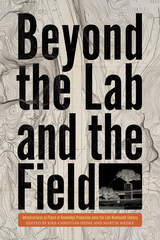 Beyond the Lab and the Field: Infrastructures as Places of Knowledge Production Since the Late Nineteenth Century
Eike-Christian Heine and Martin Meiske
University of Pittsburgh Press, 2020 Beyond the Lab and the Field analyzes infrastructures as intense sites of knowledge production in the Americas, Europe, and Asia since the late nineteenth century. Moving beyond classical places known for yielding scientific knowledge, chapters in this volume explore how the construction and maintenance of canals, highways, dams, irrigation schemes, the oil industry, and logistic networks intersected with the creation of know-how and expertise. Referred to by the authors as “scientific bonanzas,” such intersections reveal opportunities for great wealth, but also distress and misfortune.
This volume explores how innovative technologies provided research opportunities for scientists and engineers, as they relied on expertise to operate, which resulted in enormous profits for some. But, like the history of any gold rush, the history of infrastructure also reveals how technologies of modernity transformed nature, disrupting communities and destroying the local environment. Focusing not on the victory march of science and technology but on ambivalent change, contributors consider the role of infrastructures for ecology, geology, archaeology, soil science, engineering, ethnography, heritage, and polar exploration. Together, they also examine largely overlooked perspectives on modernity: the reliance of infrastructure on knowledge, and infrastructures as places and occasions that inspired a greater understanding of the natural world and the technologically made environment.
Beyond the Laboratory: Scientists as Political Activists in 1930s America
Peter J. Kuznick
University of Chicago Press, 1987 The debate over scientists' social responsibility is a topic of great controversy today. Peter J. Kuznick here traces the origin of that debate to the 1930s and places it in a context that forces a reevaluation of the relationship between science and politics in twentieth-century America. Kuznick reveals how an influential segment of the American scientific community during the Depression era underwent a profound transformation in its social values and political beliefs, replacing a once-pervasive conservatism and antipathy to political involvement with a new ethic of social reform.
Beyond the Laboratory: Scientists as Political Activists in 1930s America
Peter J. Kuznick
University of Chicago Press, 1987 The debate over scientists' social responsibility is a topic of great controversy today. Peter J. Kuznick here traces the origin of that debate to the 1930s and places it in a context that forces a reevaluation of the relationship between science and politics in twentieth-century America. Kuznick reveals how an influential segment of the American scientific community during the Depression era underwent a profound transformation in its social values and political beliefs, replacing a once-pervasive conservatism and antipathy to political involvement with a new ethic of social reform.
Beyond the Land Itself: Views of Nature in Canada and the United States
Marcia B. Kline
Harvard University Press, 1970 Marcia Kline's work, which inaugurates a new series of student essays sponsored by the Committee on Degrees in History and Literature, utilizes illustrations from both fictional and nonfictional writing of the mid-nineteenth century to contrast the views of nature held in the United States and Canada during that period. Her conclusions note that while Americans romanticized their West, Canadians responded in terror to the natural world.
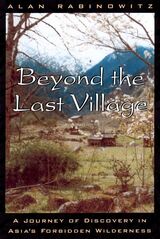 Beyond the Last Village: A Journey Of Discovery In Asia's Forbidden Wilderness
Alan Rabinowitz
Island Press, 2001 In 1993, Alan Rabinowitz, called "the Indiana Jones" of wildlife science by The New York Times, arrived for the first time in the country of Myanmar, known until 1989 as Burma, uncertain of what to expect. Working under the auspices of the Wildlife Conservation Society, his goal was to establish a wildlife research and conservation program and to survey the country's wildlife. He succeeded beyond all expectations, not only discovering a species of primitive deer completely new to science but also playing a vital role in the creation of Hkakabo Razi National Park, now one of Southeast Asia's largest protected areas. Beyond the Last Village takes the reader on a journey of exploration, danger, and discovery in this remote corner of the planet at the southeast edge of the Himalayas where tropical rain forest and snow-covered mountains meet. As we travel through this "lost world" -- a mysterious and forbidding region isolated by ancient geologic forces -- we meet the Rawang, a former slave group, the Taron, a solitary enclave of the world's only pygmies of Asian ancestry, and Myanmar Tibetans living in the furthest reaches of the mountains. We enter the territories of strange, majestic-looking beasts that few people have ever heard of and fewer have ever seen -- golden takin, red goral, blue sheep, black barking deer. The survival of these ancient species is now threatened, not by natural forces but by hunters with snares and crossbows, trading body parts for basic household necessities. The powerful landscape and unique people the author befriends help him come to grips with the traumas and difficulties of his past and emerge a man ready to embrace the world anew. Interwoven with his scientific expedition in Myanmar, and helping to inform his understanding of the people he met and the situations he encountered, is this more personal journey of discovery.
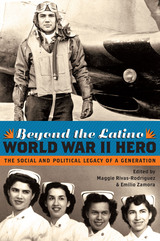 Beyond the Latino World War II Hero: The Social and Political Legacy of a Generation
Edited by Maggie Rivas-Rodríguez and Emilio Zamora
University of Texas Press, 2009 Maggie Rivas-Rodríguez 's edited volume Mexican Americans & World War II brought pivotal stories from the shadows, contributing to the growing acknowledgment of Mexican American patriotism as a meaningful force within the Greatest Generation. In this latest anthology, Rivas-Rodríguez and historian Emilio Zamora team up with scholars from various disciplines to add new insights. Beyond the Latino World War II Hero focuses on home-front issues and government relations, delving into new arenas of research and incorporating stirring oral histories. These recollections highlight realities such as post-traumatic stress disorder and its effects on veterans' families, as well as Mexican American women of this era, whose fighting spirit inspired their daughters to participate in Chicana/o activism of the 1960s and 1970s. Other topics include the importance of radio as a powerful medium during the war and postwar periods, the participation of Mexican nationals in World War II, and intergovernmental negotiations involving Mexico and Puerto Rico. Addressing the complexity of the Latino war experience, such as the tandem between the frontline and the disruption of the agricultural migrant stream on the home front, the authors and contributors unite diverse perspectives to harness the rich resources of an invaluable oral history.
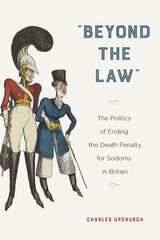 "Beyond the Law": The Politics of Ending the Death Penalty for Sodomy in Britain
Charles Upchurch
Temple University Press, 2021 In nineteenth-century England, sodomy was punishable by death; even an accusation could damage a man’s reputation for life. The last executions for this private, consensual act were in 1835, but the effort to change the law that allowed for those executions was intense and precarious, and not successful until 1861. In this groundbreaking book, “Beyond the Law,” noted historian Charles Upchurch pieces together fragments from history and uses a queer history methodology to recount the untold story of the political process through which the law allowing for the death penalty for sodomy was almost ended in 1841. Upchurch recounts the legal and political efforts of reformers like Jeremy Bentham and Lord John Russell—the latter of whom argued that the death penalty for sodomy was “beyond the law and above the law.” He also reveals that a same-sex relationship linked the families of the two men responsible for co-sponsoring the key legislation. By recovering the various ethical, religious, and humanitarian arguments against punishing sodomy, “Beyond the Law” overturns longstanding assumptions of nineteenth-century British history. Upchurch demonstrates that social change came from an amalgam of reformist momentum, family affection, elitist politics, class privilege, enlightenment philosophy, and personal desires.
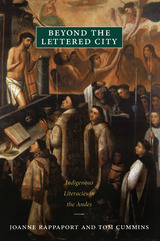 Beyond the Lettered City: Indigenous Literacies in the Andes
Joanne Rappaport and Tom Cummins
Duke University Press, 2012 In Beyond the Lettered City, the anthropologist Joanne Rappaport and the art historian Tom Cummins examine the colonial imposition of alphabetic and visual literacy on indigenous groups in the northern Andes. They consider how the Andean peoples received, maintained, and subverted the conventions of Spanish literacy, often combining them with their own traditions. Indigenous Andean communities neither used narrative pictorial representation nor had alphabetic or hieroglyphic literacy before the arrival of the Spaniards. To absorb the conventions of Spanish literacy, they had to engage with European symbolic systems. Doing so altered their worldviews and everyday lives, making alphabetic and visual literacy prime tools of colonial domination. Rappaport and Cummins advocate a broad understanding of literacy, including not only reading and writing, but also interpretations of the spoken word, paintings, wax seals, gestures, and urban design. By analyzing secular and religious notarial manuals and dictionaries, urban architecture, religious images, catechisms and sermons, and the vast corpus of administrative documents produced by the colonial authorities and indigenous scribes, they expand Ángel Rama’s concept of the lettered city to encompass many of those who previously would have been considered the least literate.
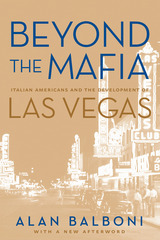 Beyond The Mafia: Italian Americans And The Development Of Las Vegas
Alan Balboni
University of Nevada Press, 2006 When Beyond the Mafia first appeared in 1996 it was hailed as a significant contribution to the history of Las Vegas and of ethnic minorities in America. Author Alan Balboni traces the history of Italians in Las Vegas from the founding of the city in 1905, recording their activities in the fledgling settlement. As Las Vegas grew, Italian Americans participated in every aspect of the city’s society and economy, including construction, retail establishments, hotels, and—after the statewide legalization of gambling in 1931—the casino industry. Basing his research on well over a hundred interviews, as well as the records of Italian American organizations, public agencies, and other sources, Balboni has produced a sparkling and thoroughly documented account of the history of one of Las Vegas’s most progressive and productive ethnic minorities. This new paperback edition includes an afterword by the author that brings the story of Las Vegas’s Italian Americans up to the present.
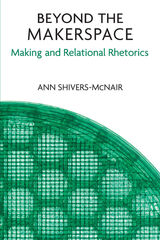 Beyond the Makerspace: Making and Relational Rhetorics
Ann Shivers-McNair
University of Michigan Press, 2021 Makerspaces—local workshops that offer access to and training on fabrication technologies, often with a focus on creativity, education, and entrepreneurship—proliferated in the 2010s, popping up in cities across the world. Beyond the Makerspace is a longitudinal, ethnographically informed study of a particular Seattle makerspace that begins in 2015 and ends with the closing of the space in 2018. Examining acts of making with objects, tools, words, and relationships, Beyond the Makerspace reads making as a kind of rhetoric, or meaning-making work, and argues that acts of making things are rhetorical in the sense that they are culturally situated and that they mark boundaries of what counts as making and who counts as maker. By focusing on a particular makerspace over time, Shivers-McNair attends to a changing cohort of makerspace regulars as they face challenges of bringing their vision of inclusivity and diversity to fruition, and offers an examination of how makers are made (and unmade, and remade) in a makerspace.
Beyond the Makerspace contributes not only to our understanding of making and makerspaces, but also to our understanding of how to study making—and meaning making, more broadly—in ways that examine and intervene in the marking of difference. Thus, the book examines what (and whose) values and practices we are taking up when we identify as makers or when we turn a writing classroom or a library space into a makerspace.
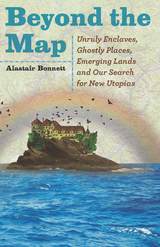 Beyond the Map: Unruly Enclaves, Ghostly Places, Emerging Lands and Our Search for New Utopias
Alastair Bonnett
University of Chicago Press, 2018 New islands are under construction or emerging because of climate change. Eccentric enclaves and fantastic utopian experiments are multiplying. Once-secret fantasy gardens are cracking open their doors to outsiders. Our world is becoming stranger by the day—and Alastair Bonnett observes and captures every fascinating change.
In Beyond the Map, Bonnett presents stories of the world’s most extraordinary spaces—many unmarked on any official map—all of which challenge our assumptions about what we know—or think we know—about our world. As cultural, religious and political boundaries ebb and flow with each passing day, traditional maps unravel and fragment. With the same adventurous spirit he effused in the acclaimed Unruly Places, Bonnett takes us to thirty-nine incredible spots around the globe to explore these changing boundaries and stimulate our geographical imagination. Some are tied to disruptive contemporary political turbulence, such as the rise of ISIL, Russia’s incursions into Ukraine and the Brexit vote in the United Kingdom. Others explore the secret places not shown on Google Earth or reflect fast-changing landscapes.
Beyond the Map journeys out into a world of mysterious, daunting and magical spaces. It is a world of hidden cultures and ghostly memories, of uncountable new islands and curious stabs at paradise. From the phantom tunnels of the Tokyo subway to a stunning movie-set re-creation of 1950s-era Moscow; from the caliphate of the Islamic State to virtual cybertopias—this book serves as an imaginative guide to the farthest fringes of geography.
 Beyond the Mask: Gordon Craig, Movement, and the Actor
Irene Eynat-Confino
Southern Illinois University Press, 1987 Eynat-Confino goes beyond the usual consideration of Craig’s purported theories of the actor, scenery, and the scene painter to get at the heart of Craig’s idea of theater. She draws not only on the research of contemporary Craig scholars but on material hitherto unavailable—his writings and daybooks and the writings of friends. She ties Craig’s encounter with Isadora Duncan to a decisive modification in his notion of movement. To have an instrument more controllable than the actor, he invented the über-marionette, a giant puppet. Craig also invented the “Scene,” a kinetic stage, the “screens” that brought him worldwide fame were simply an adaptation of this concept. Eynat-Confino argues that a scenario Craig wrote in 1905, here published for the first time, reveals a theosophical system like that of Blake, a system that was the main force motivating Craig’s artistic quest. In her final chapter, she carefully examines the psychological, aesthetic, and circumstantial factors that kept Craig from completing his work to bring “friendliness—humor—love—ease—peace” to the world.
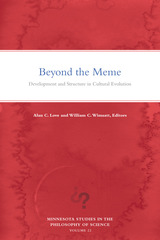 Beyond the Meme: Development and Structure in Cultural Evolution
Alan C. Love
University of Minnesota Press, 2019 Interdisciplinary perspectives on cultural evolution that reject meme theory in favor of a complex understanding of dynamic change over time
How do cultures change? In recent decades, the concept of the meme, posited as a basic unit of culture analogous to the gene, has been central to debates about cultural transformation. Despite the appeal of meme theory, its simplification of complex interactions and other inadequacies as an explanatory framework raise more questions about cultural evolution than it answers. In Beyond the Meme, William C. Wimsatt and Alan C. Love assemble interdisciplinary perspectives on cultural evolution, providing a nuanced understanding of it as a process in which dynamic structures interact on different scales of size and time. By focusing on the full range of evolutionary processes across distinct contexts, from rice farming to scientific reasoning, this volume demonstrates how a thick understanding of change in culture emerges from multiple disciplinary vantage points, each of which is required to understand cultural evolution in all its complexity. The editors provide an extensive introductory essay to contextualize the volume, and Wimsatt contributes a separate chapter that systematically organizes the conceptual geography of cultural processes and phenomena. Any adequate account of the transmission, elaboration, and evolution of culture must, this volume argues, recognize the central roles that cognitive and social development play in cultural change and the complex interplay of technological, organizational, and institutional structures needed to enable and coordinate these processes. Contributors: Marshall Abrams, U of Alabama at Birmingham; Claes Andersson, Chalmers U of Technology; Mark A. Bedau, Reed College; James A. Evans, U of Chicago; Jacob G. Foster, U of California, Los Angeles; Michel Janssen, U of Minnesota; Sabina Leonelli, U of Exeter; Massimo Maiocchi, U of Chicago; Joseph D. Martin, U of Cambridge; Salikoko S. Mufwene, U of Chicago; Nancy J. Nersessian, Georgia Institute of Technology and Harvard U; Paul E. Smaldino, U of California, Merced; Anton Törnberg, U of Gothenburg; Petter Törnberg, U of Amsterdam; Gilbert B. Tostevin, U of Minnesota.
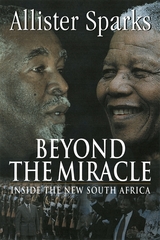 Beyond the Miracle: Inside the New South Africa
Allister Sparks
University of Chicago Press, 2003 In Beyond the Miracle, a distinguished South African journalist provides a wide-ranging and unflinching account of the first nine years of democratic government in South Africa. Covering both the new regime's proud achievements and its disappointing failures, Allister Sparks looks to South Africa's future, asking whether it can overcome its history and current global trends to create a truly nonracial, multicultural, and multiparty democracy. Sparks sees South Africa as facing many of the same challenges as the rest of the world, especially a widening gap between rich and poor, exacerbated by the forces of globalization. While the transition government has done much to establish democracy and racial equality in a short time, as well as bring basic services such as clean water to millions who did not have them before, many blacks feel it has not done enough to redress the continuing imbalance of wealth in the country. Many whites, meanwhile, feel disempowered and confused about what role they have to play as a racial minority in a country they used to rule and regard as theirs by divine right. Sparks also covers other burning issues, such as the HIV/AIDS epidemic, high crime rates, the diamond wars, the Congo conflict, and the Zimbabwean land crisis. Writing vividly and often quite movingly, Sparks draws on his decades of journalistic experience and his recent insider access to key figures in the liberation government to take stock of where South Africa has been, where it's going, and why the rest of the world should not turn away from this country where the First and Third Worlds meet. As Sparks persuasively argues, the success of Mandela's vision of a peaceful "rainbow nation" is crucial not just for the salvation of Africa, but also for the world. “Sparks, a grandfather of South African journalism, has fired one of the first volleys in the 10-year assessment. . . . It is an even-handed work, almost encyclopedic in its breadth. Sparks traverses all the important political terrain.”—Mail & Guardian
“It is as good a guide to the new South Africa as any.”—Economist
 Beyond the Moment: Connecting Histories of Latinx Performance and Resistance
Irene Mata
University of Texas Press, 2026 Exploring cultural resistance by creating and archiving Latinx performance art Performance is often seen as ephemeral, a condition that seemingly reduces its activist possibilities. After all, not everyone can take part or bear witness. Beyond the Moment shows how Latinx artists have responded with a theater of dissent that endures—performance art that also documents and can itself be archived, creating opportunities for sustained solidarity and resistance. Through close readings of works such as Coco Fusco’s multi-genre performance A Field Guide for Female Interrogators, Irene Mata theorizes what she calls “textual mentoring.” This method involves tracing previous moments of resistance, archiving the creative process itself, and transforming the performance into a pedagogical tool. By means of textual mentoring, a work like The Panza Monologues becomes a lesson in confronting systemic oppression through collaborative storytelling. Mata also shows how the 2012 No Papers, No Fear Ride for Justice, a multi-state immigrant-rights action, relies on a vocabulary of refusal of movements of the past—like the Freedom Rides of the Civil Rights era—and continues its activism beyond its immediate performance context by digitally archiving its process. With an emphasis on intersectional critique, Beyond the Moment positions performance as a radical form of resistance that educates and inspires across generations and movements.
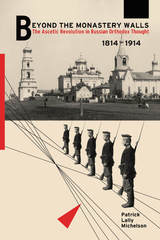 Beyond the Monastery Walls: The Ascetic Revolution in Russian Orthodox Thought, 1814–1914
Patrick Lally Michelson
University of Wisconsin Press, 2017 During Russia's late imperial period, Orthodox churchmen, professionally trained theologians, and an array of social commentators sought to give meaning to Russian history and its supposed backwardness. Many found that meaning in asceticism. For some, ascetic religiosity prevented Russia from achieving its historical destiny. For others, it was the means by which the Russian people would realize the kingdom of God, thereby saving Holy Russia and the world from the satanic forces of the West.
Patrick Lally Michelson's intellectual history of asceticism in Russian Orthodox thought traces the development of these competing arguments from the early nineteenth century to the early months of World War I. He demonstrates that this discourse was an imaginative interpretation of lived Orthodoxy, primarily meant to satisfy the ideological needs of Russian thinkers and Orthodox intellectuals as they responded to the socioeconomic, political, and cultural challenges of modernity.
Beyond the New Morality: The Responsibilities of Freedom, Third Edition
Germain Grisez
University of Notre Dame Press, 1988 In this third edition of the now standard classroom text, Grisez and Shaw retain the best elements of the earlier versions, including their clear, straightforward presentation and use of nontechnical language. Although the basic approach, content, and organization remain substantially the same, the new edition does develop and amend some aspects of the theory. For example, the community dimension of morality is brought out more clearly and the first principle of morality is now formulated more accurately in terms of willing in line with integral human fulfillment.
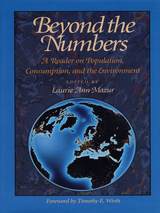 Beyond the Numbers: A Reader on Population, Consumption and the Environment
Edited by Laurie Ann Mazur; Foreword by Timothy Wirth
Island Press, 1994 Beyond the Numbers presents a thought-provoking series of essays by leading authorities on issues of population and consumption. The essays both define the poles of debate and explore common ground beyond the polarized rhetoric. Specific chapters consider each of the broad topics addressed at the International Conference on Population and Development held in September 1994 in Cairo, Egypt. The essays are supplemented by sidebars and short articles featuring more-impassioned voices that highlight issues of interest not fully explored in the overviews. As well as providing a sense of the difficulties involved in dealing with these issues, the essays make clear that constructive action is possible. Topics covered include: - the interrelationships between population, economic growth, consumption, and development
- the history of population and family planning efforts
- gender equality and the empowerment of women
- reproductive rights, reproductive health, family planning, health and mortality
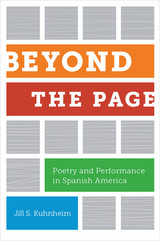 Beyond the Page: Poetry and Performance in Spanish America
Jill S. Kuhnheim
University of Arizona Press, 2014 Poetry began as a spoken art and remains one to this day, but readers tend to view the poem on the page as an impenetrable artifact. This book examines the performance of poetry to show how far beyond the page it can travel. Exploring a range of performances from early twentieth-century recitations to twenty-first-century film, CDs, and Internet renditions, Beyond the Page offers analytic tools to chart poetry beyond printed texts.
Jill S. Kuhnheim, looking at poetry and performance in Spanish America over time, has organized the book to begin with the early twentieth century and arrive at the present day. She includes noteworthy poets and artists such as José Martí, Luis Palés Matos, Eusebia Cosme, Nicomedes Santa Cruz, Pablo Neruda, César Vallejo, and Nicolás Guillén, as well as very recent artists whose performance work is not as well known. Offering fresh historical material and analysis, the author illuminates the relationship between popular and elite cultural activity in Spanish America and reshapes our awareness of the cultural work poetry has done in the past and may do in the future, particularly given the wide array of technological possibilities. The author takes a broad view of American cultural production and creates a dialogue with events and criticism from the United States as well as from Spanish American traditions.
Oral and written elements in poetry are complementary, says Kuhnheim, not in opposition, and they may reach different audiences. As poetry enjoys a revival with modern media, performance is part of the new platform it spans, widening the kind of audience and expanding potential meanings.
Beyond the Page will appeal to readers with an interest in poetry and performance, and in how poetry circulates beyond the page. With an international perspective and dynamic synthesis, the book offers an innovative methodology and theoretical model for humanists beyond the immediate field, reaching out to readers interested in the intersection between poetry and identity or the juncture of popular-elite and oral-written cultures.
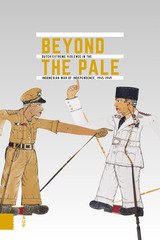 Beyond the Pale: Dutch Extreme Violence in the Indonesian War of Independence, 1945-1949
Kon. Inst. v. Taal-, Land- en Volkenkunde (KITLV)
Amsterdam University Press, 2022 On 17 August 1945, two days after the Japanese surrender that also brought an end to the Second World War in Asia, Indonesia declared its independence. The declaration was not recognized by the Netherlands, which resorted to force in its attempt to take control of the inevitable process of decolonization. This led to four years of difficult negotiations and bitter warfare.
In 2005, the Dutch government declared that the Netherlands should never have waged the war. The government’s 1969 position on the violence used by the Dutch armed forces during the war remained unchanged, however: although there had been ‘excesses’, on the whole the armed forces had behaved ‘correctly’. As the indications of Dutch extreme violence mounted, this official position proved increasingly difficult to maintain. In 2016, the Dutch government therefore decided to fund a broad study on the dynamics of the violence. The most important conclusions of that research programme are summarized in this book. The authors show that the Dutch armed forces used extreme violence on a structural basis, and that this was concealed both at the time and for many years after the war by the Dutch government and by society more broadly. All of this – like the entire colonial history – is at odds with the rose-tinted self-image of the Netherlands.
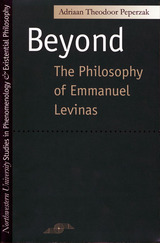 Beyond: The Philosophy of Emmanuel Levinas
Adriaan Theodoor Peperzak
Northwestern University Press, 1997 Although Emmanuel Levinas is widely respected as one of the classic thinkers of our century, the debate about his place within Continental philosophy continues. In Beyond: The Philosophy of Emmanuel Levinas, Adriaan Theodoor Peperzak shows Levinas's thought to be a persistent attempt to point beyond the borders of an economy where orderly interests and ways of reasoning make us feel at home--beyond the world of needs, beyond the self, beyond politics and administration, beyond logic and ontology, even beyond freedom and autonomy.
Peperzak's examination begins with a general overview of Levinas's life and thought, and shows how issues of ethics, politics, and religion are intertwined in Levinas's philosophy. Peperzak also discusses the development of Levinas's relations with Husserl and Heidegger, demonstrating thematically the evolution of both Levinas's anti-Heideggerian view of technology and his critical attitude toward nature.
Beyond the Public Sphere: Film and the Feminist Imaginary
María Pía Lara
Northwestern University Press, 2021 In Beyond the Public Sphere: Film and the Feminist Imaginary, the renowned philosopher and critical theorist María Pía Lara challenges the notion that the bourgeois public sphere is the most important informal institution between social and political actors and the state. Drawing on a wide range of films—including The Milk of Sorrow, Ixcanul, Wadja, The Stone of Patience, Marnie, A Streetcar Named Desire, and Talk to Her—Lara dissects cinematic images of women’s struggles and their oppression. She builds on this analysis, developing a concept of the feminist social imaginary as a broader and more complex space that provides a way of thinking through the possibilities for emancipatory social transformation in response to forms of domination perpetuated by patriarchal capitalism.
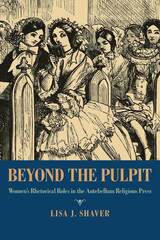 Beyond the Pulpit: Women’s Rhetorical Roles in the Antebellum Religious Press
Lisa J. Shaver
University of Pittsburgh Press, 2012
In the formative years of the Methodist Church in the United States, women played significant roles as proselytizers, organizers, lay ministers, and majority members. Although women’s participation helped the church to become the nation’s largest denomination by the mid-nineteenth century, their official roles diminished during that time. In Beyond the Pulpit, Lisa Shaver examines Methodist periodicals as a rhetorical space to which women turned to find, and make, self-meaning.
In 1818, Methodist Magazine first published “memoirs” that eulogized women as powerful witnesses for their faith on their deathbeds. As Shaver observes, it was only in death that a woman could achieve the status of minister. Another Methodist publication, the Christian Advocate, was America’s largest circulated weekly by the mid-1830s. It featured the “Ladies’ Department,” a column that reinforced the canon of women as dutiful wives, mothers, and household managers. Here, the church also affirmed women in the important rhetorical and evangelical role of domestic preacher. Outside the “Ladies Department,” women increasingly appeared in “little narratives” in which they were portrayed as models of piety and charity, benefactors, organizers, Sunday school administrators and teachers, missionaries, and ministers’ assistants. These texts cast women into nondomestic roles that were institutionally sanctioned and widely disseminated.
By 1841, the Ladies’ Repository and Gatherings of the West was engaging women in discussions of religion, politics, education, science, and a variety of intellectual debates. As Shaver posits, by providing a forum for women writers and readers, the church gave them an official rhetorical space and the license to define their own roles and spheres of influence. As such, the periodicals of the Methodist church became an important public venue in which women’s voices were heard and their identities explored.
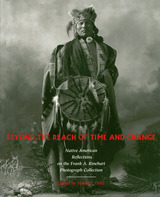 Beyond the Reach of Time and Change: Native American Reflections on the Frank A. Rinehart Photograph Collection
Edited by Simon J. Ortiz
University of Arizona Press, 2004 Around the turn of the twentieth century, most photographs of Indians pandered to shameless, insensitive stereotypes. In contrast, photographic portraits made by Frank A. Rinehart conveyed the dignity and pride of Native peoples. More than 545 Native Americans representing tribes from all over the country attended the Trans-Mississippi and International Exposition in Omaha in 1898 to be part of an event known as the Indian Congress. Rinehart, the exposition’s official photographer, and his assistant Adolph Muhr made more than 500 glass-plate negatives depicting Native Americans in their traditional dress, now housed at Haskell Indian Nations University and regarded as one of the best photographic documentations of Indian leaders from this era.
This book provides an unusual perspective on the Rinehart collection. It features one hundred outstanding images printed from the original negatives made by Rinehart and Muhr at the Congress and over the course of the next two years. It also includes 14 essays by modern Native American writers, artists, and educators—some of them descendants of the individuals photographed—reflecting on the place of these images in their heritage.
Beyond the Reach of Time and Change is not another coffee-table book of historical Indian photographs but rather a conversation between Indian people of a century ago and today. Just as the Rinehart collection offers today's Native Americans a unique connection to the past, this book offers all readers a positive understanding of continuity and endurance within the American Indian community.
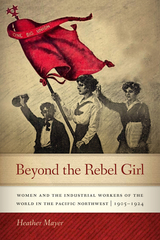 Beyond the Rebel Girl: Women and the Industrial Workers of the World in the Pacific Northwest, 1905-1924
Heather Mayer
Oregon State University Press, 2018 More than a century after their founding in 1905, the Industrial Workers of the World—or Wobblies as they are commonly known—remain a popular subject for study and discussion among students of labor history and social justice. They are often portrayed as lovable underdogs, with their songs and cartoons, generally irreverent attitude, and stalwart courage in the face of systemic persecution from vigilantes, law enforcement, and government officials.
In Beyond the Rebel Girl, historian Heather Mayer questions the well-worn vision of Wobblies as young, single, male, itinerant workers. While such workers formed a large portion of the membership, they weren’t the whole picture. In small towns across the Northwest, and in the larger cities of Seattle, Portland, and Spokane, women played an integral role in Wobbly life. Single women, but also families—husband and wife Wobbly teams—played important roles in some of the biggest fights for justice. IWW halls in these Northwest cities often functioned as community centers, with family-friendly events and entertainment.
Women were drawn to the IWW for its radical vision, inclusionary policies, birth control advocacy, and emphasis on freedom of choice in marriage. The IWW also offered women an avenue for activism that wasn’t focused primarily on the fight for suffrage. Beyond the Rebel Girl deepens our understanding of how the IWW functioned and how the union supported women in their fight for birth control, sexual emancipation, and better labor conditions, all while facing persecution at the local, state, and federal levels.
|
|
